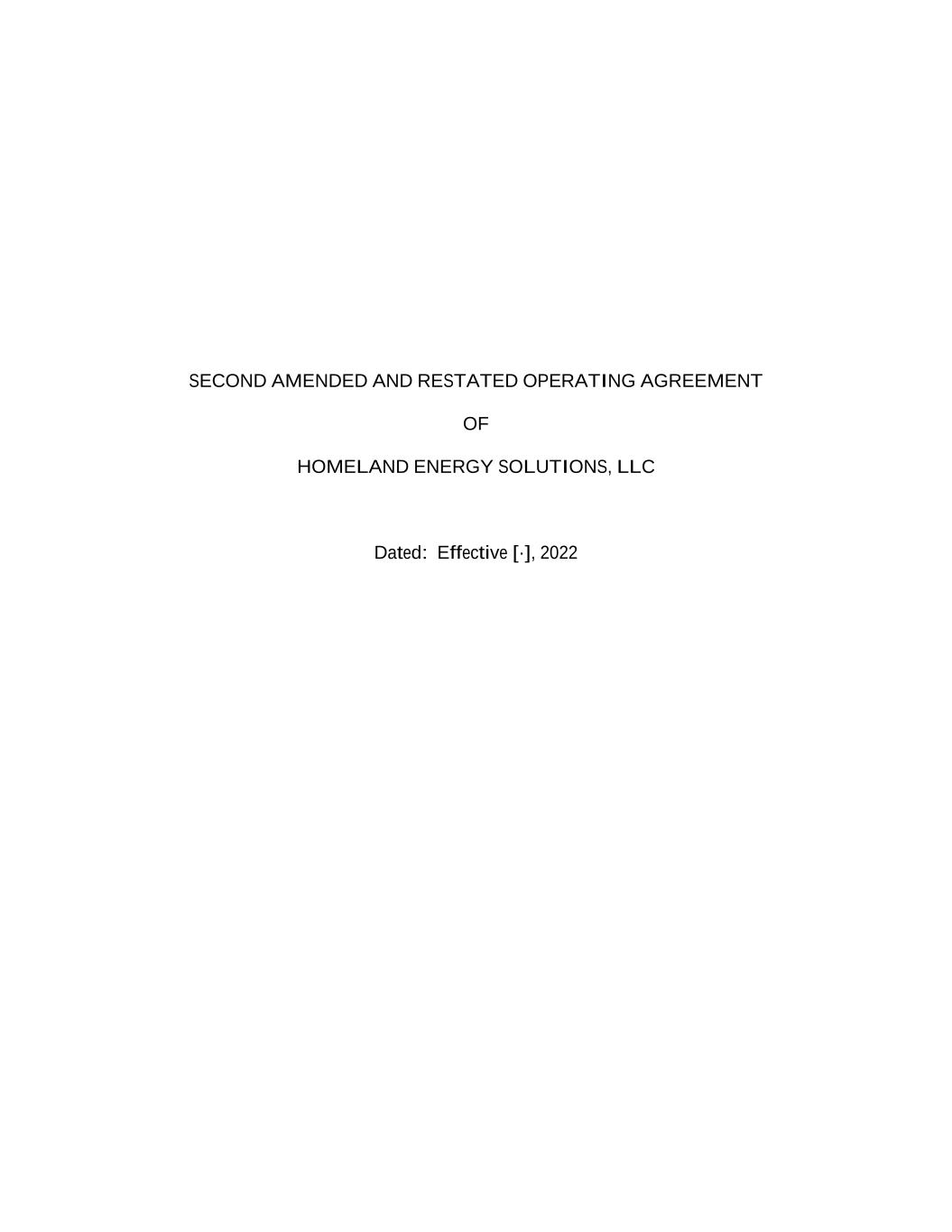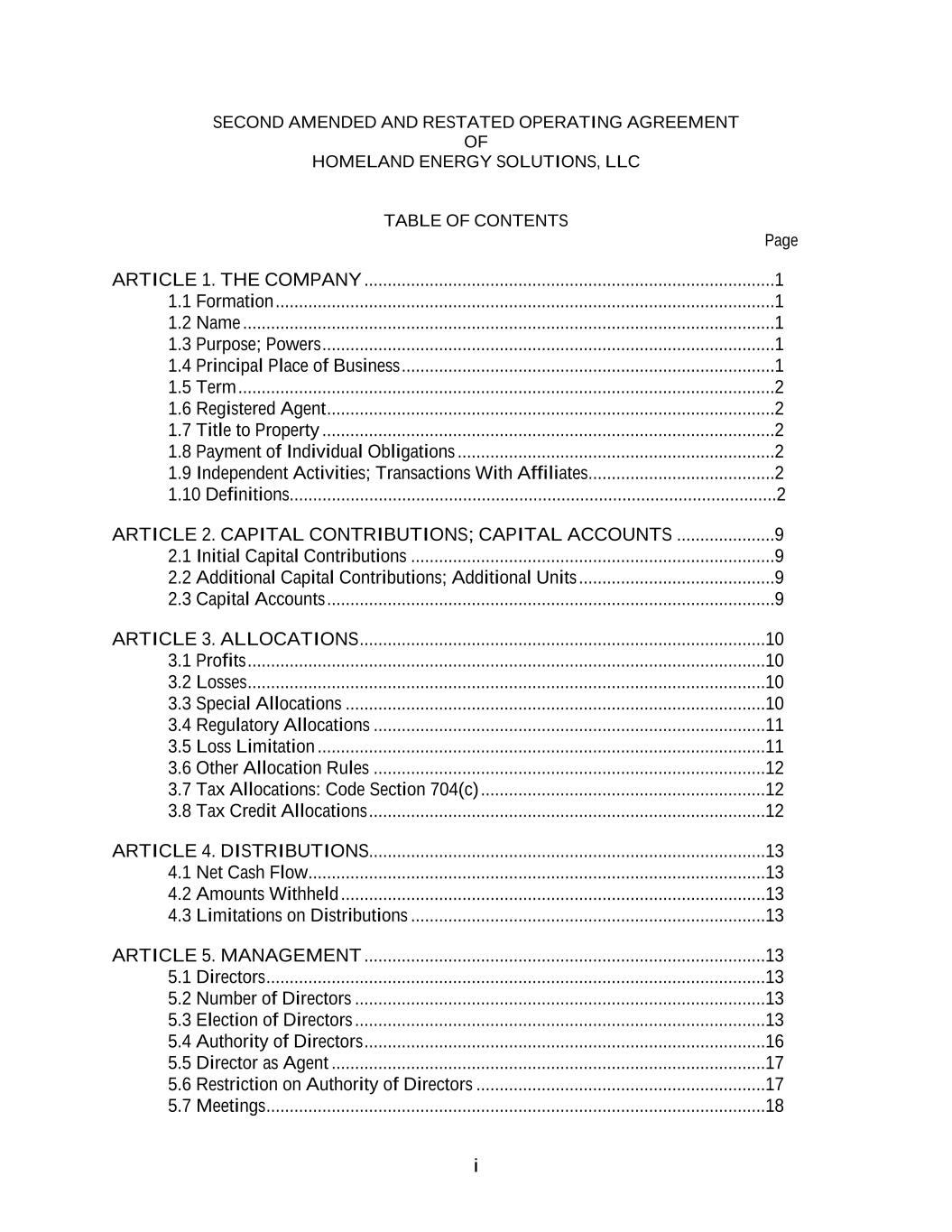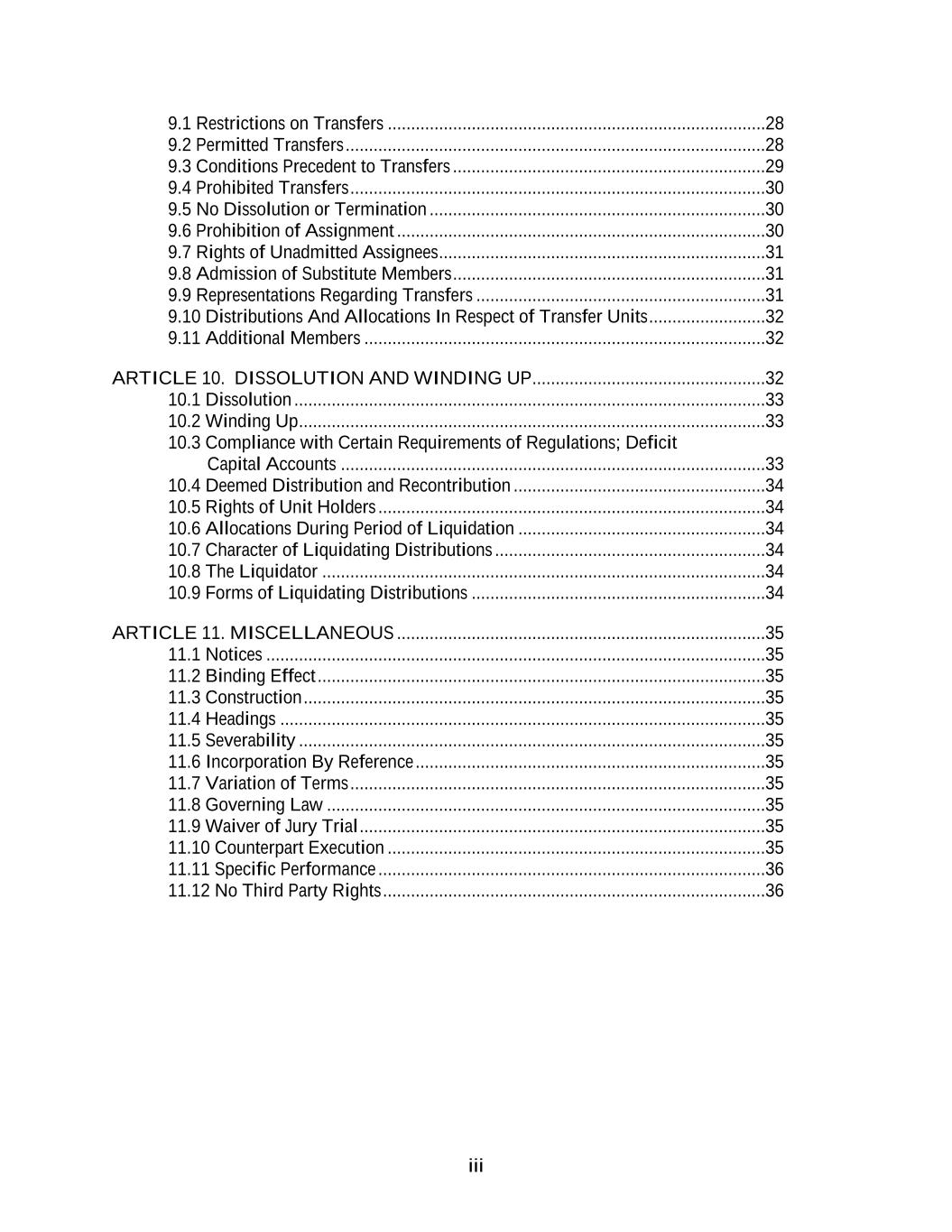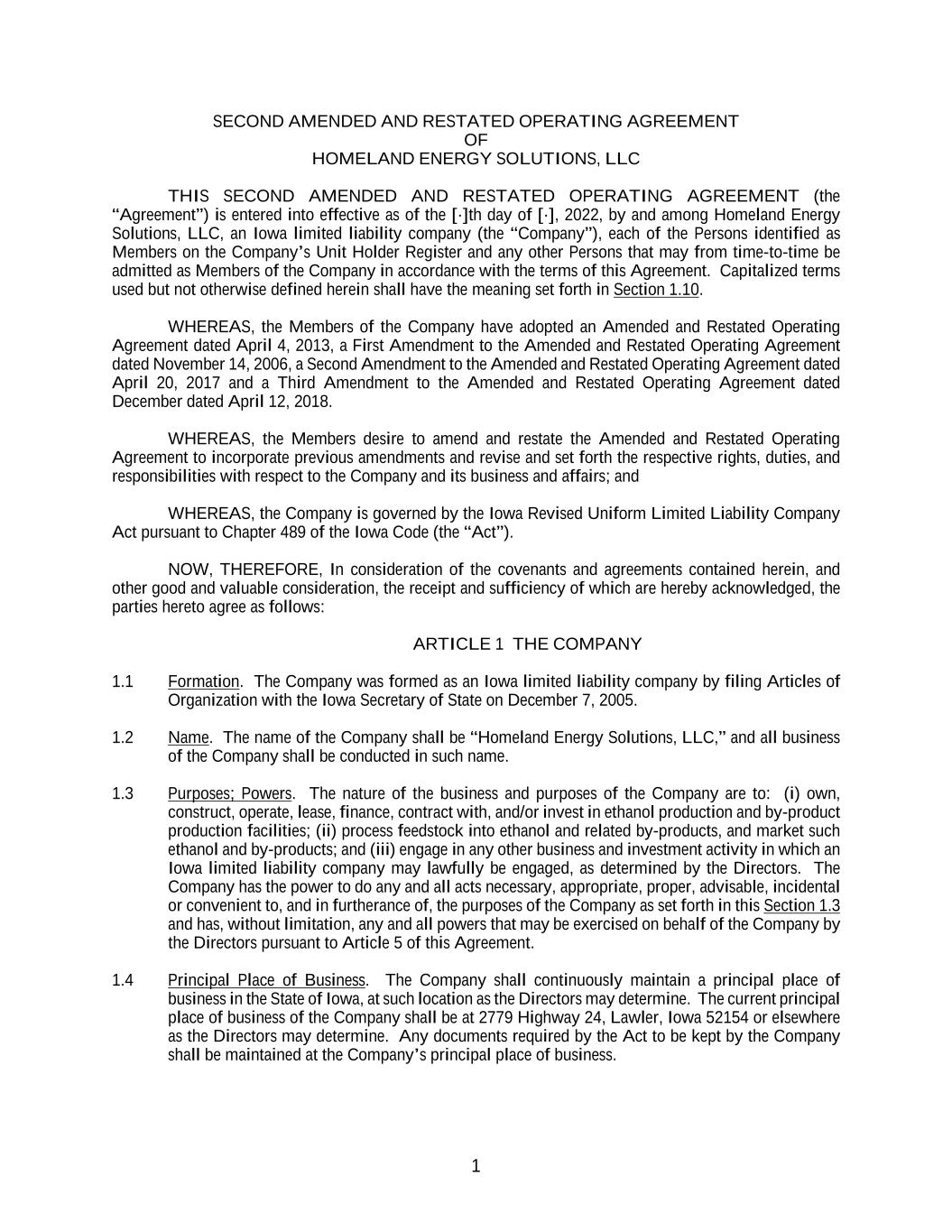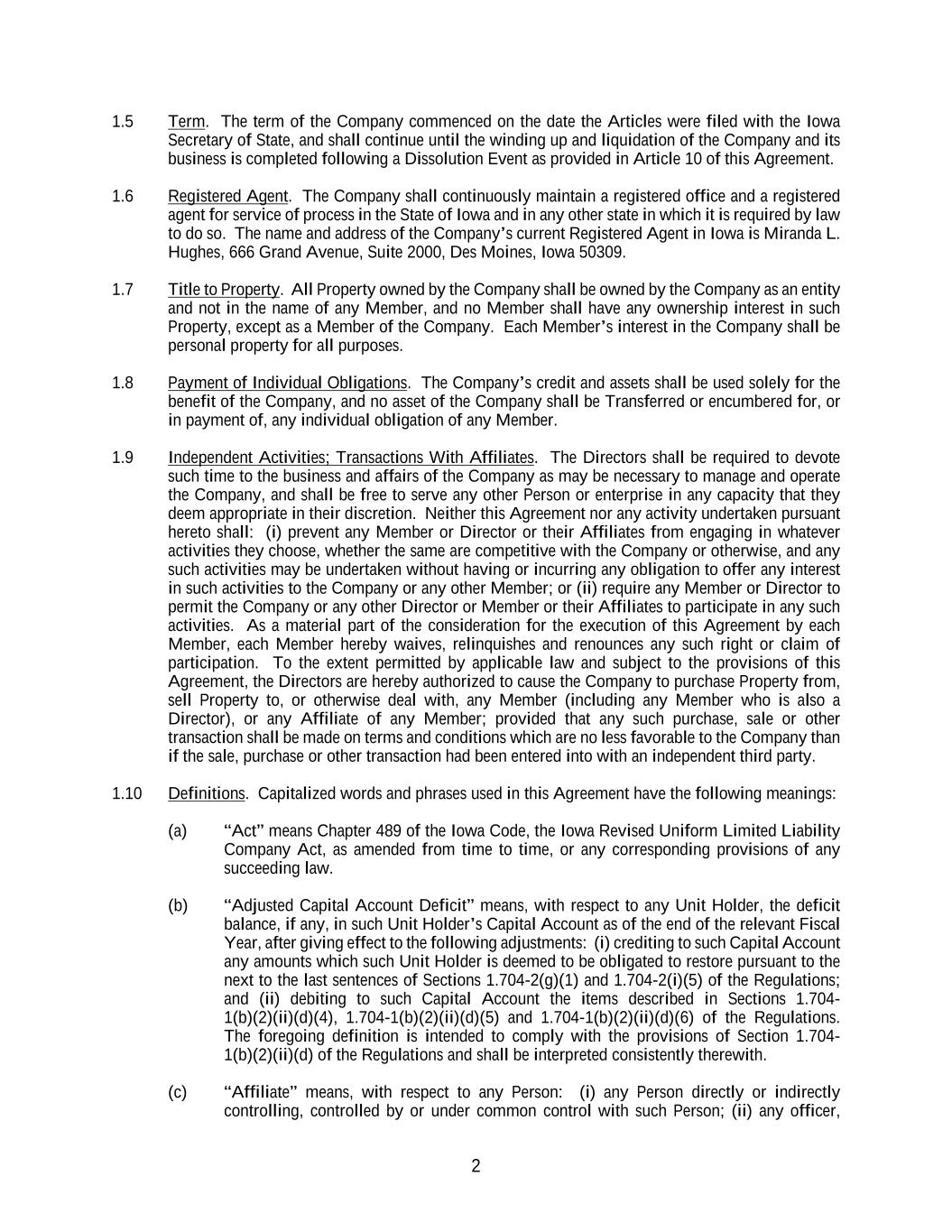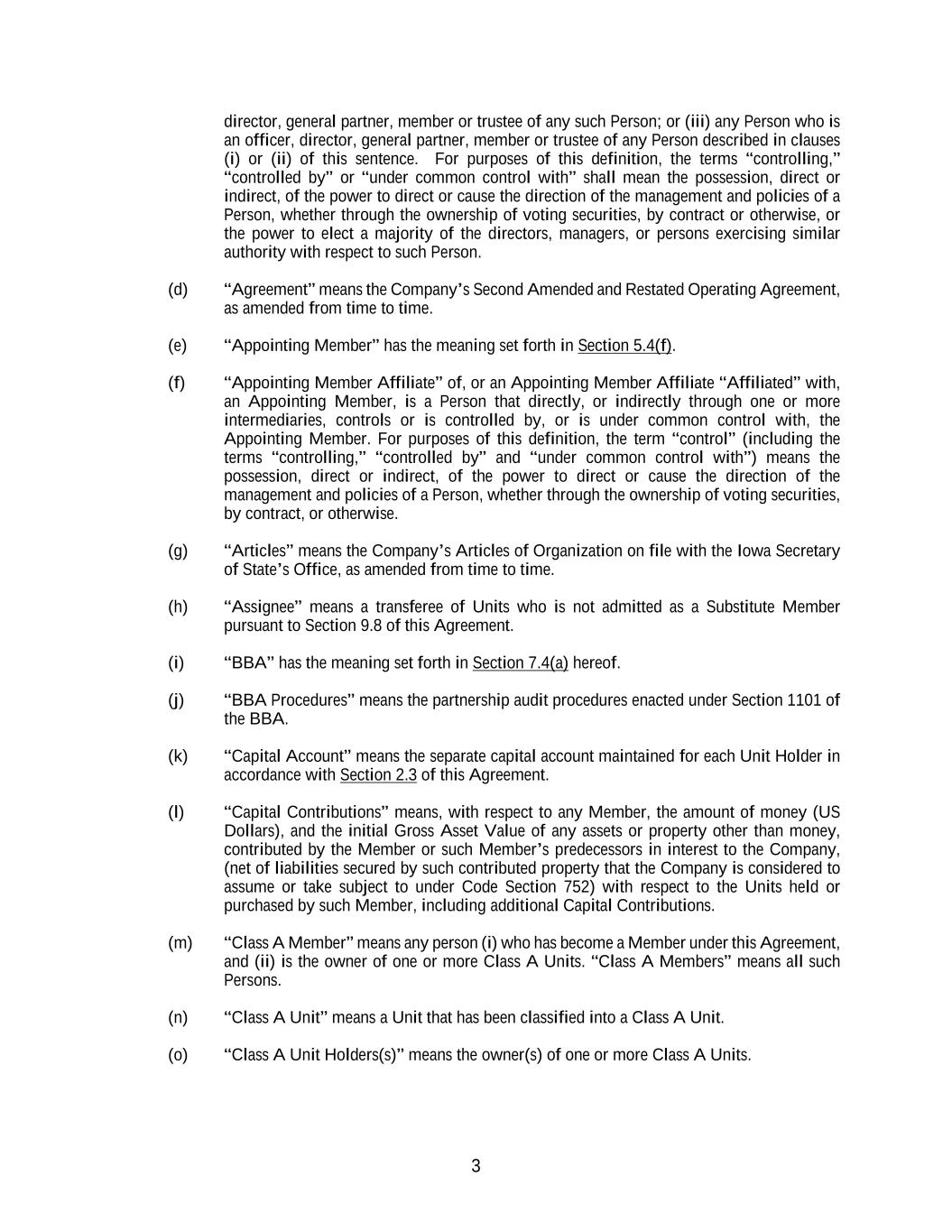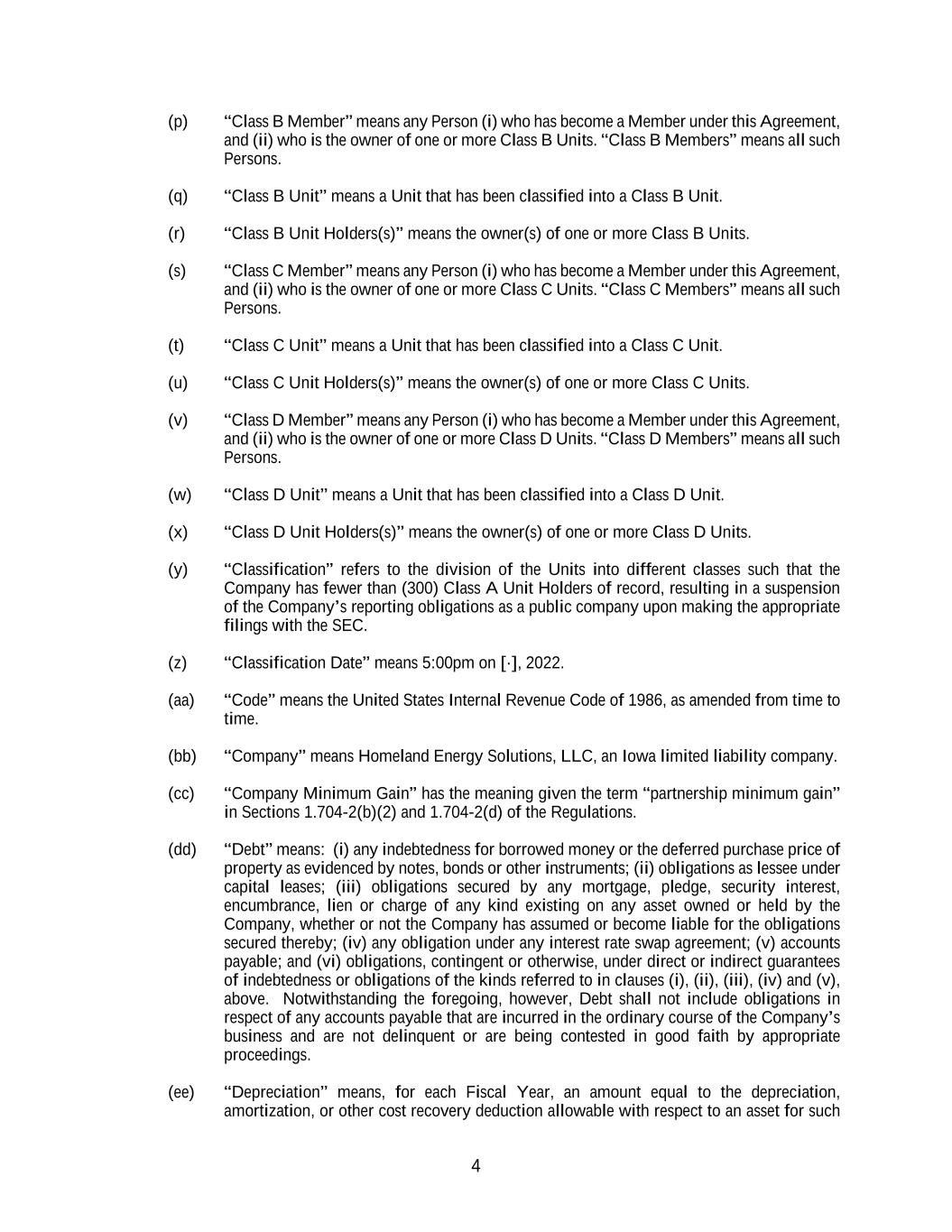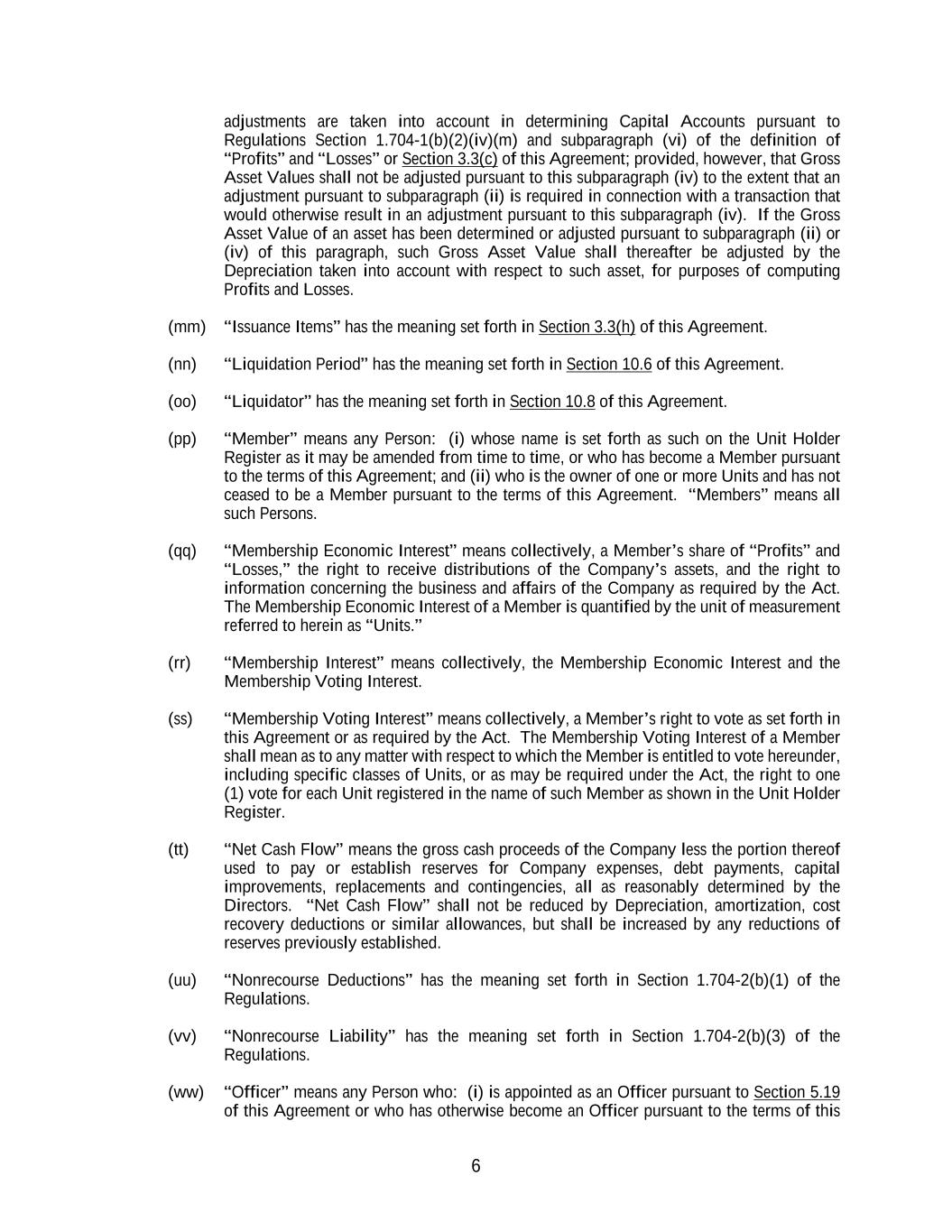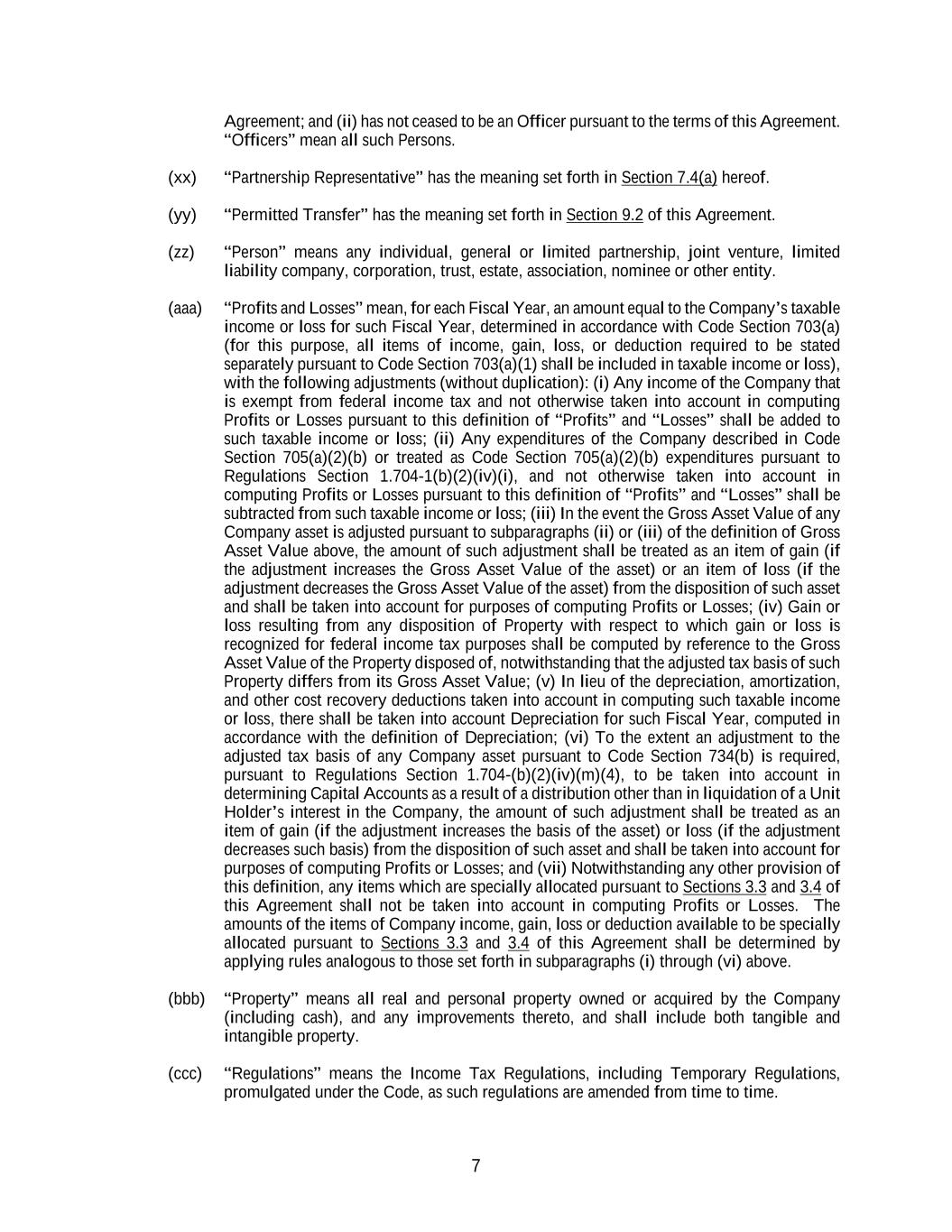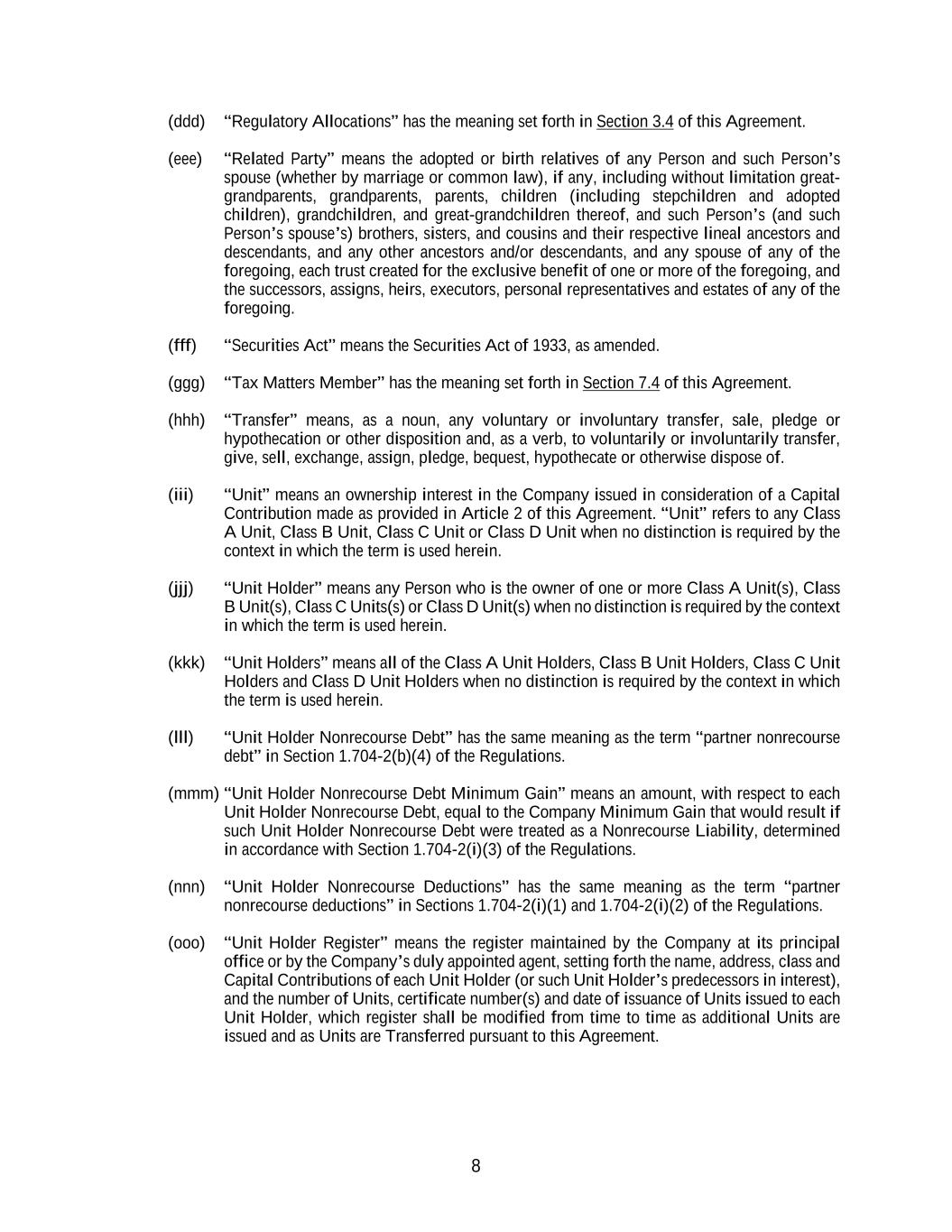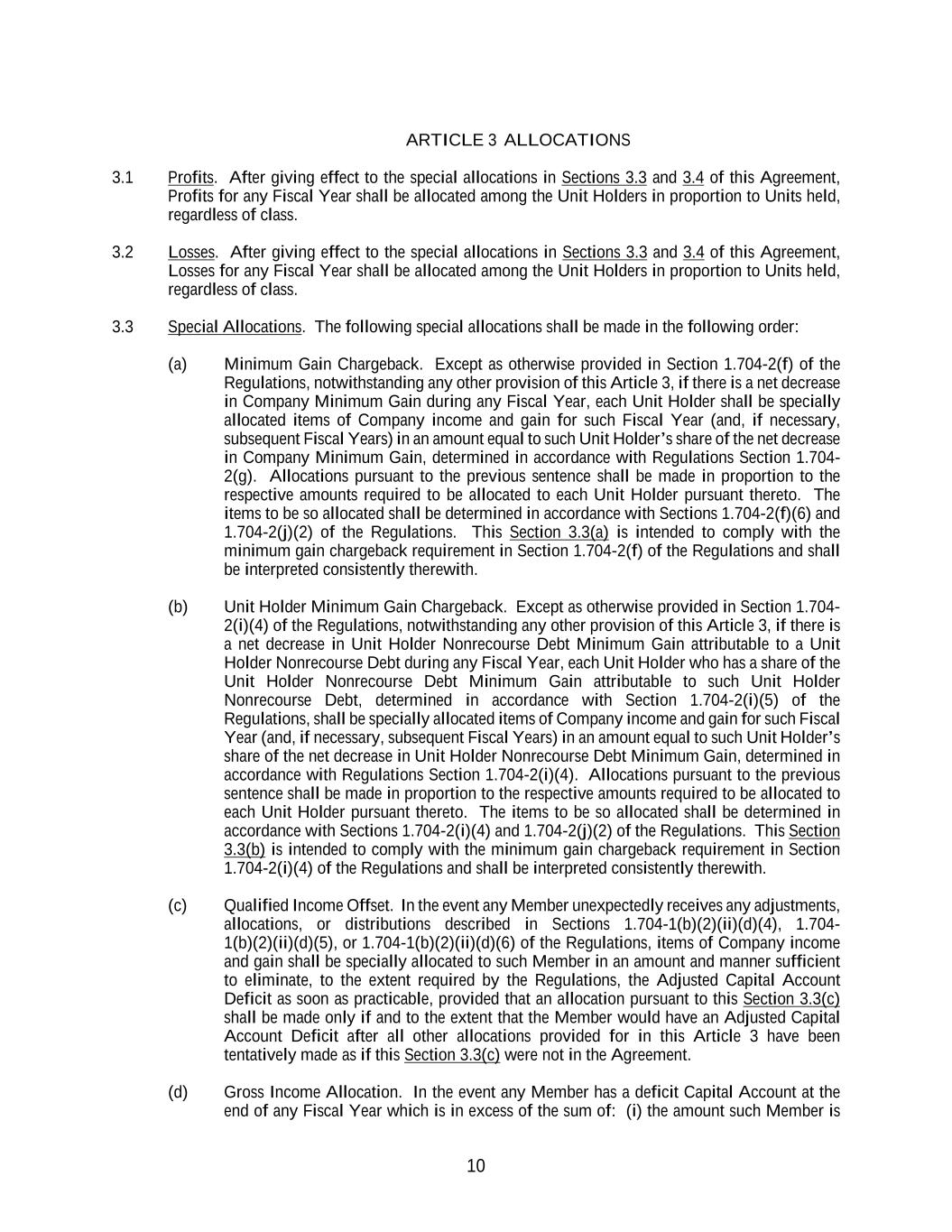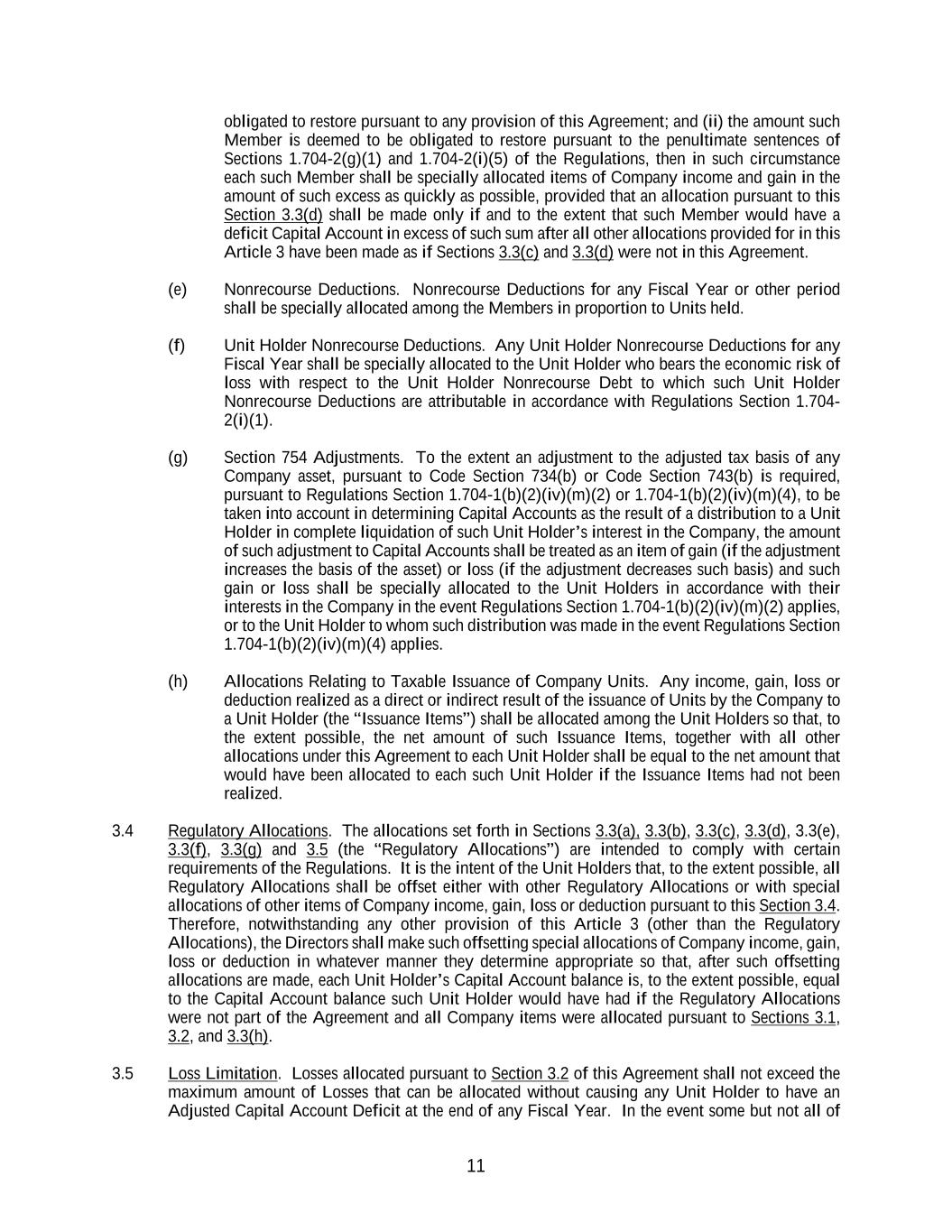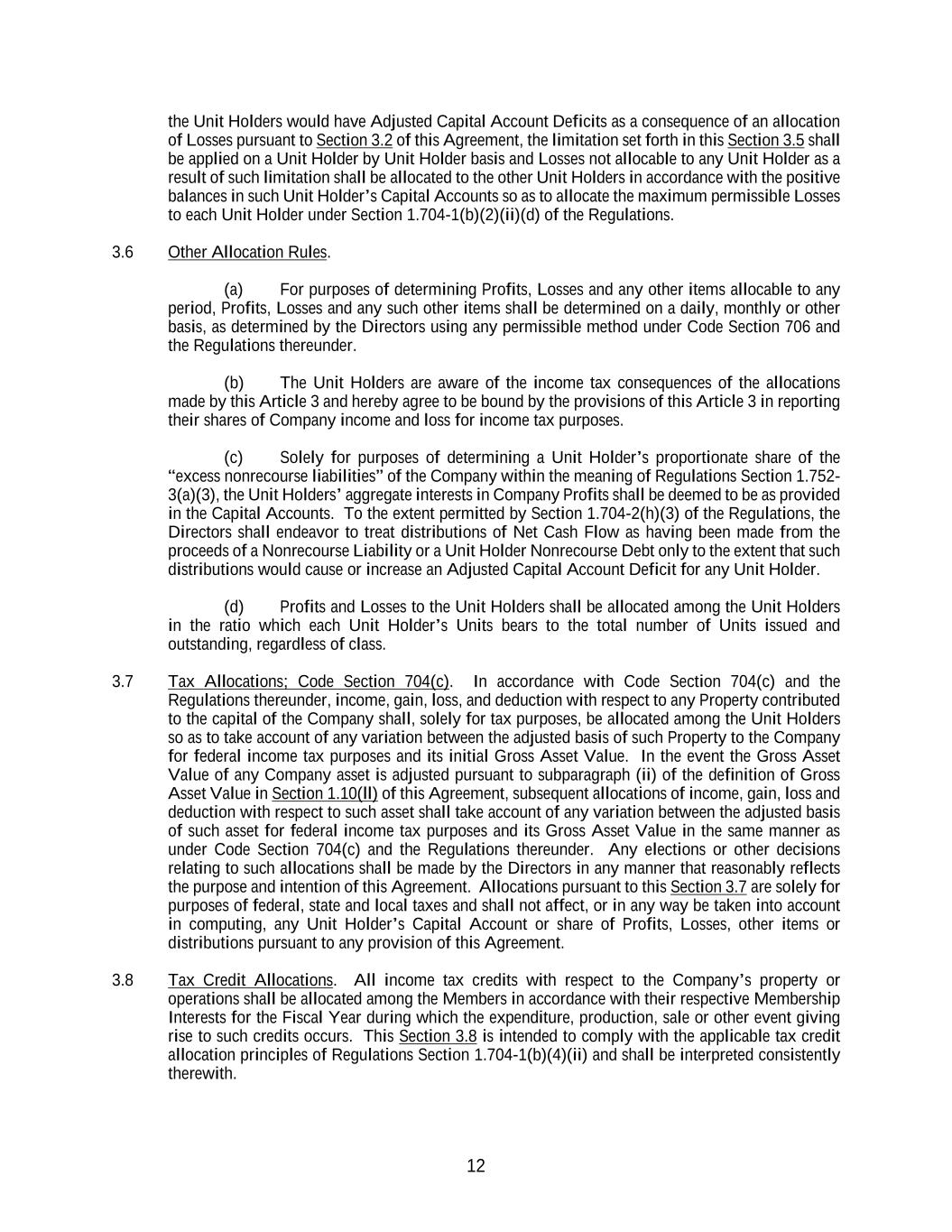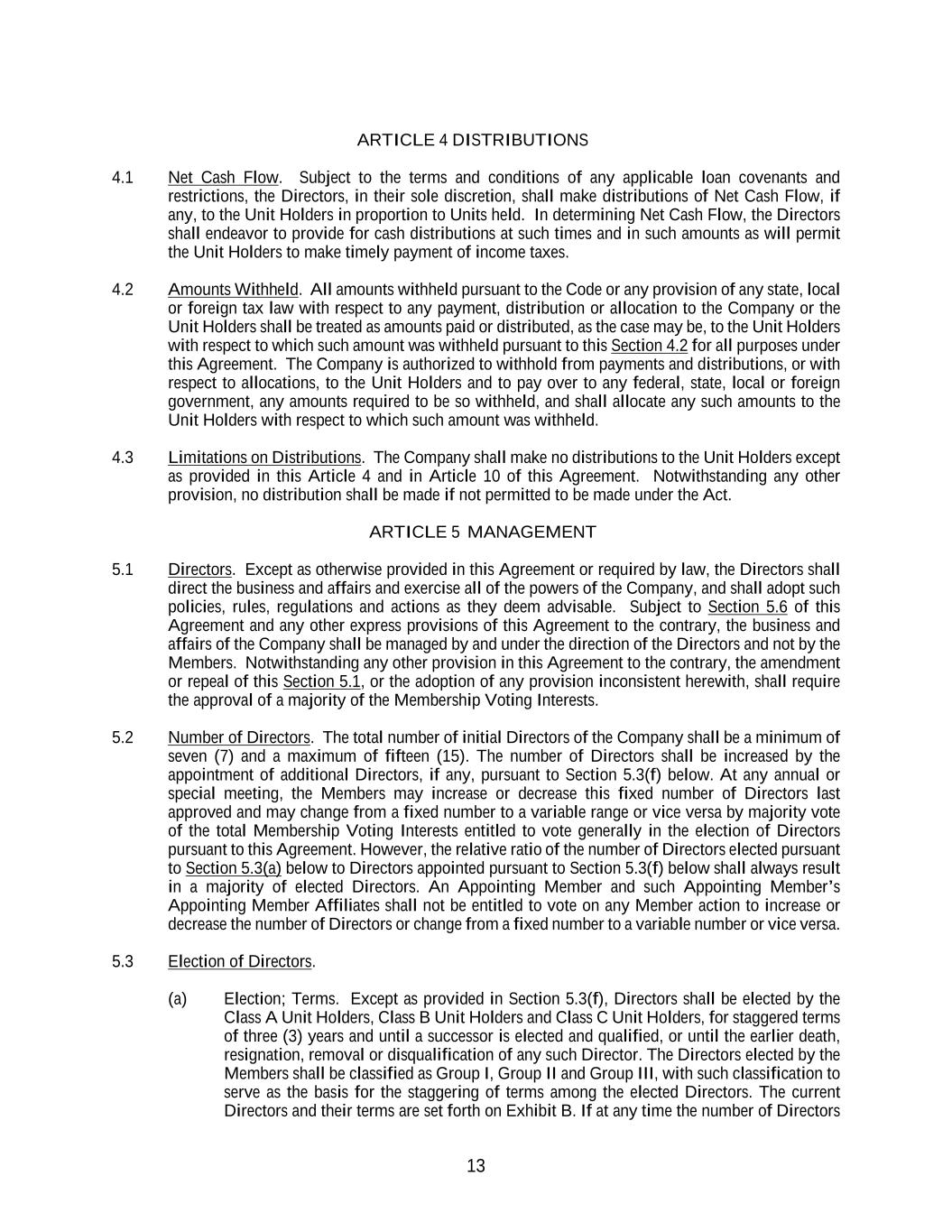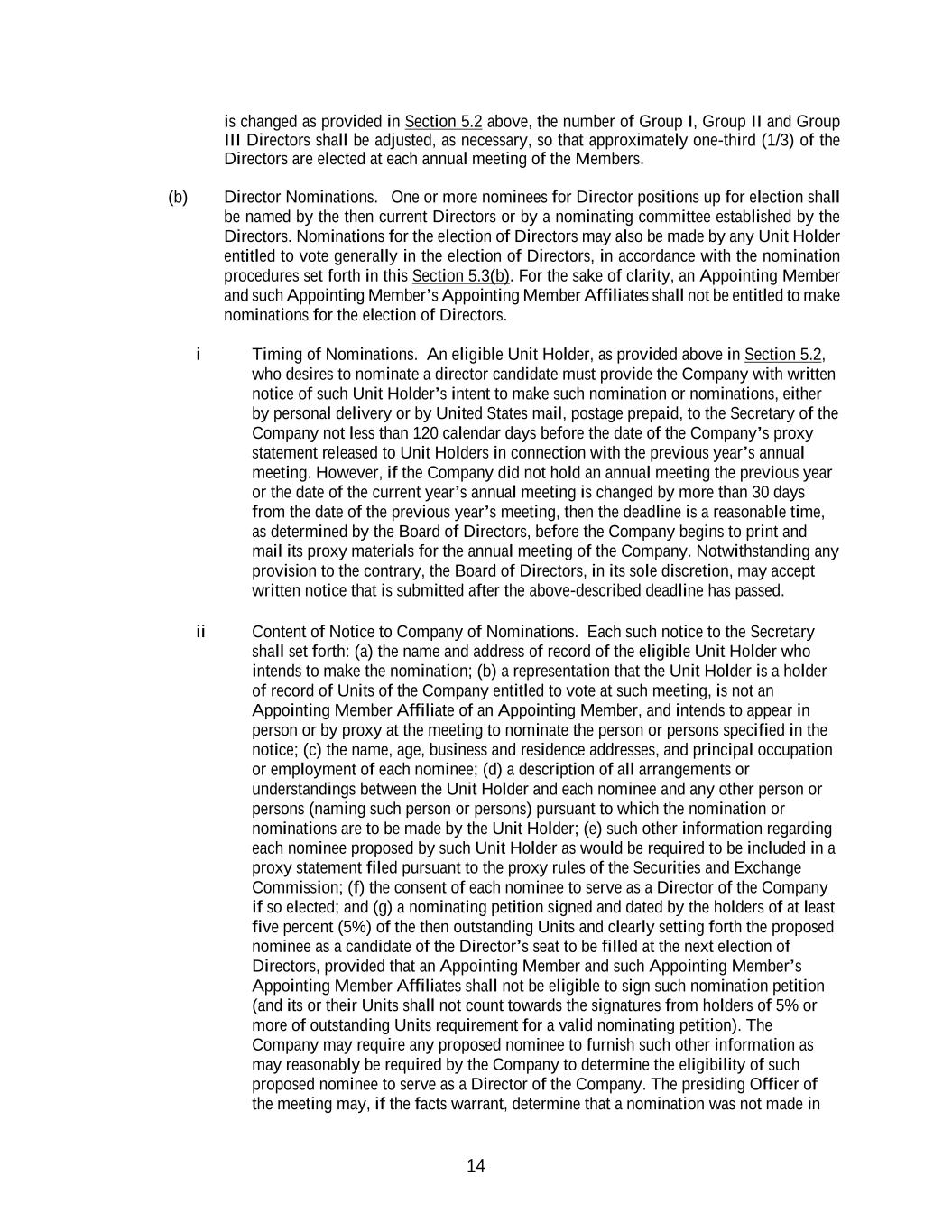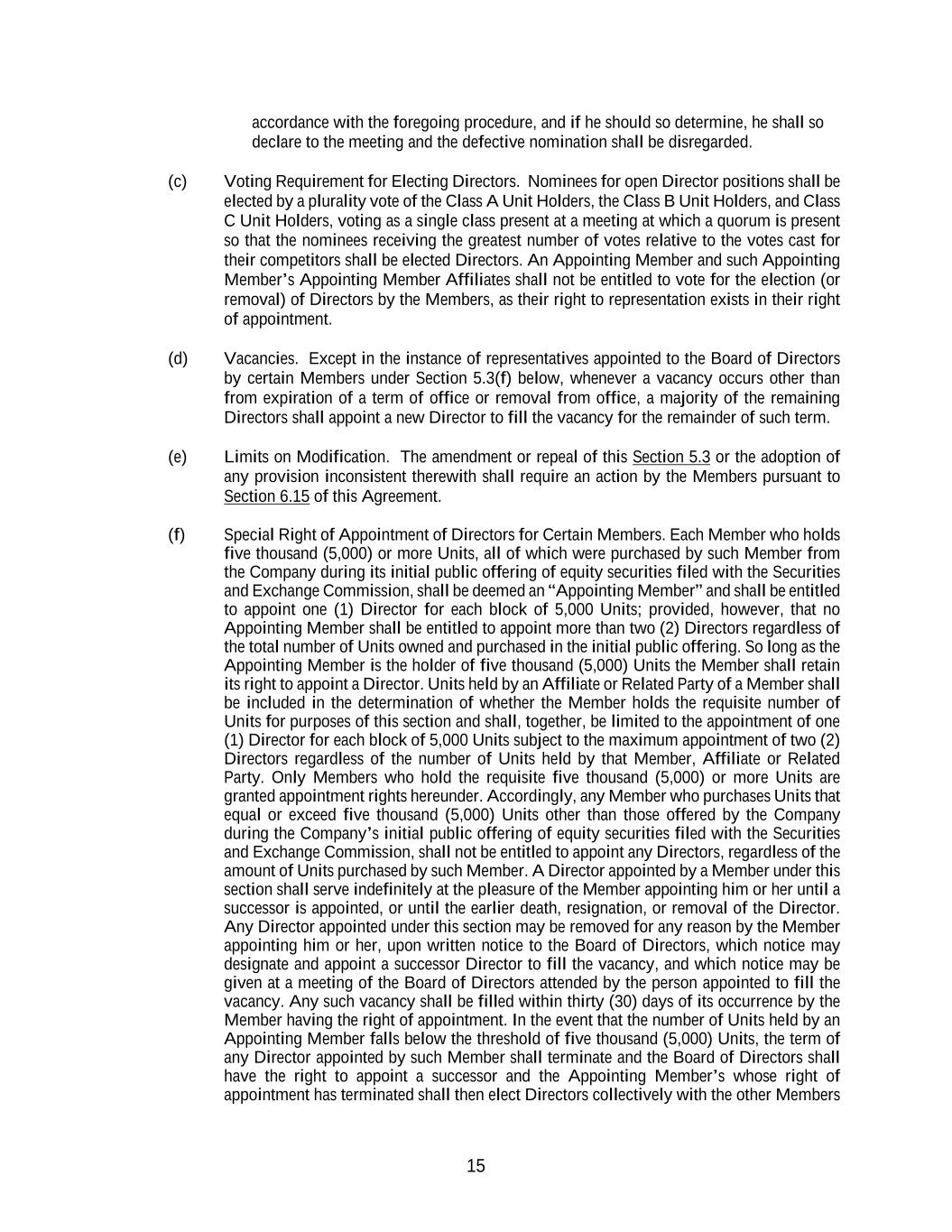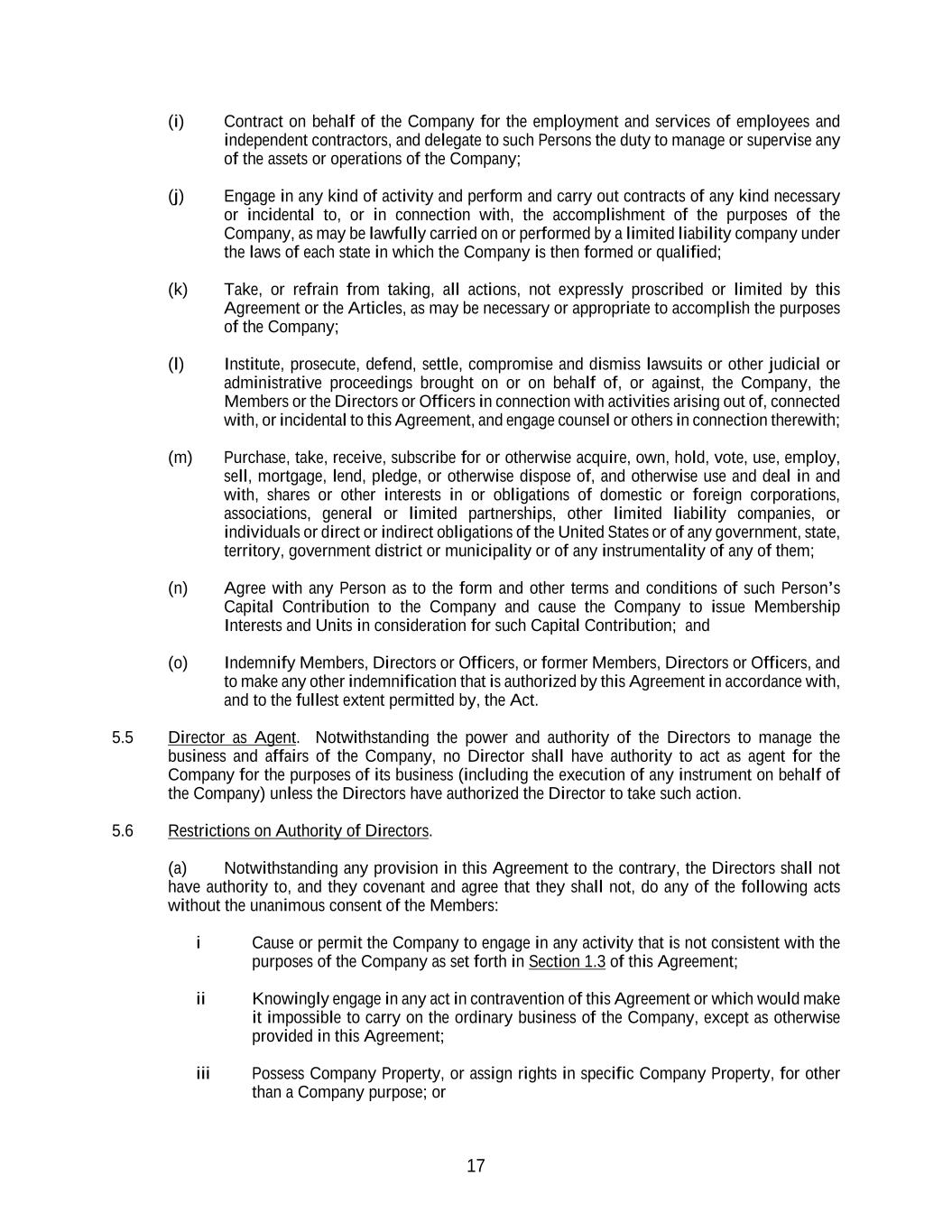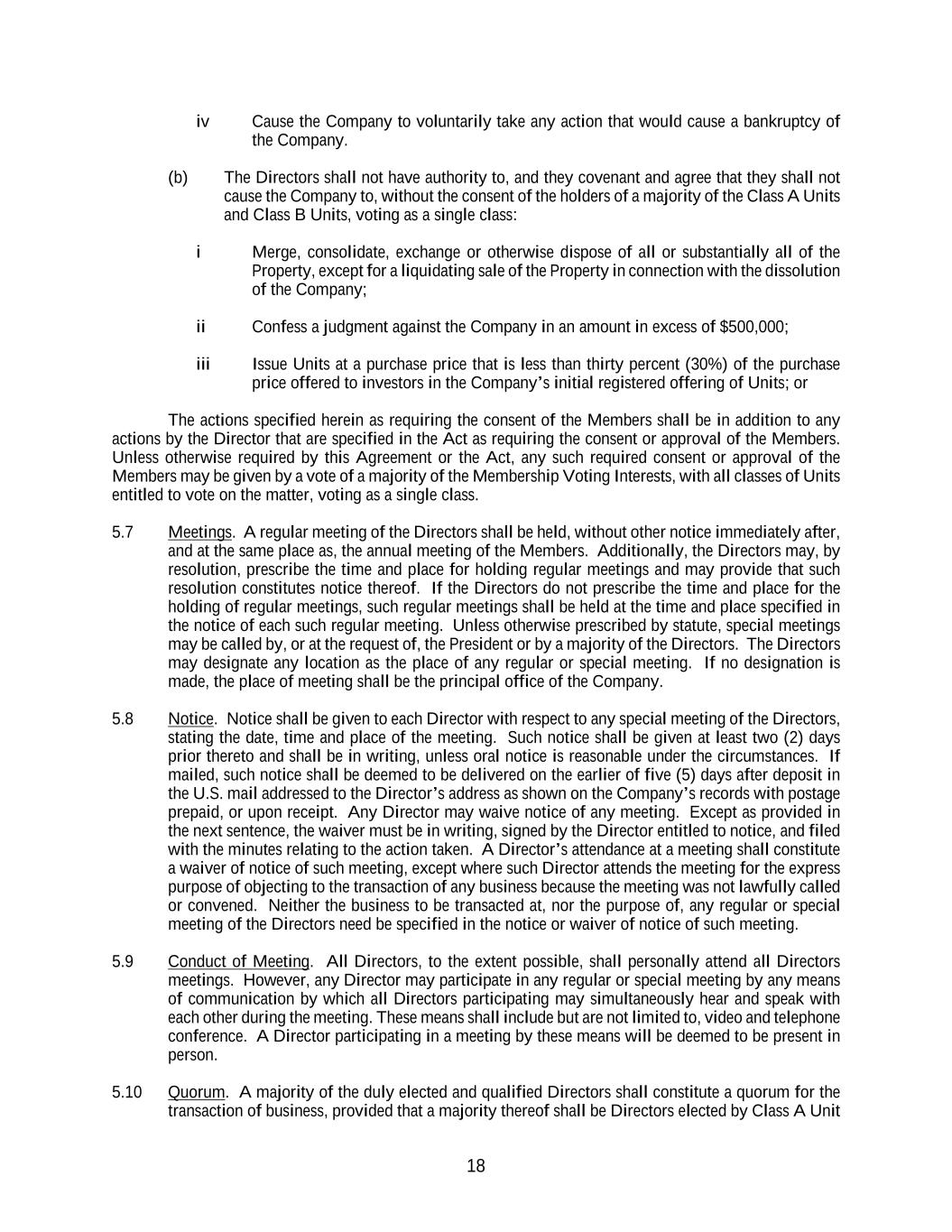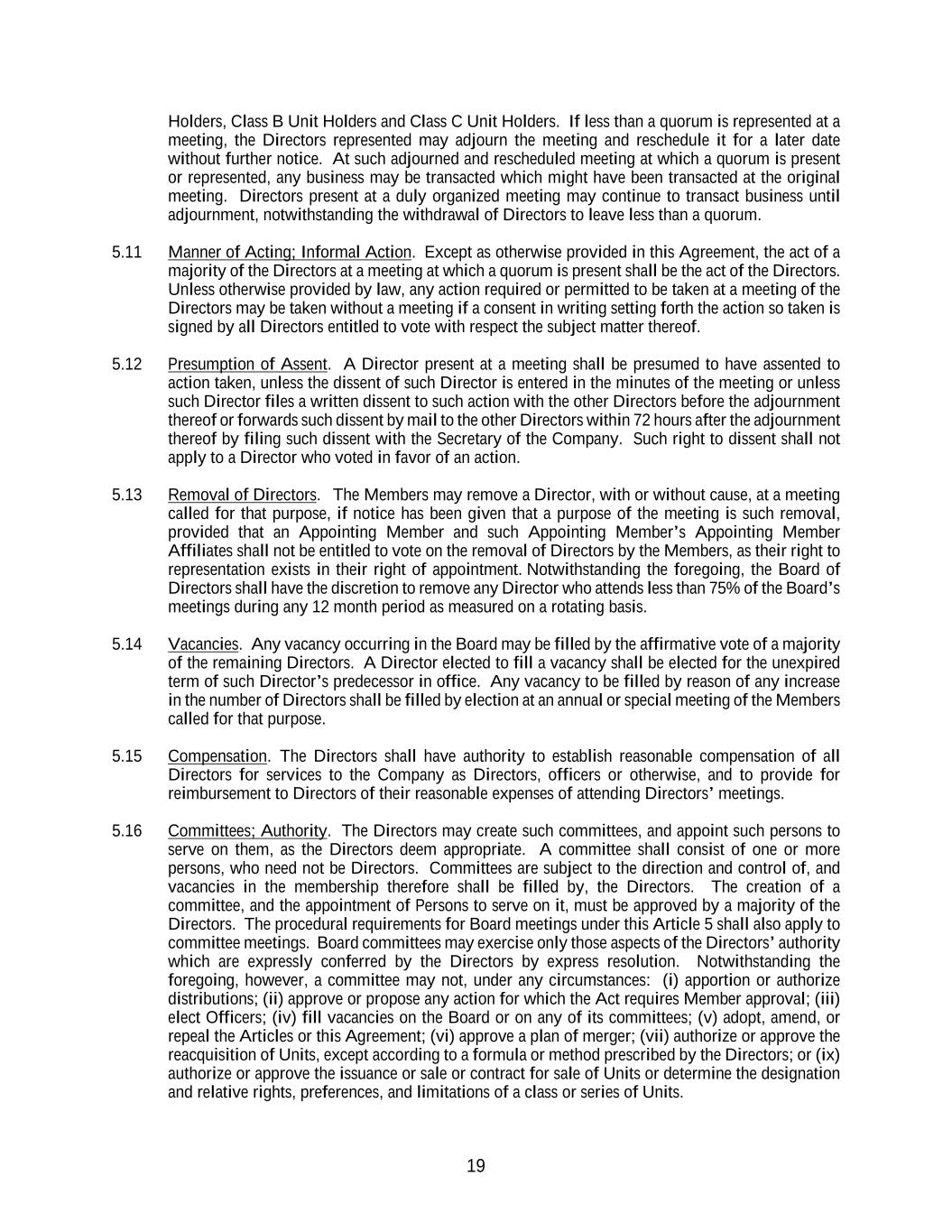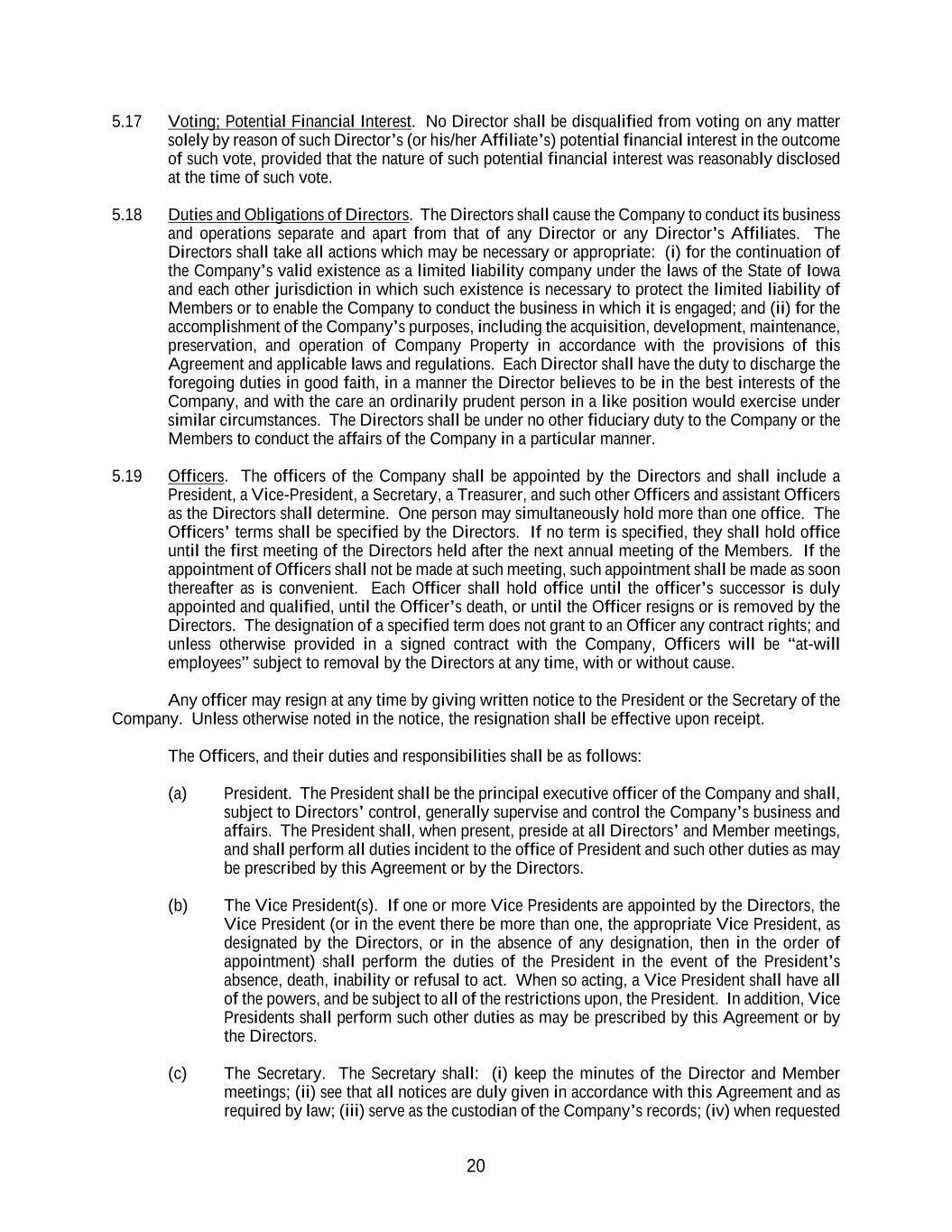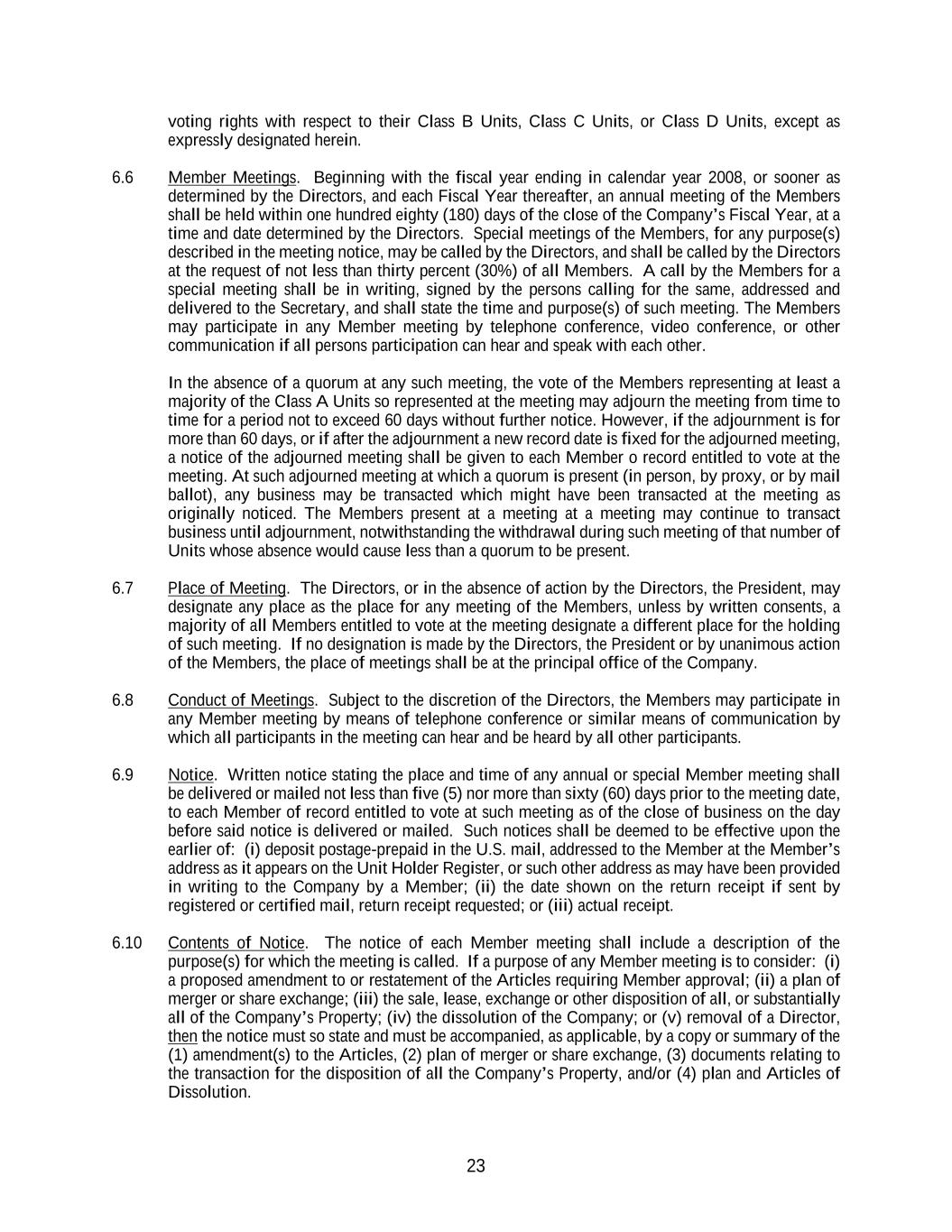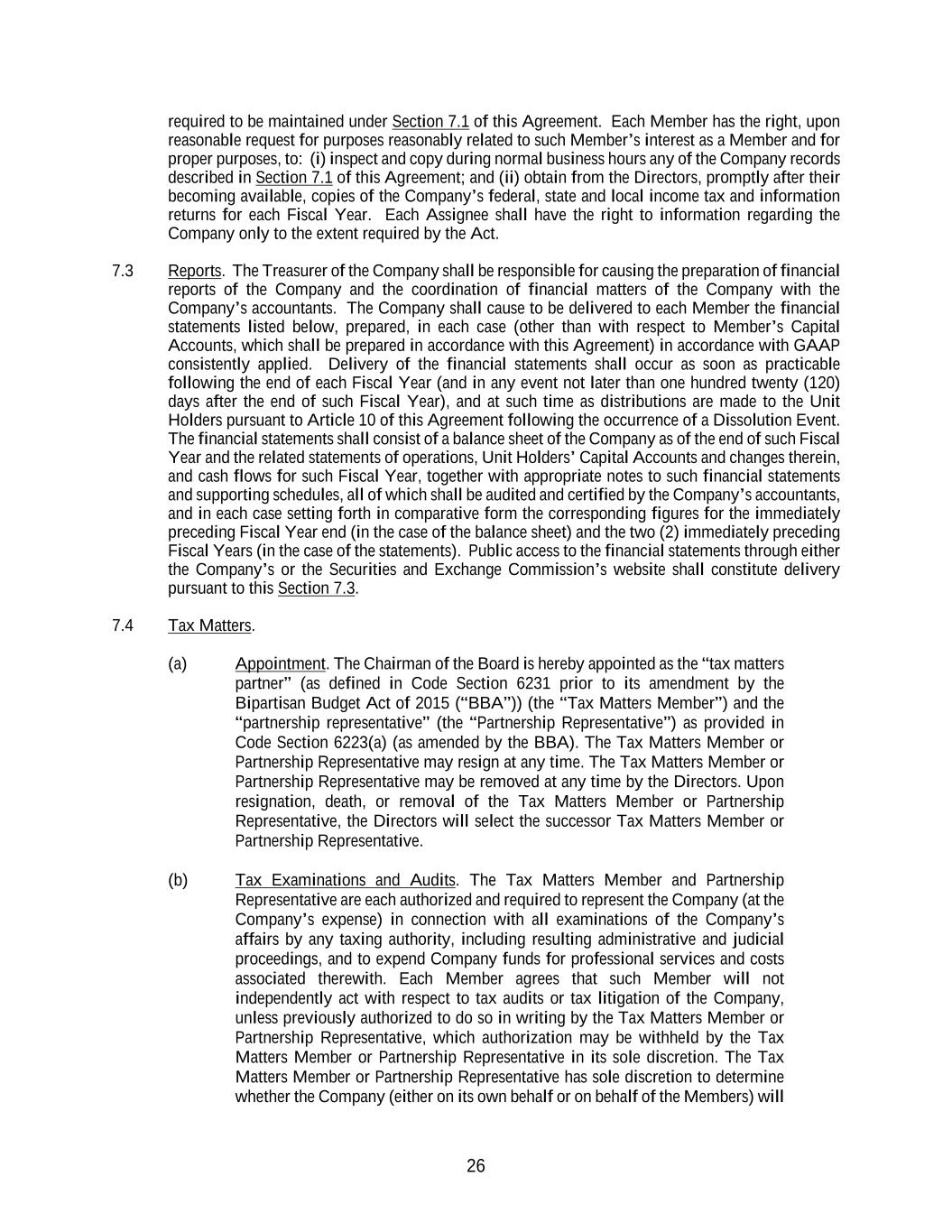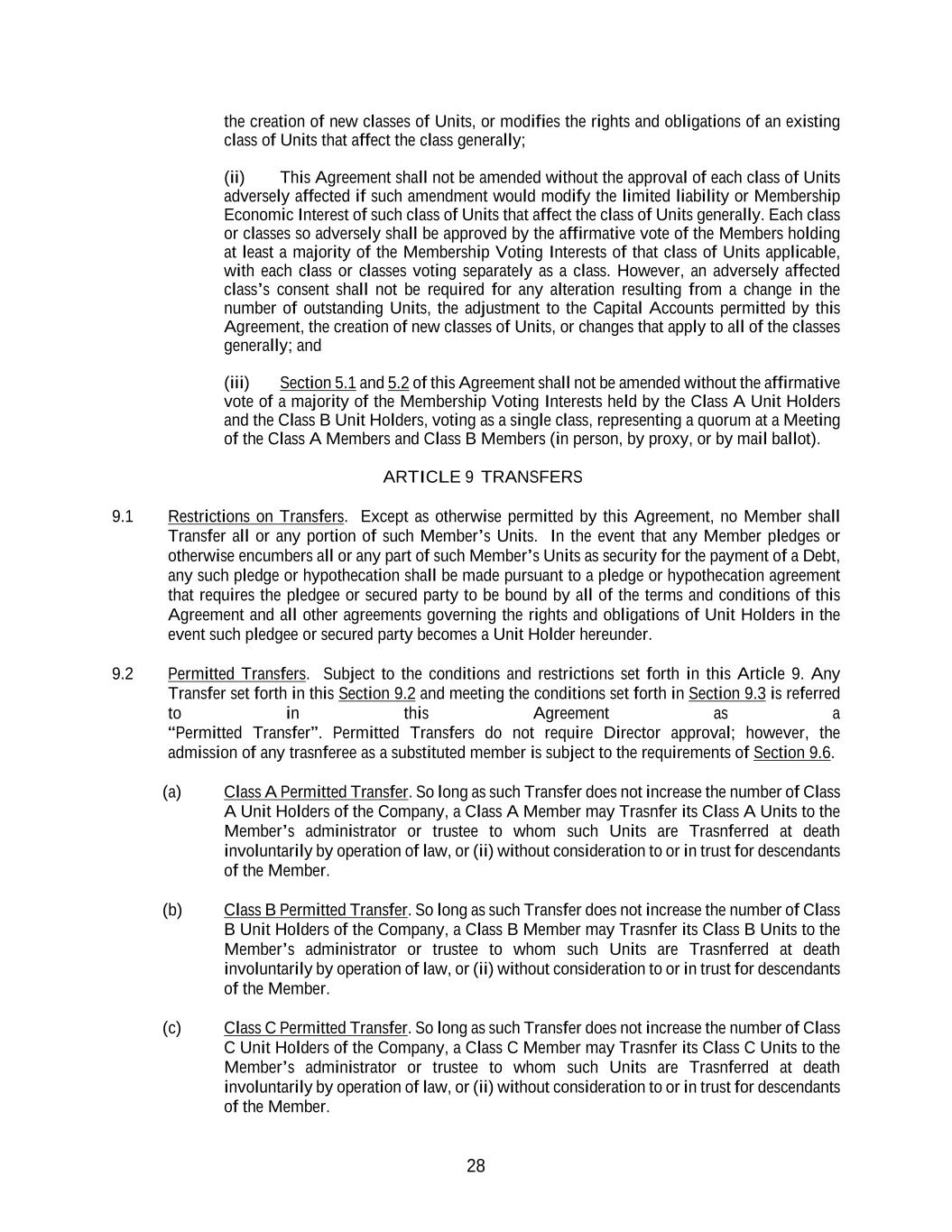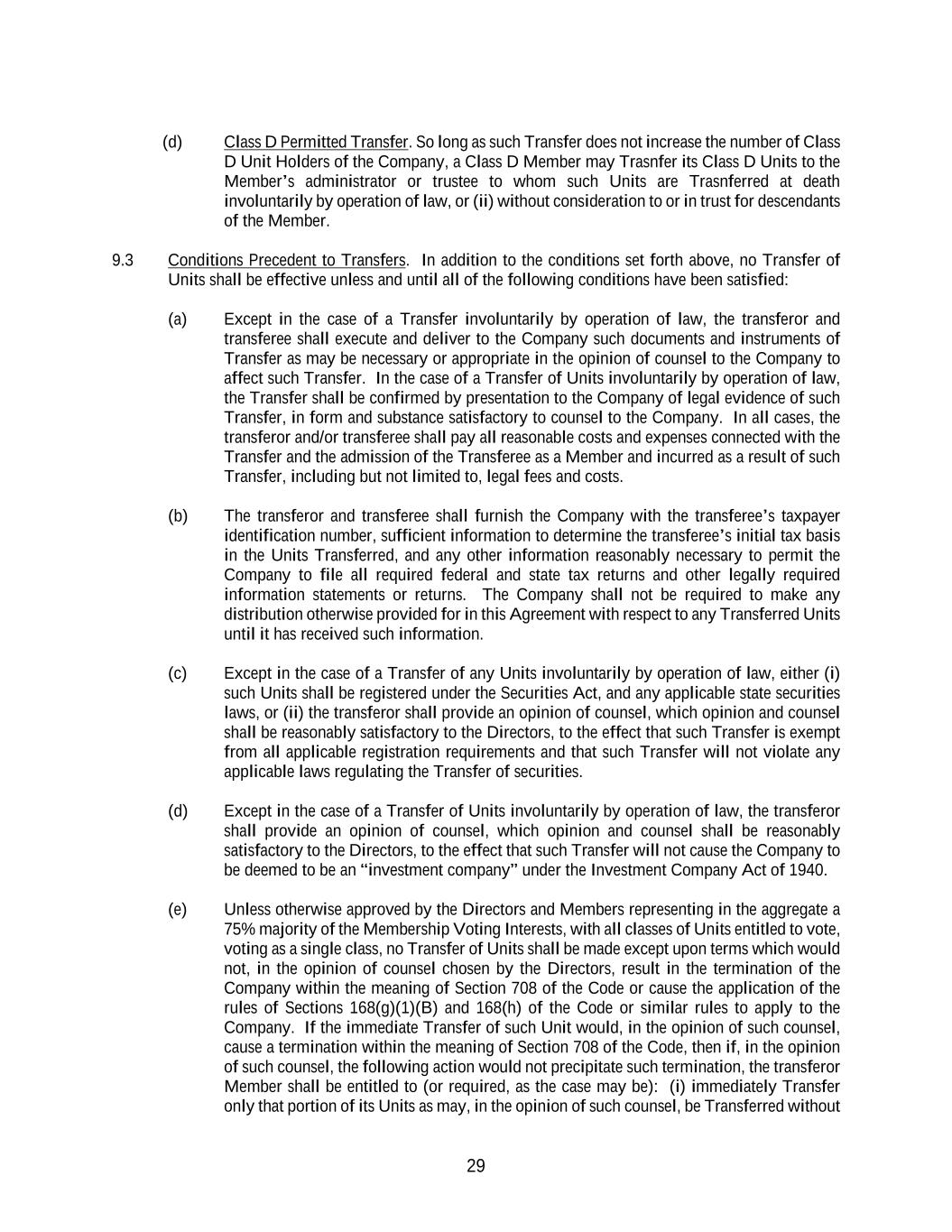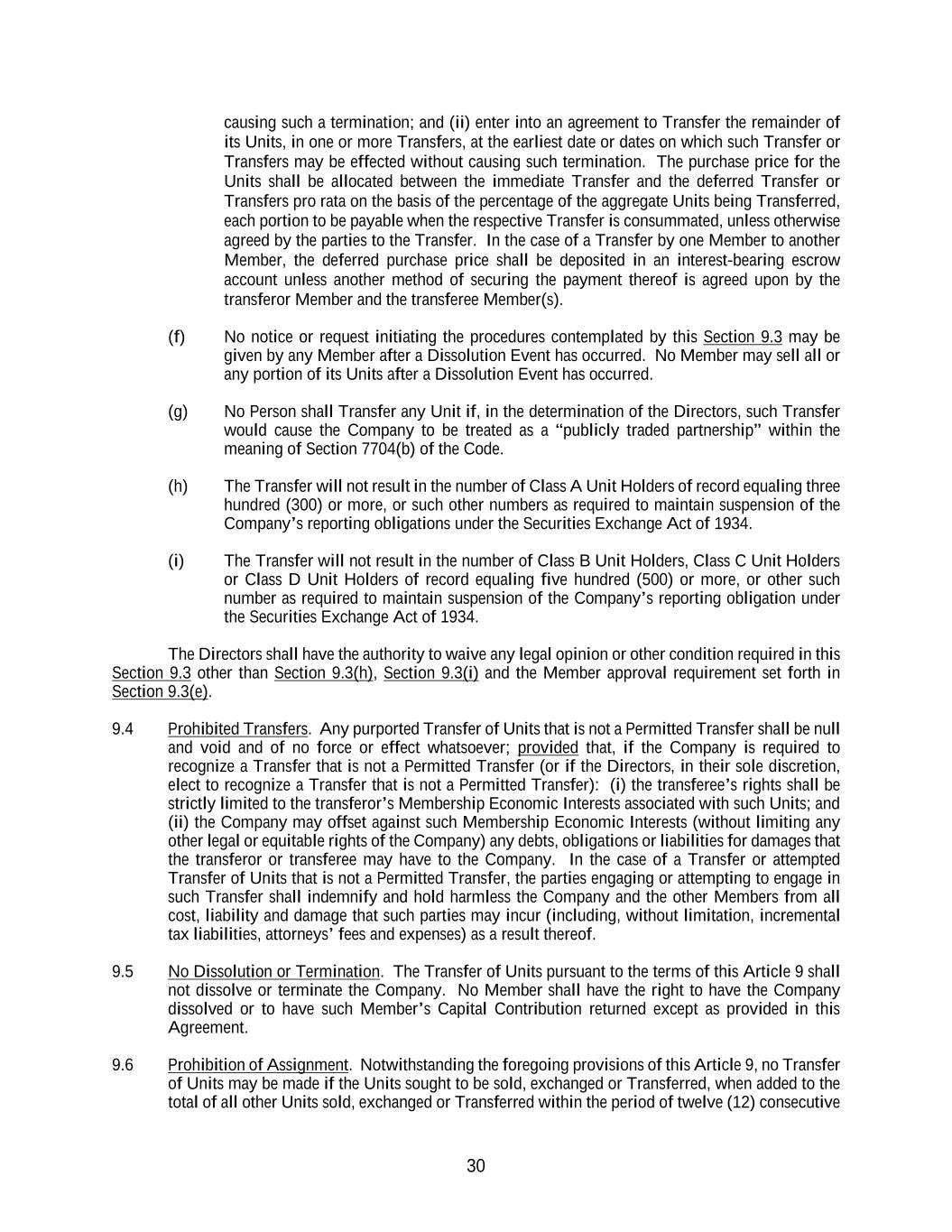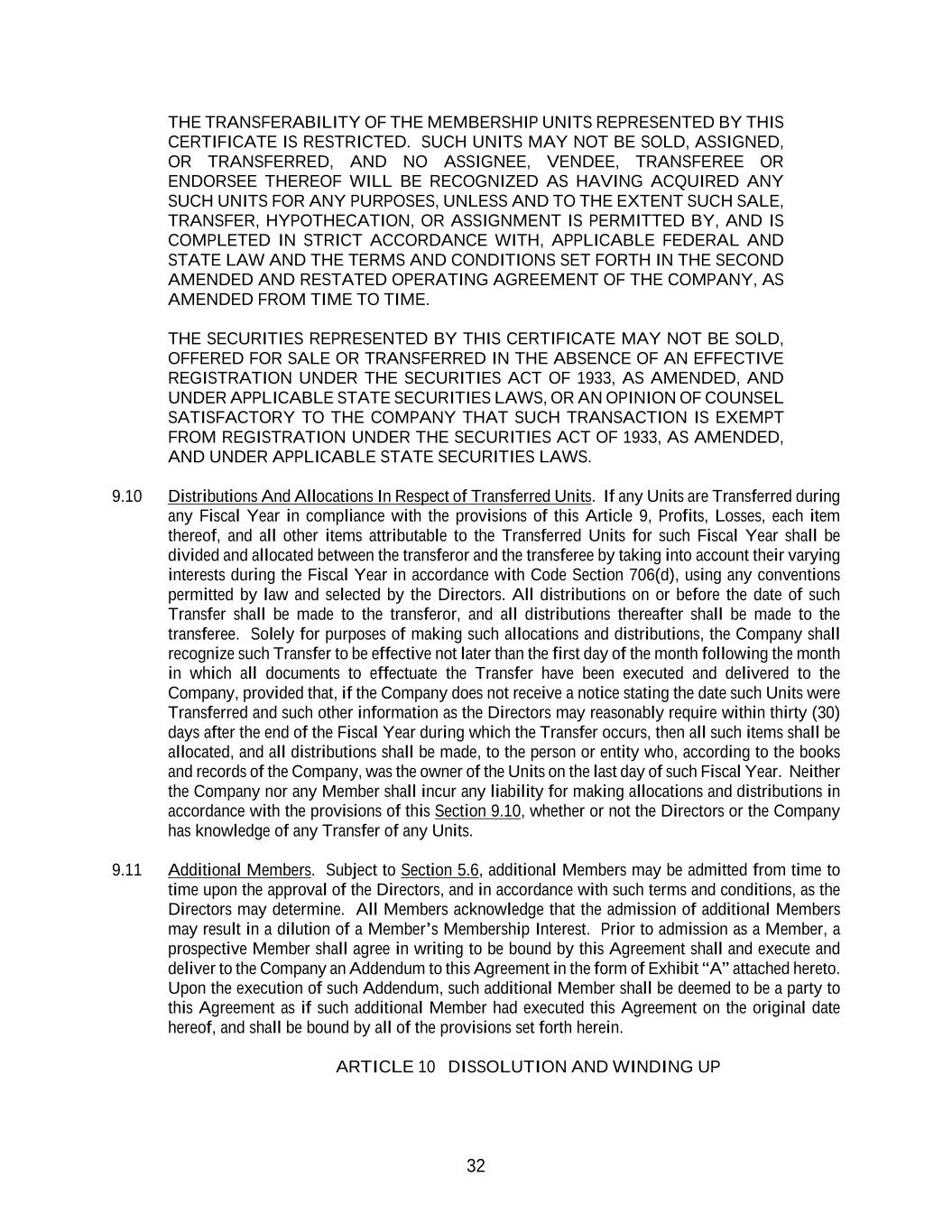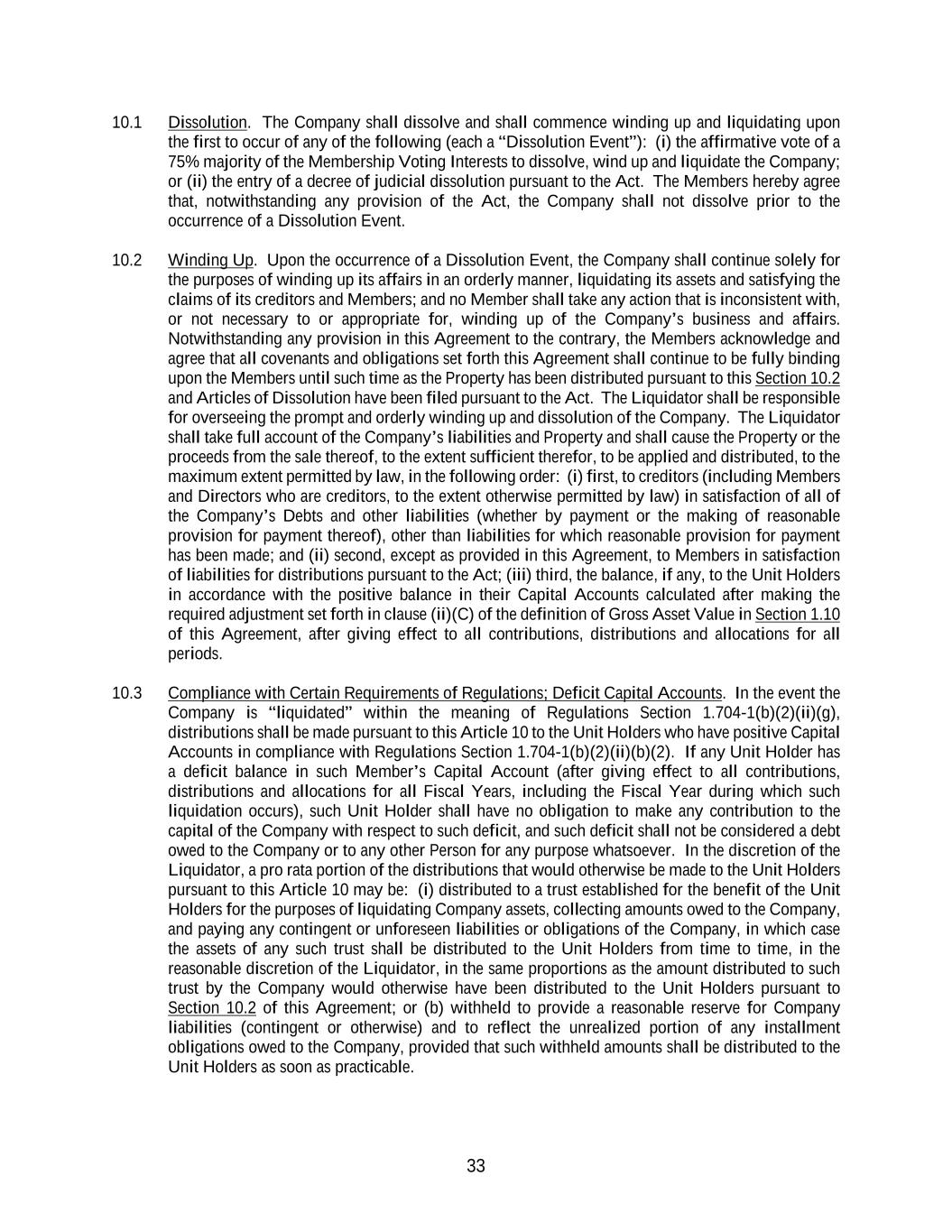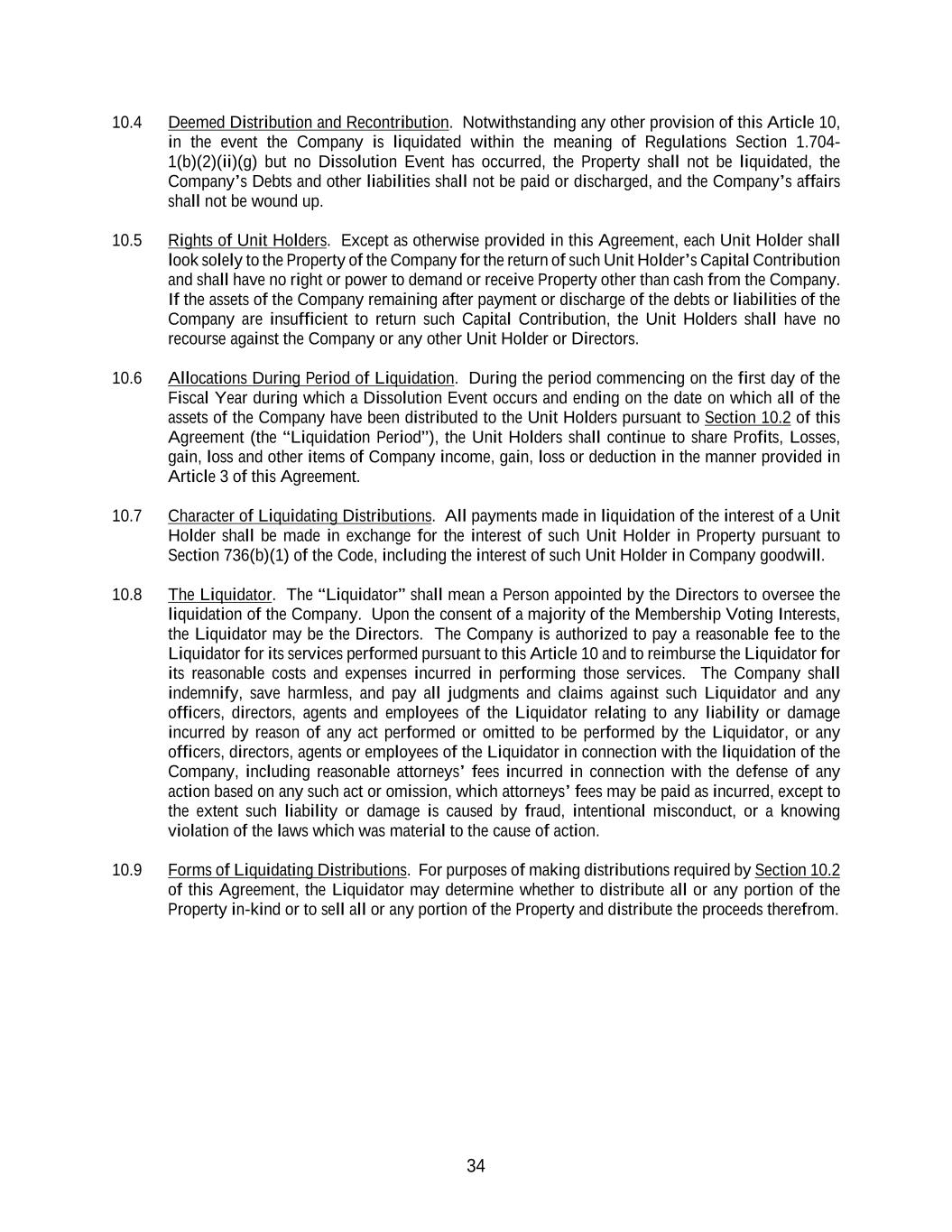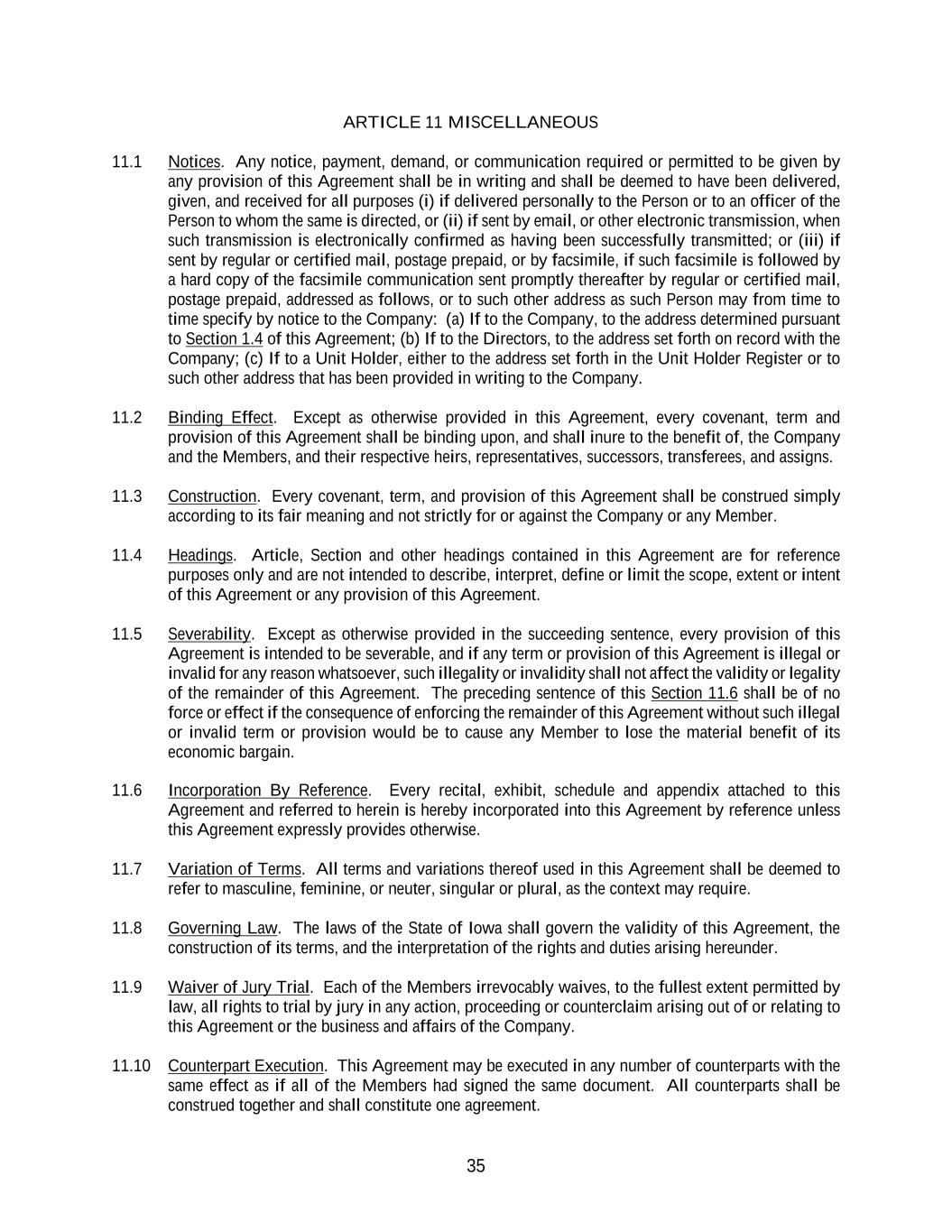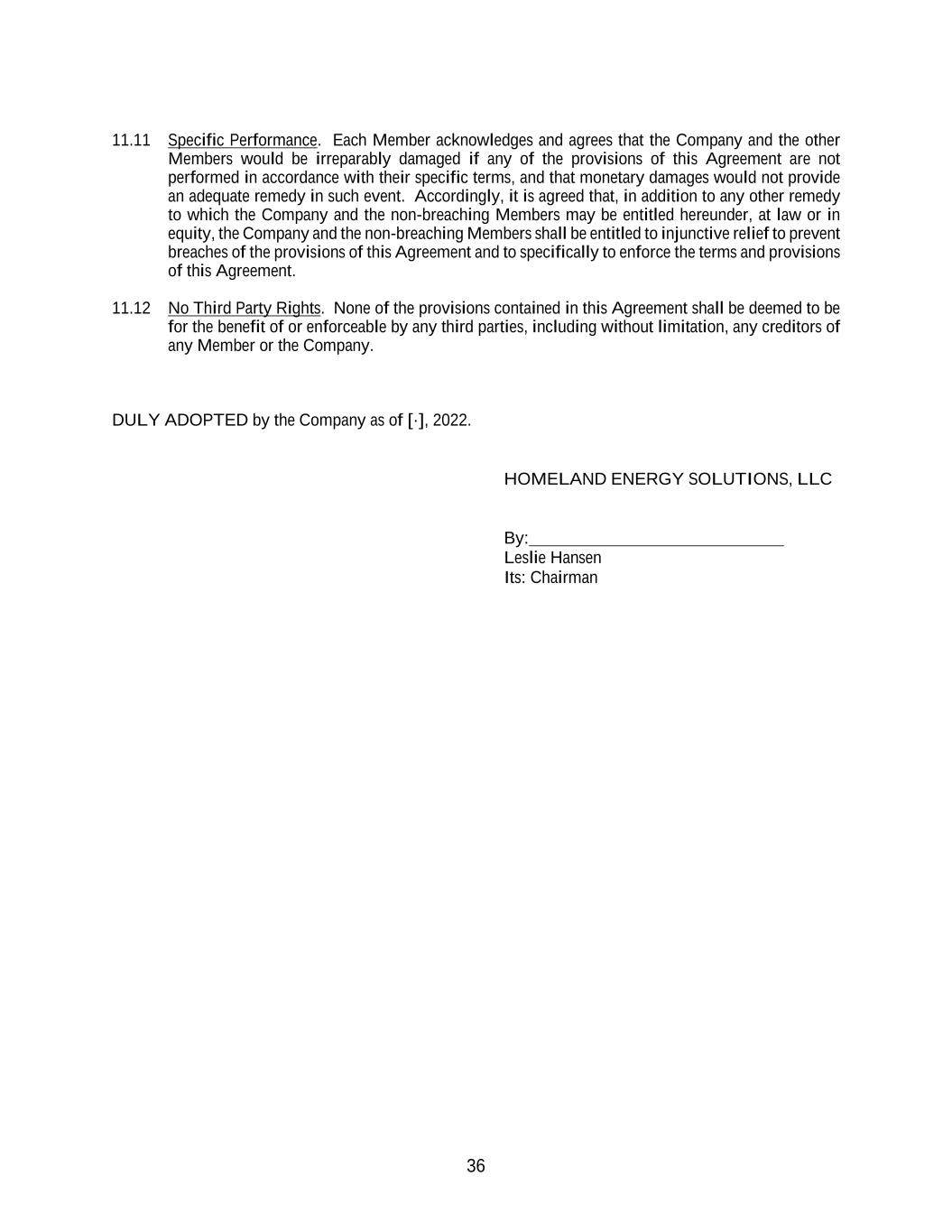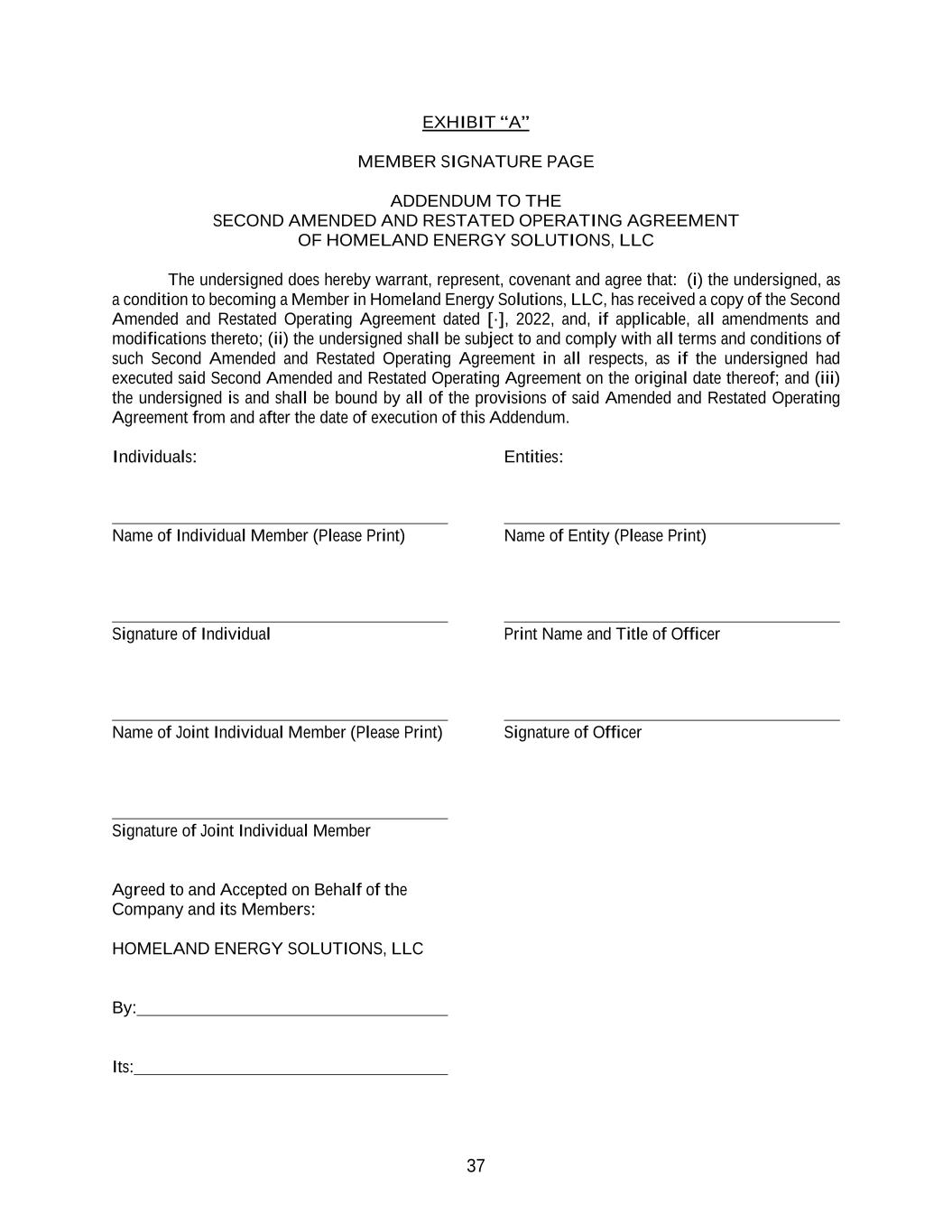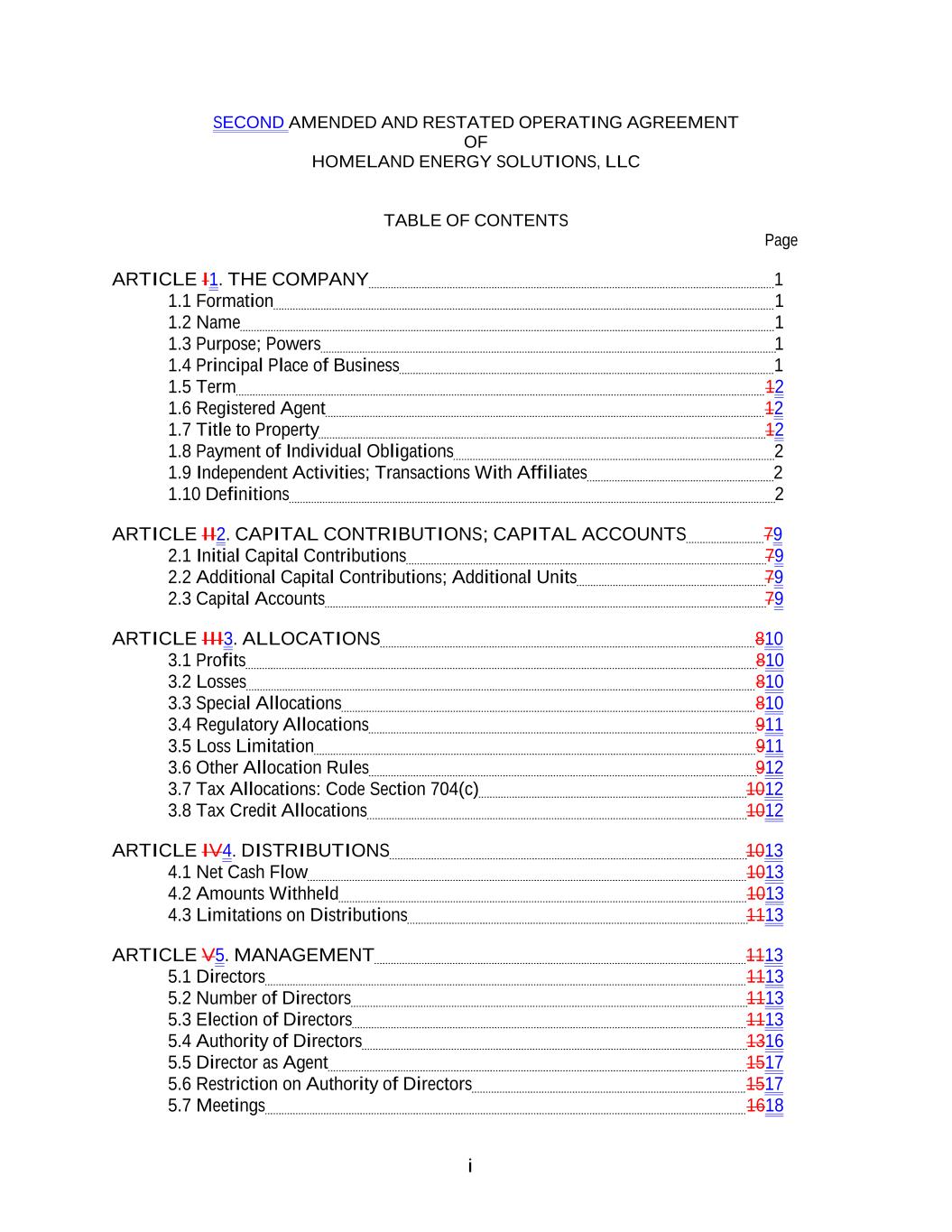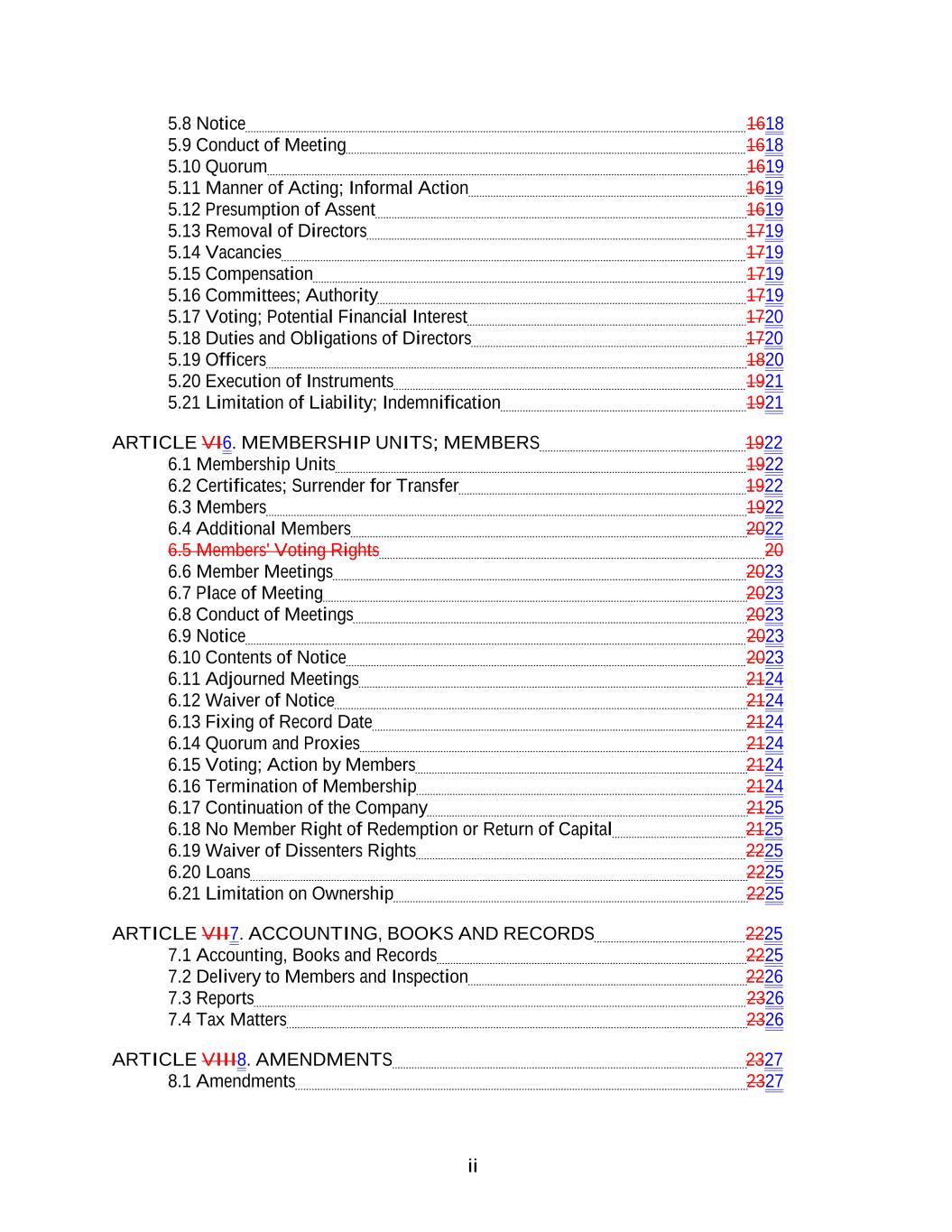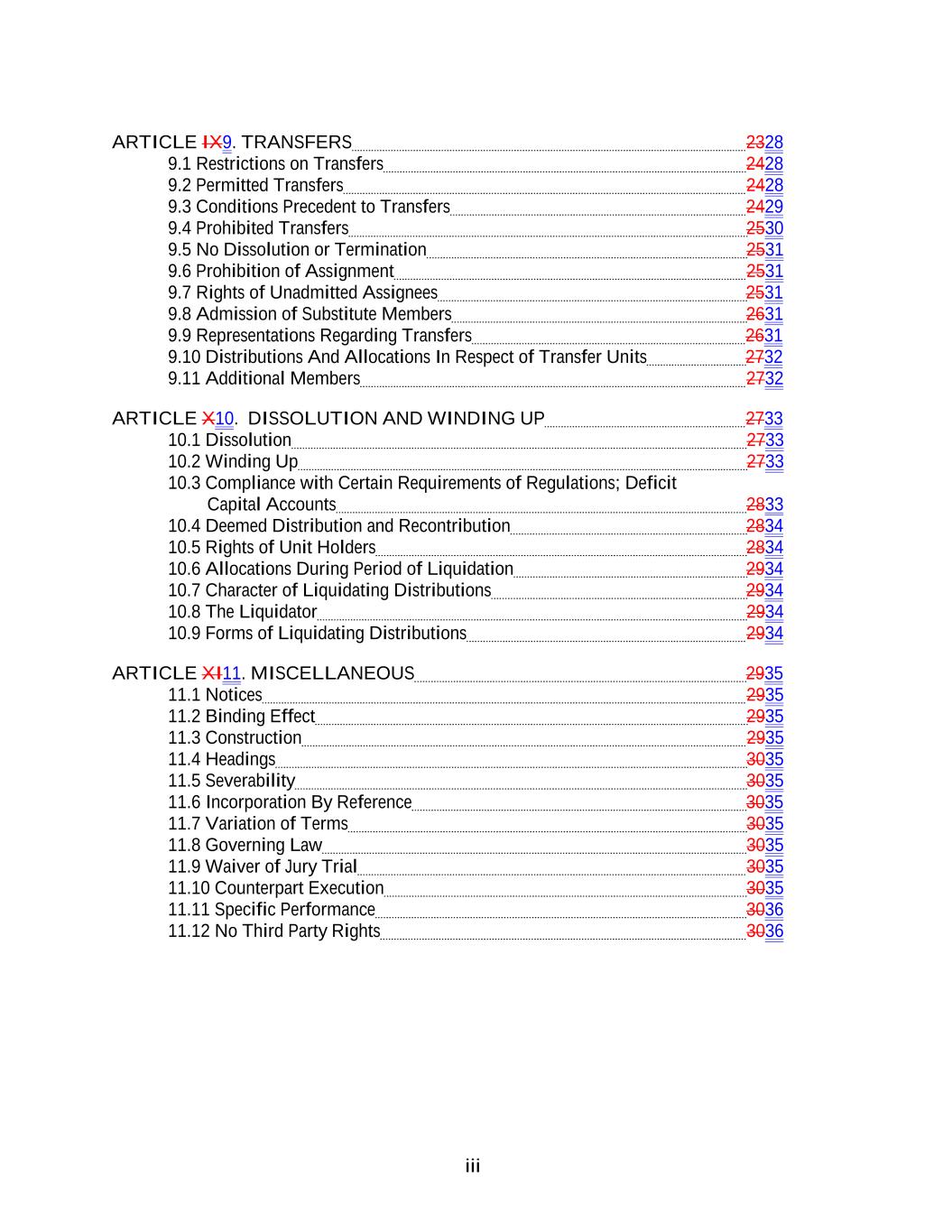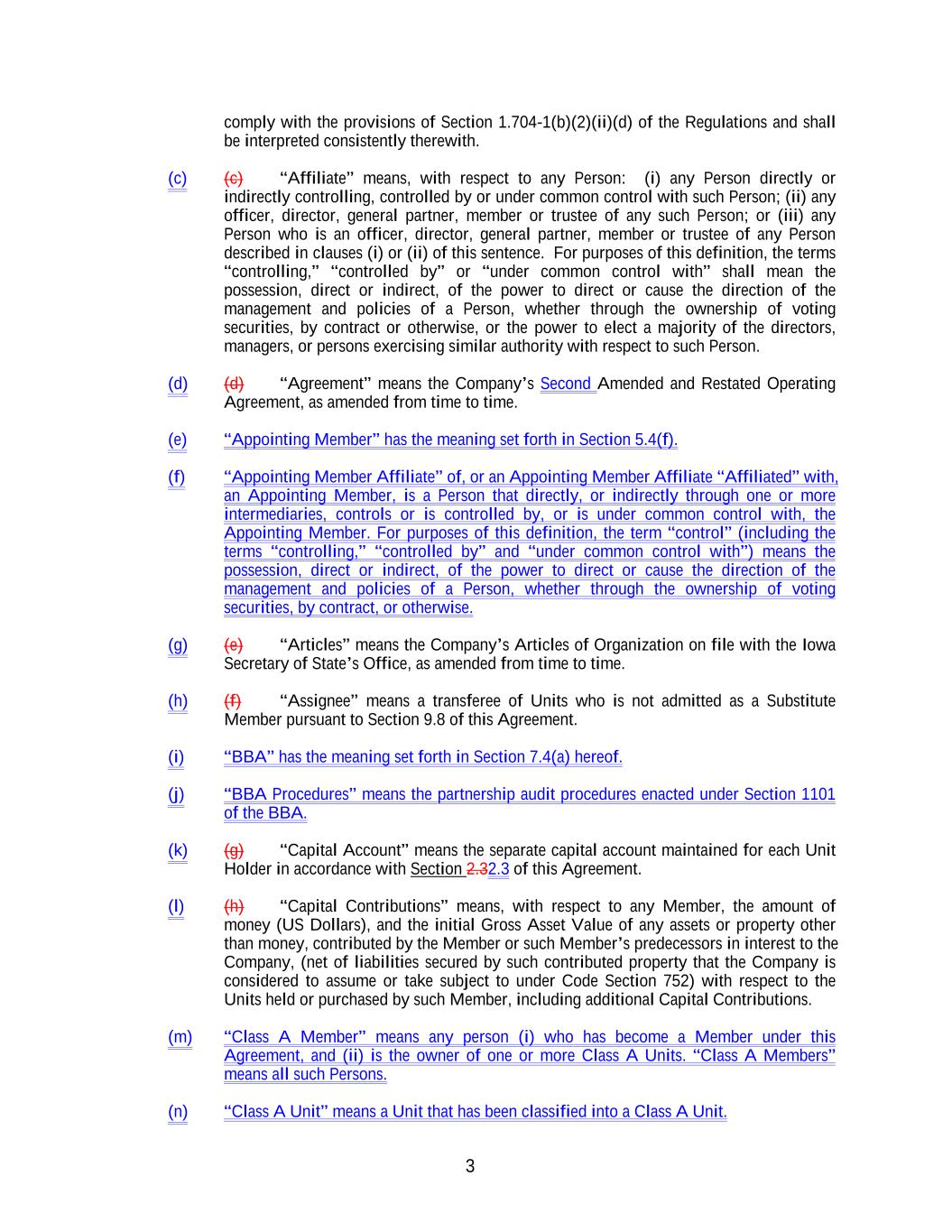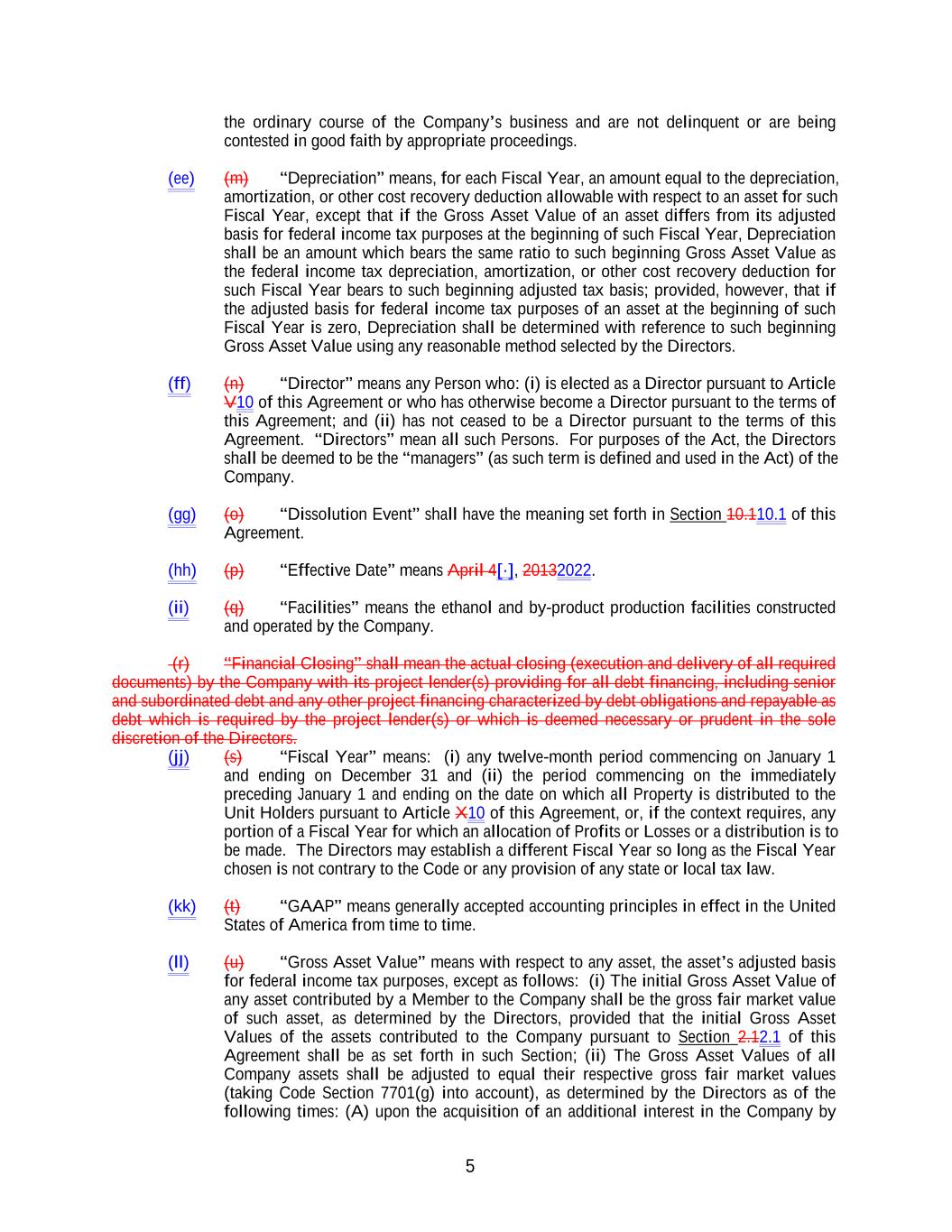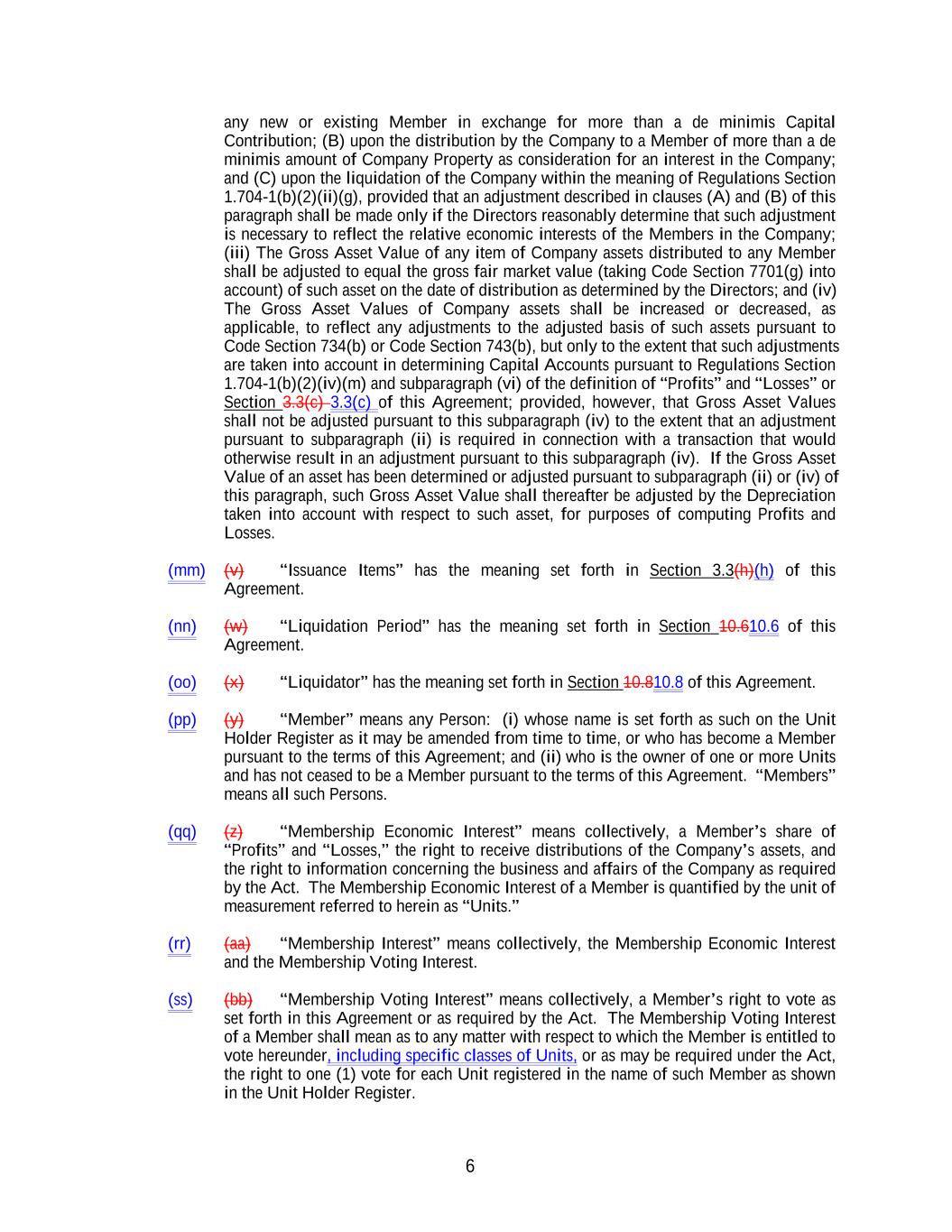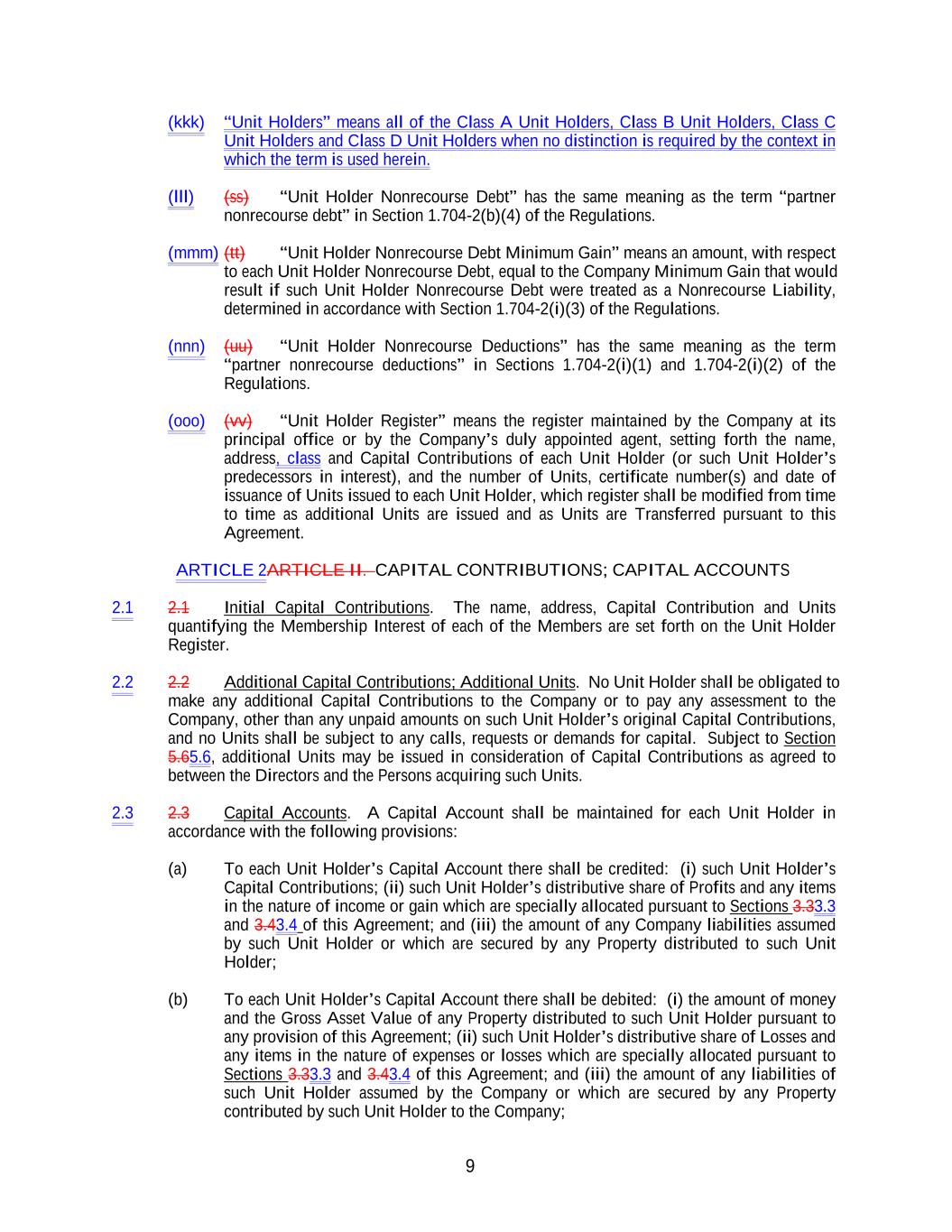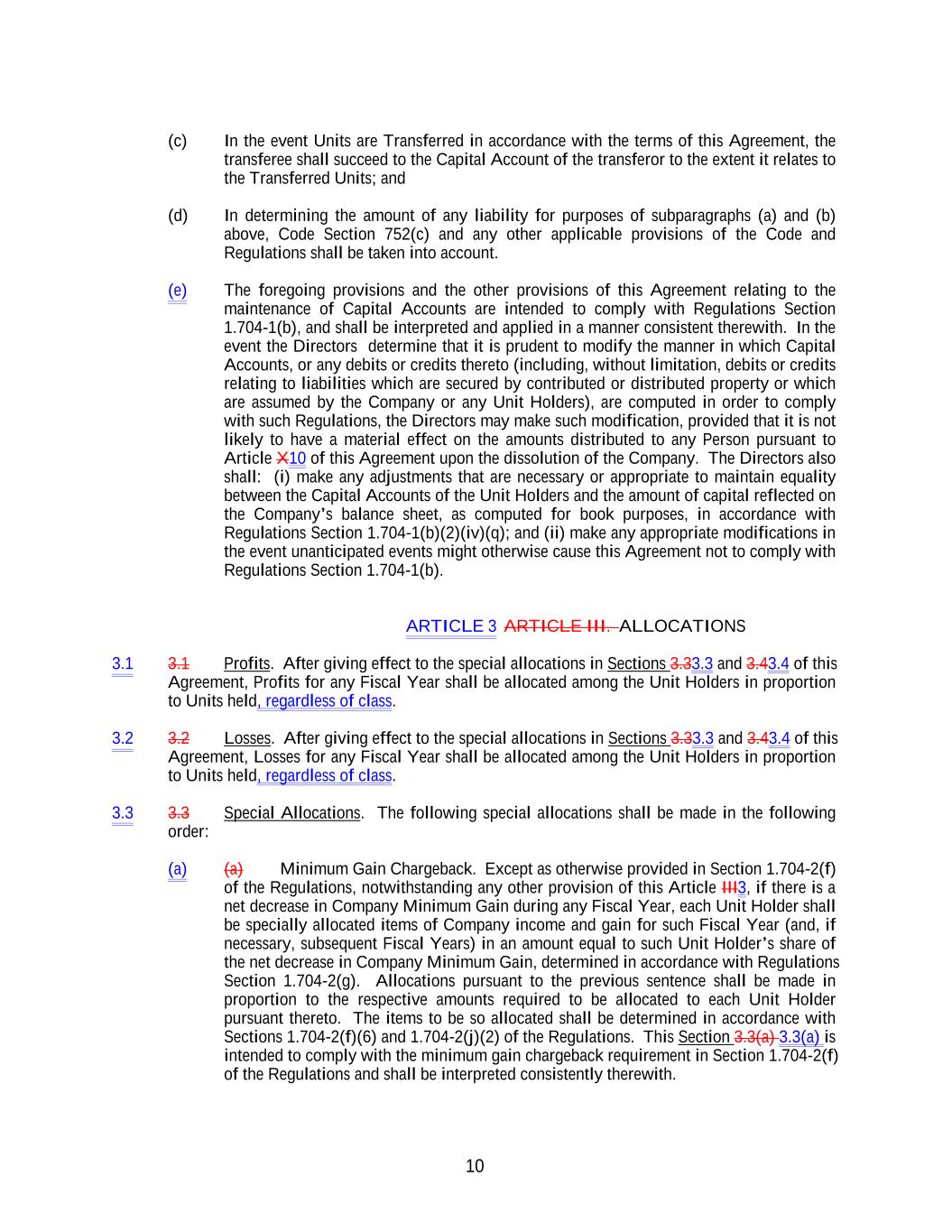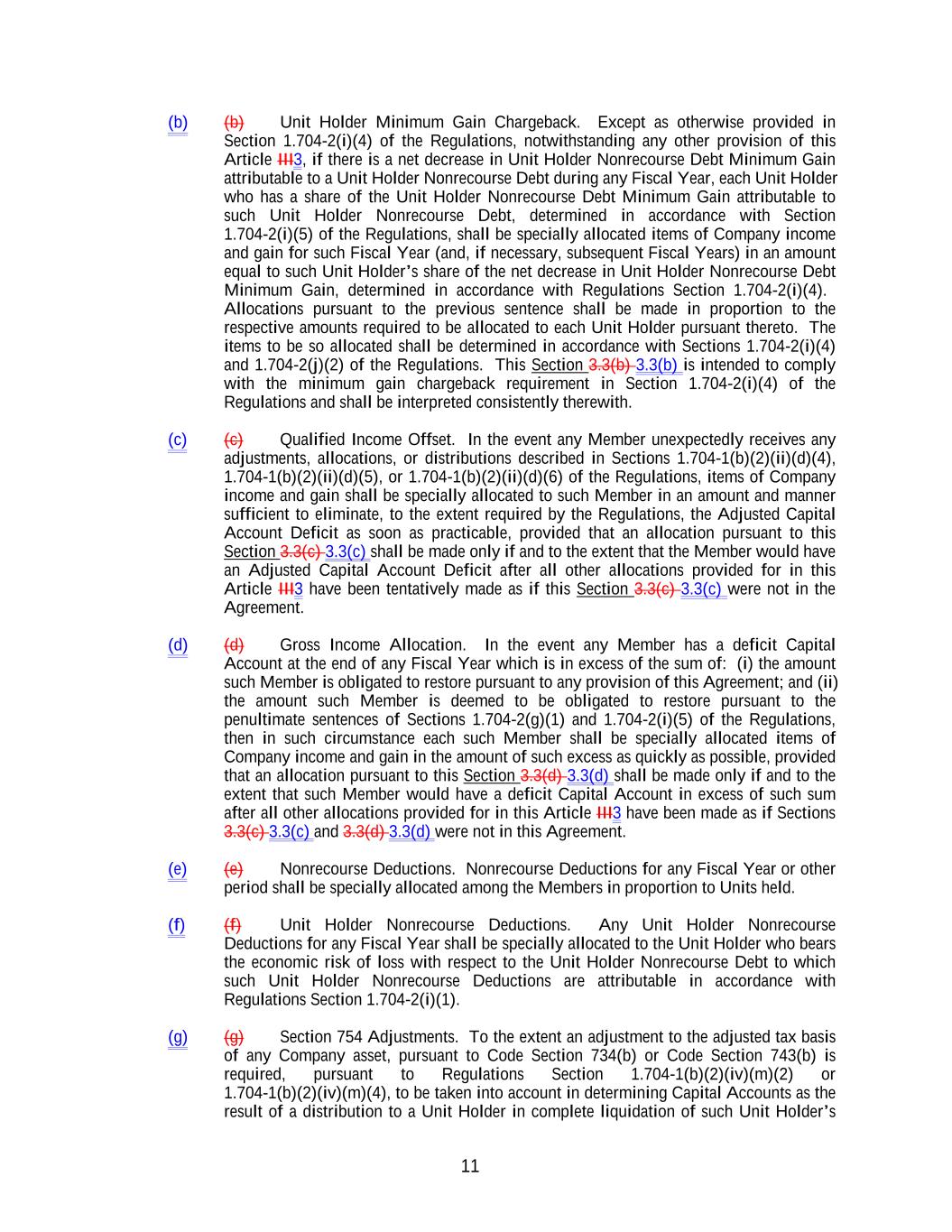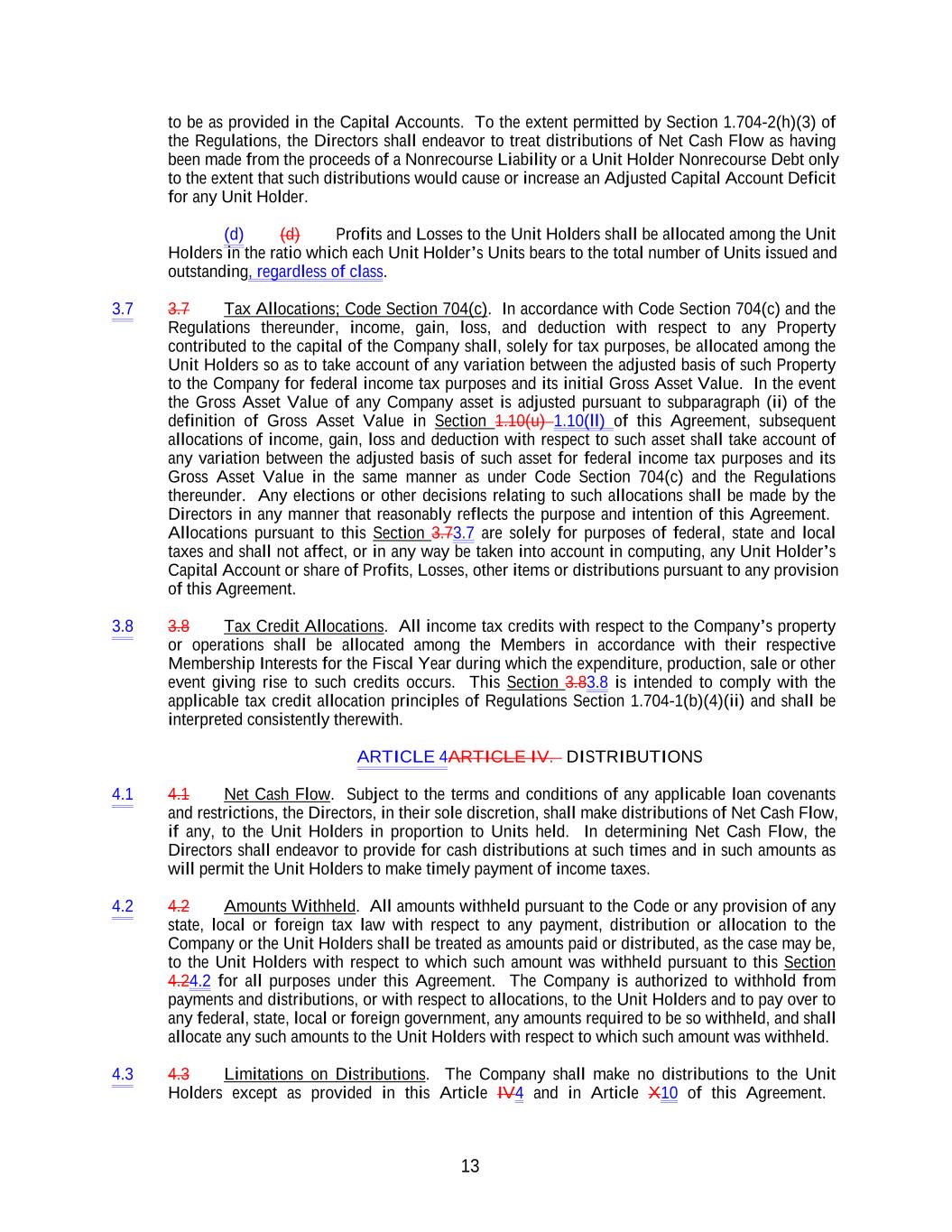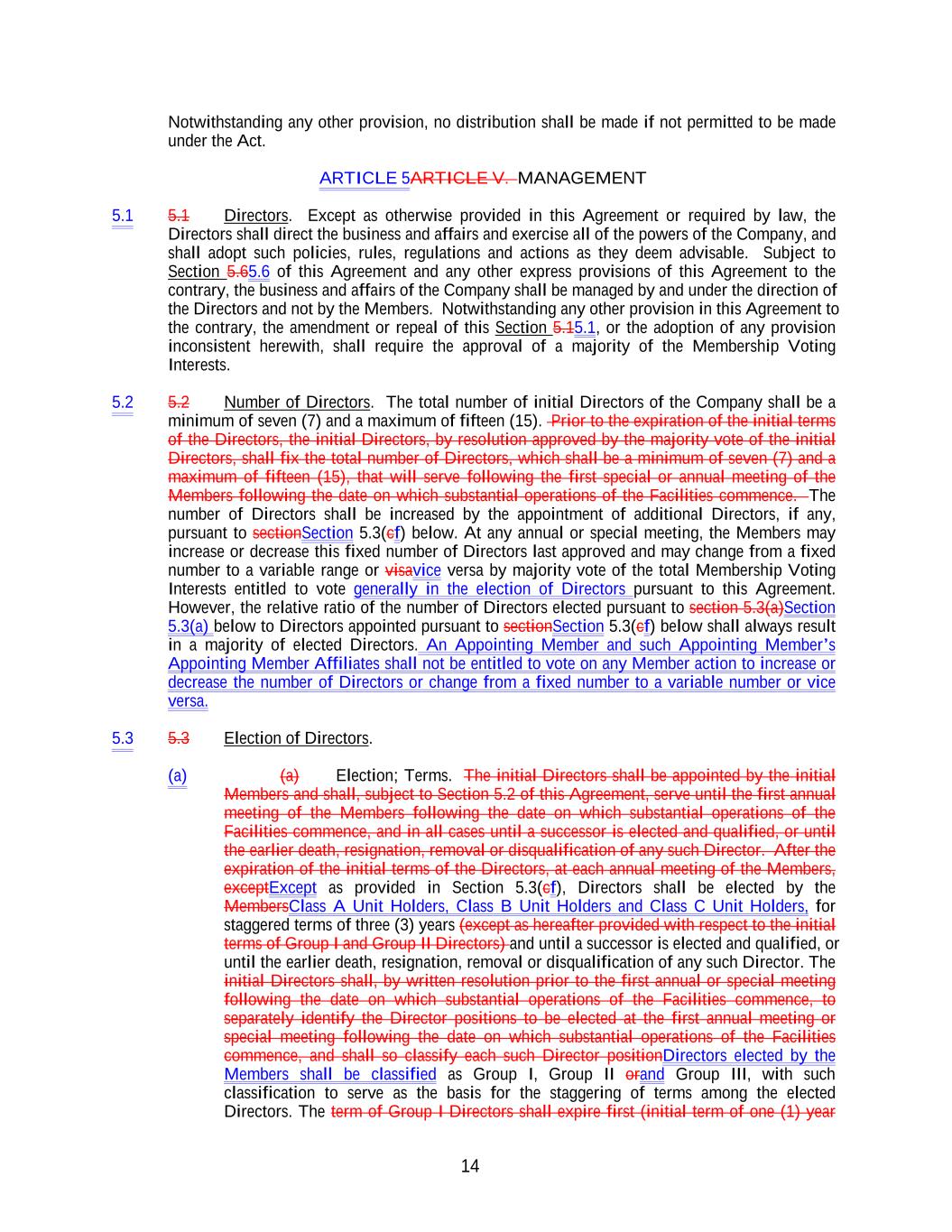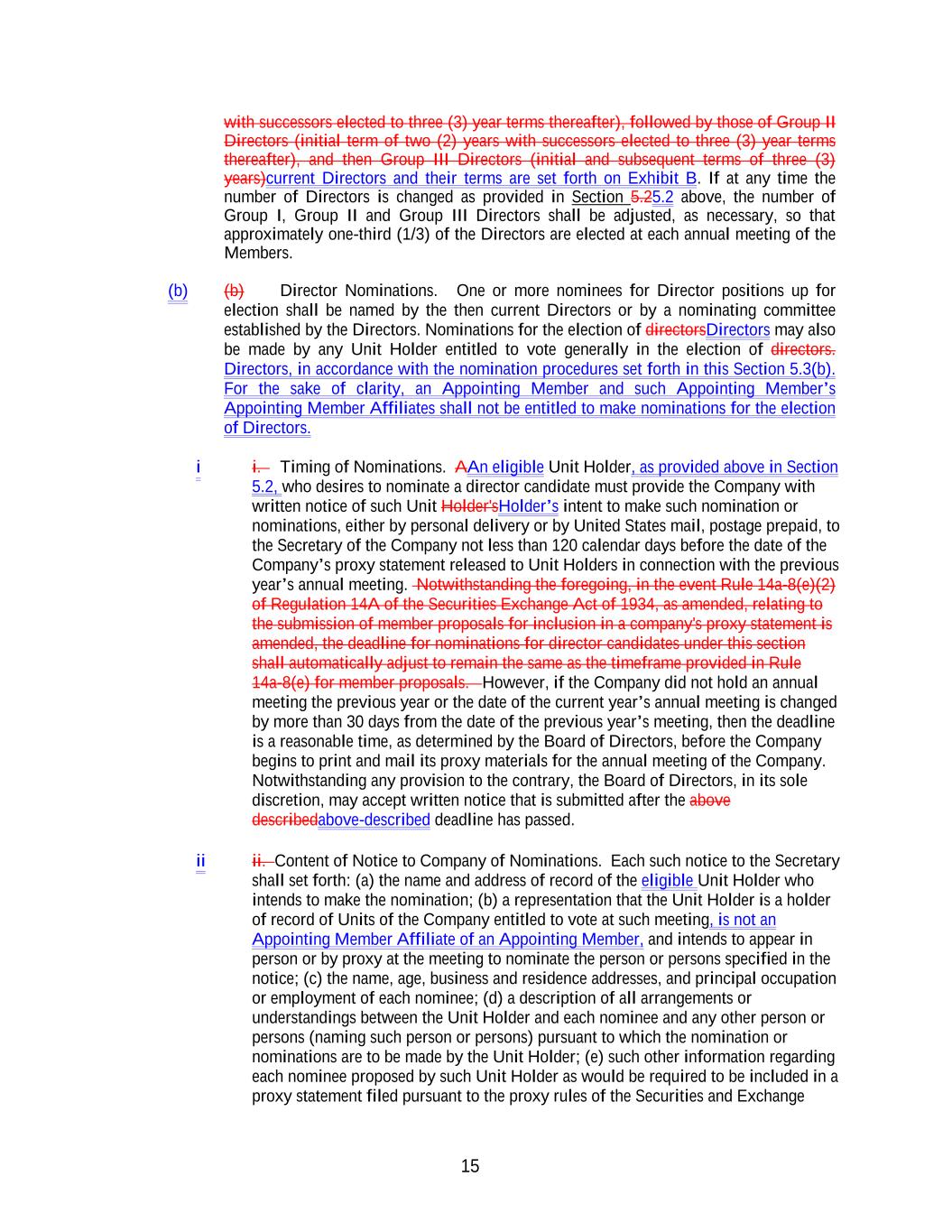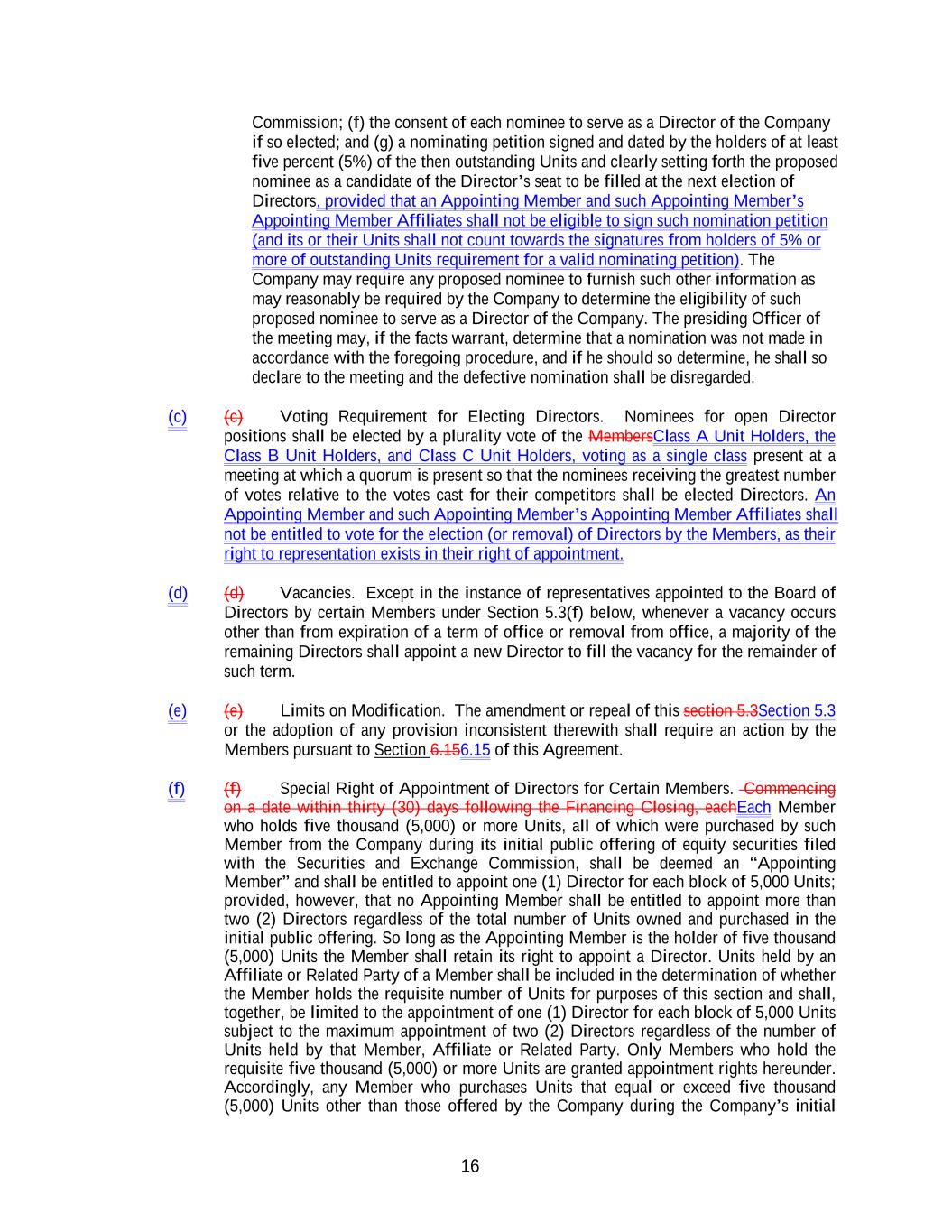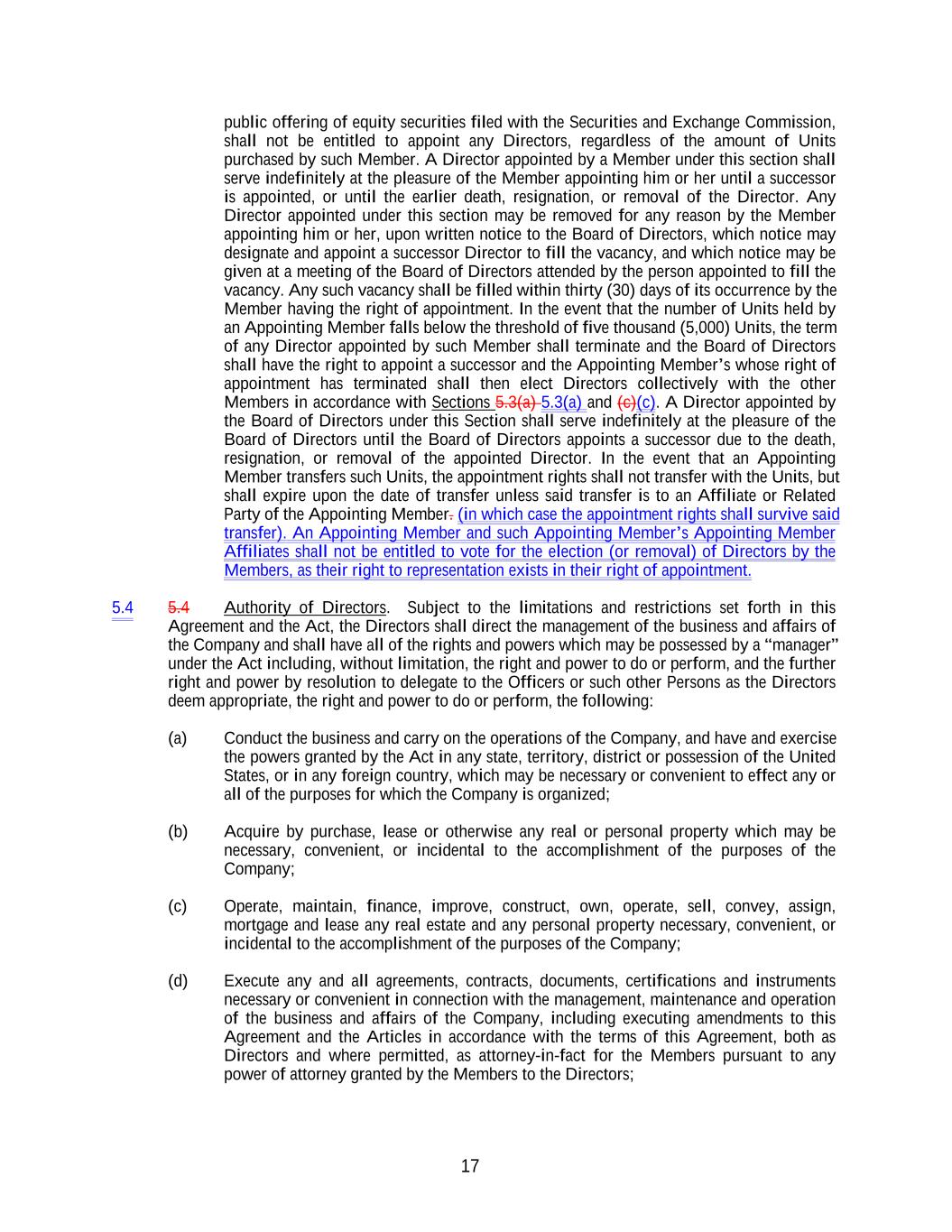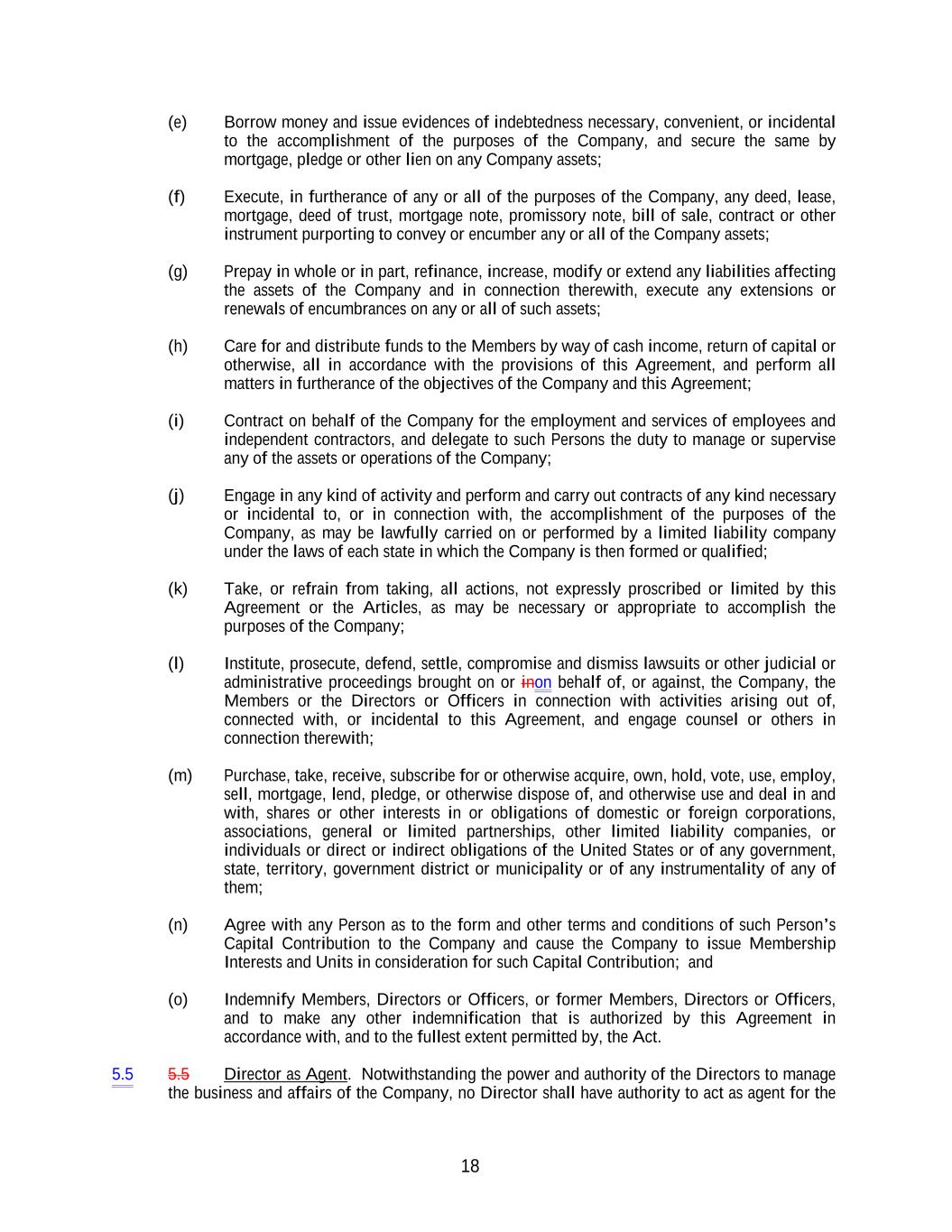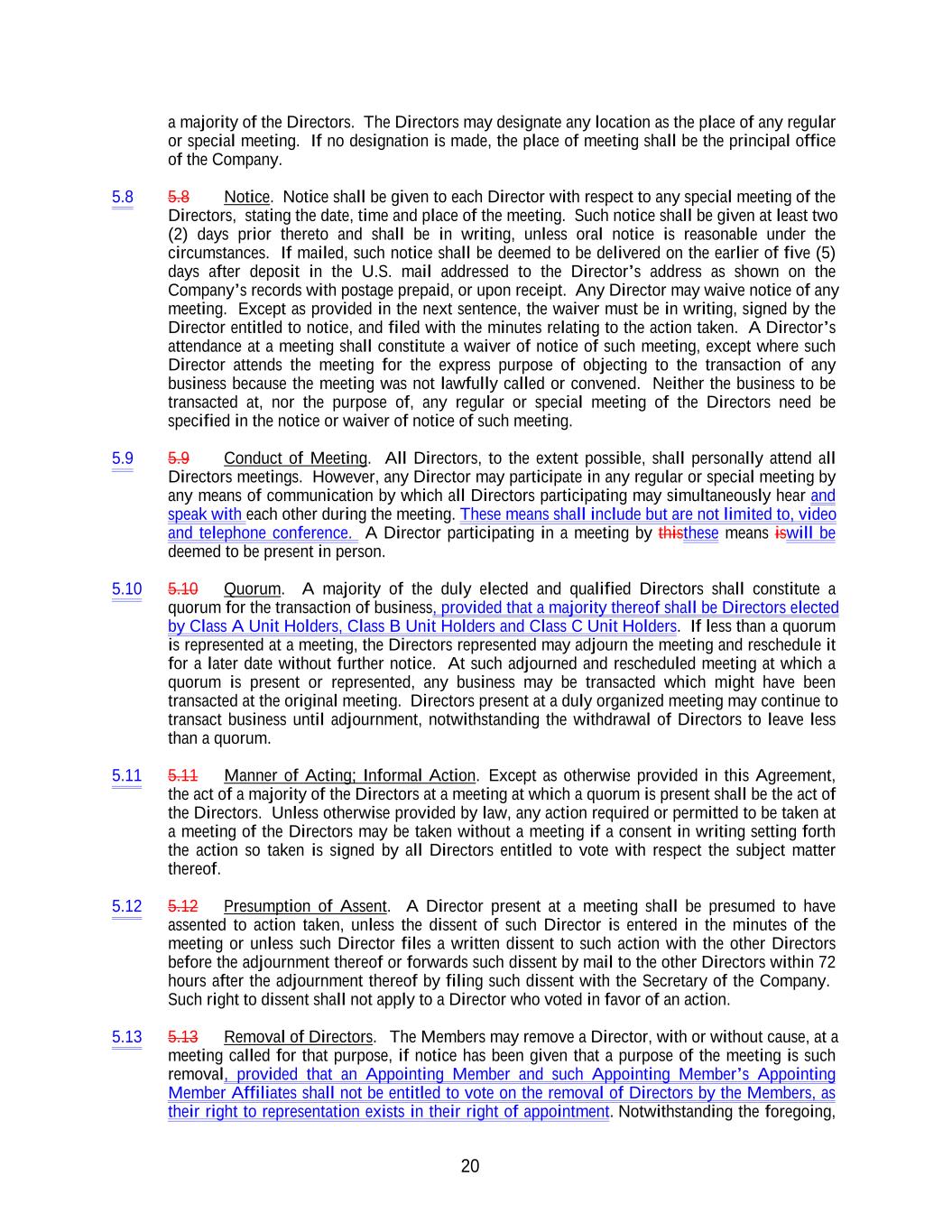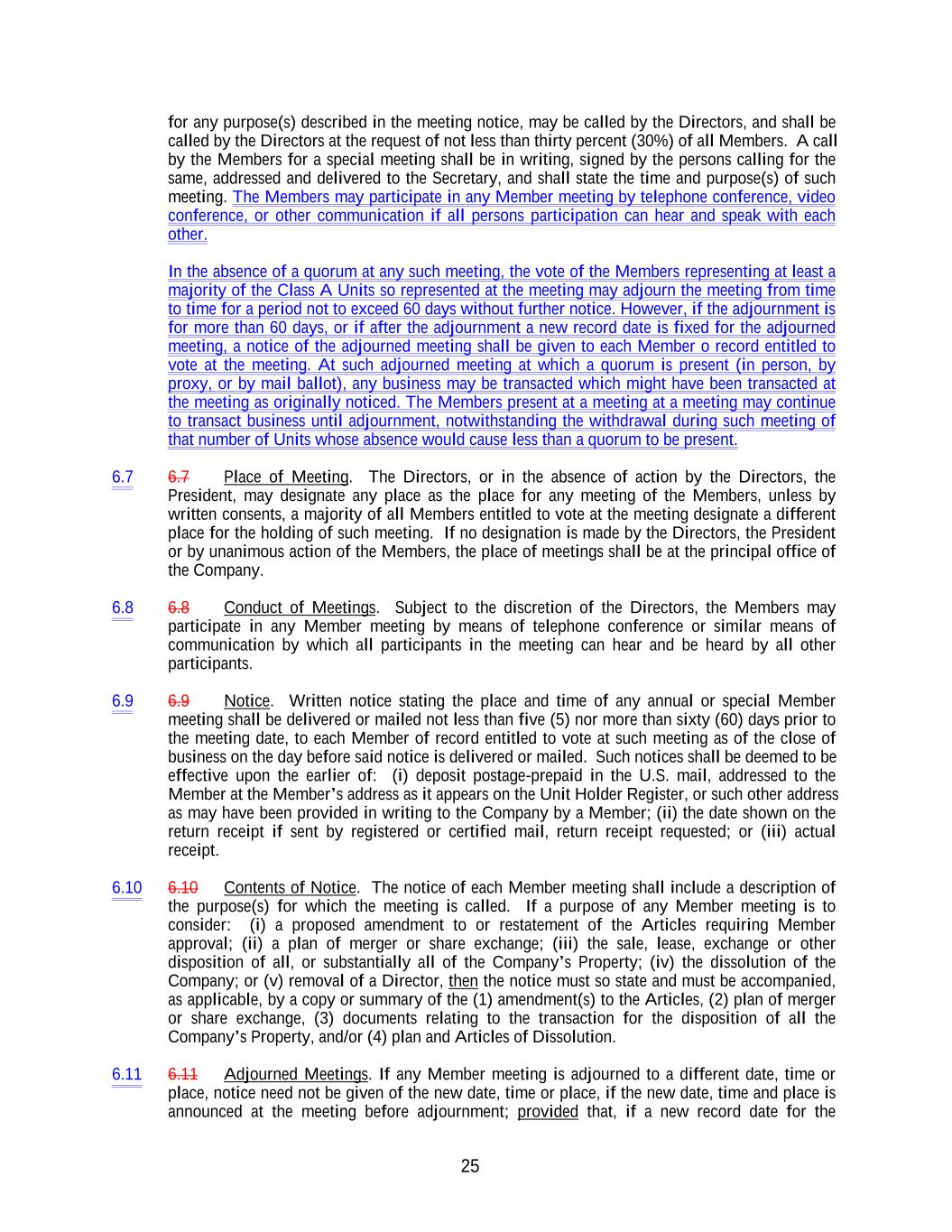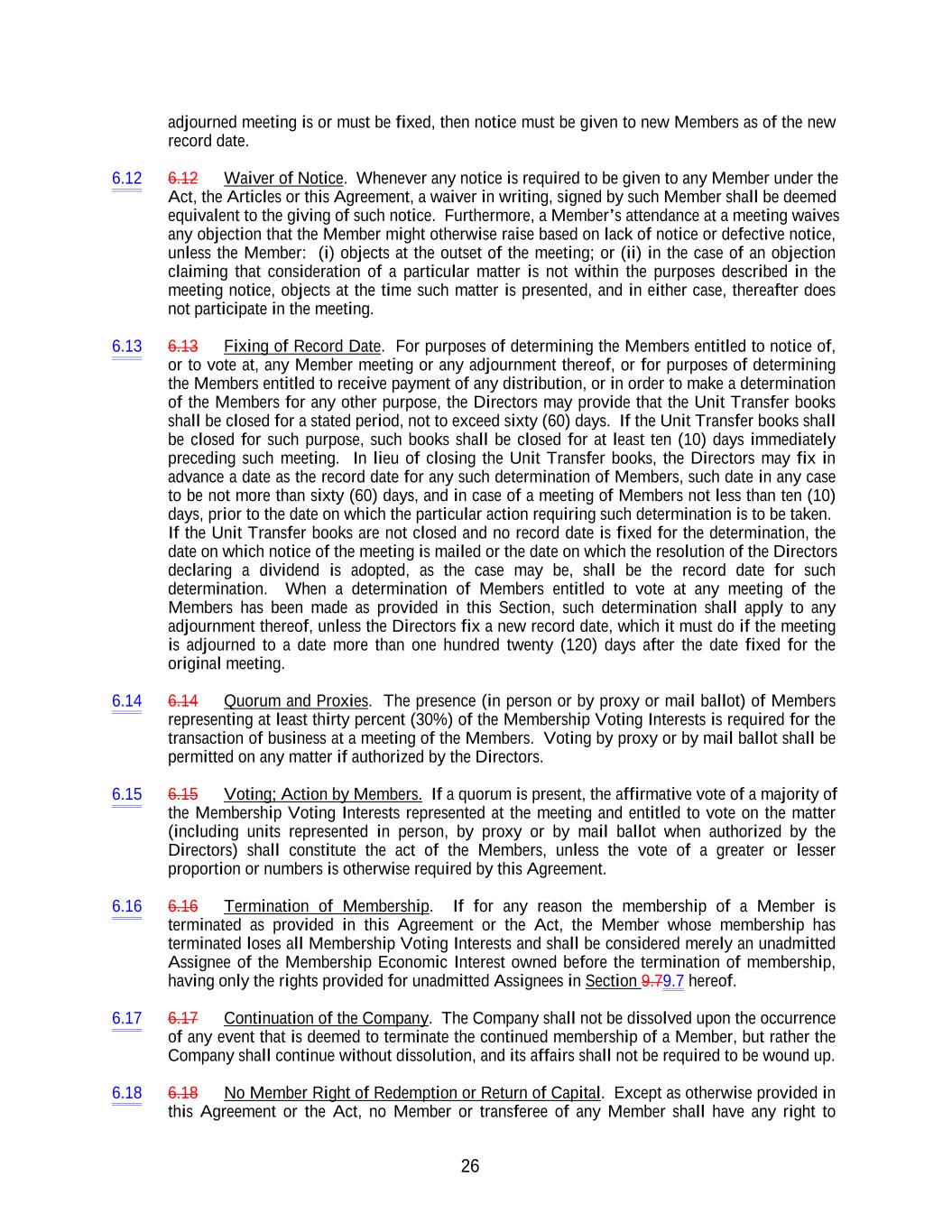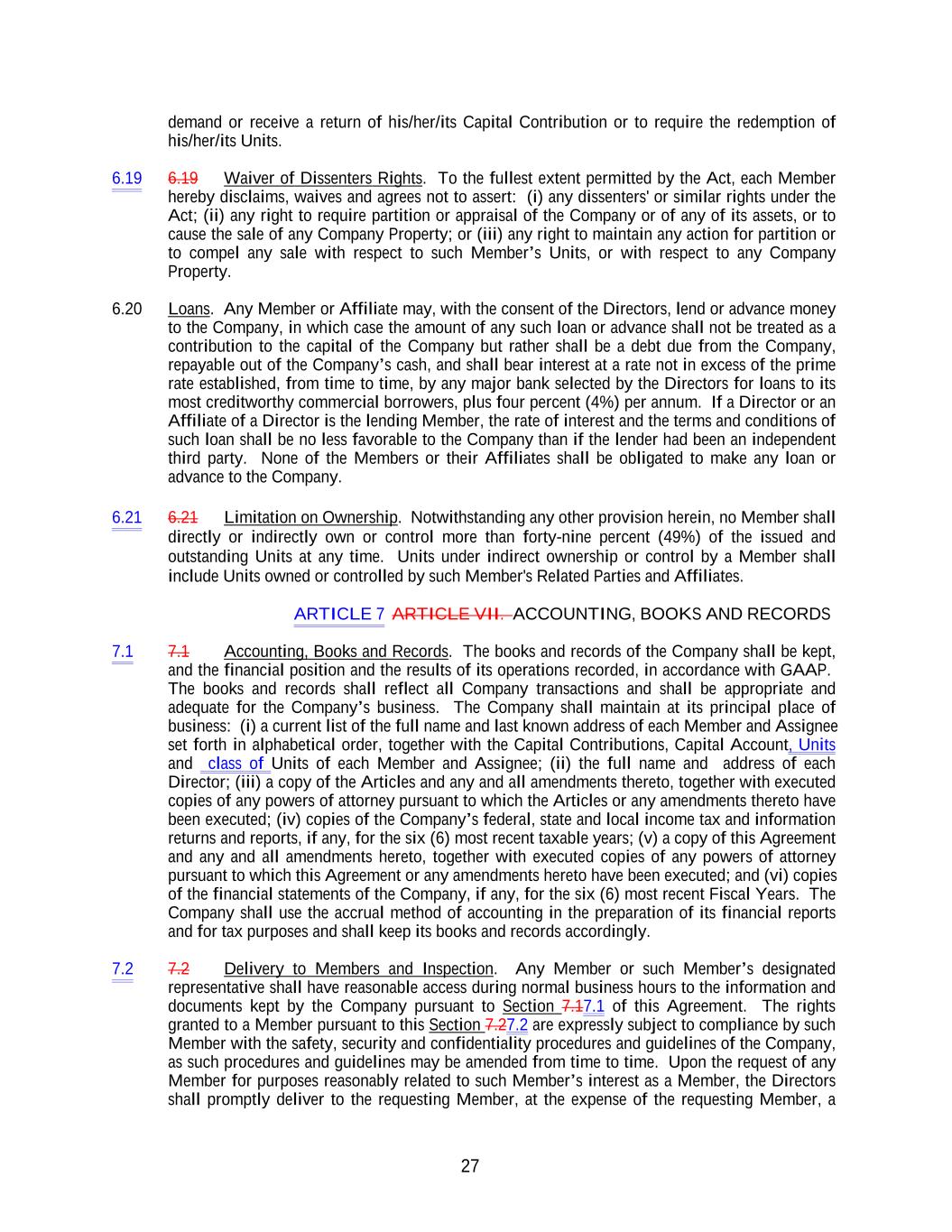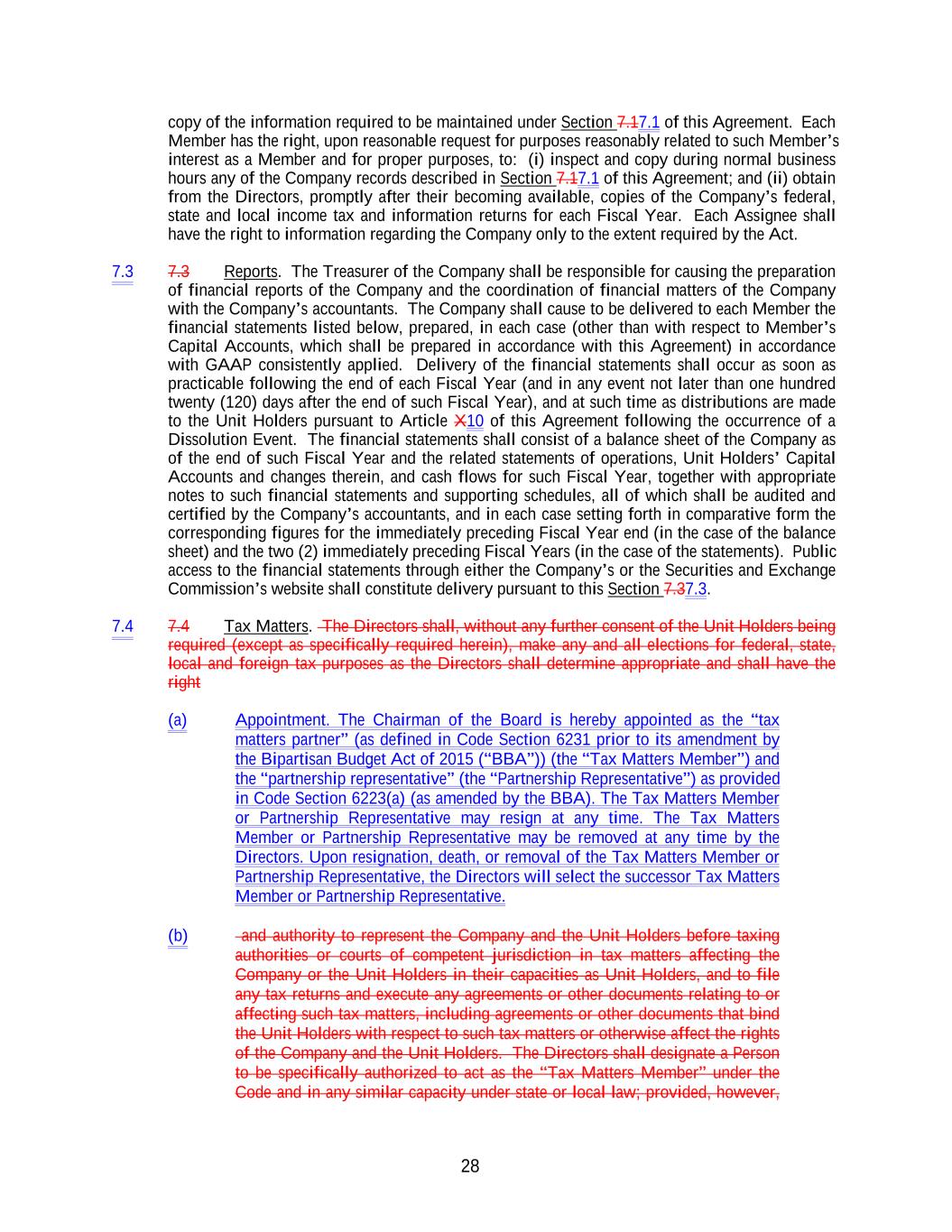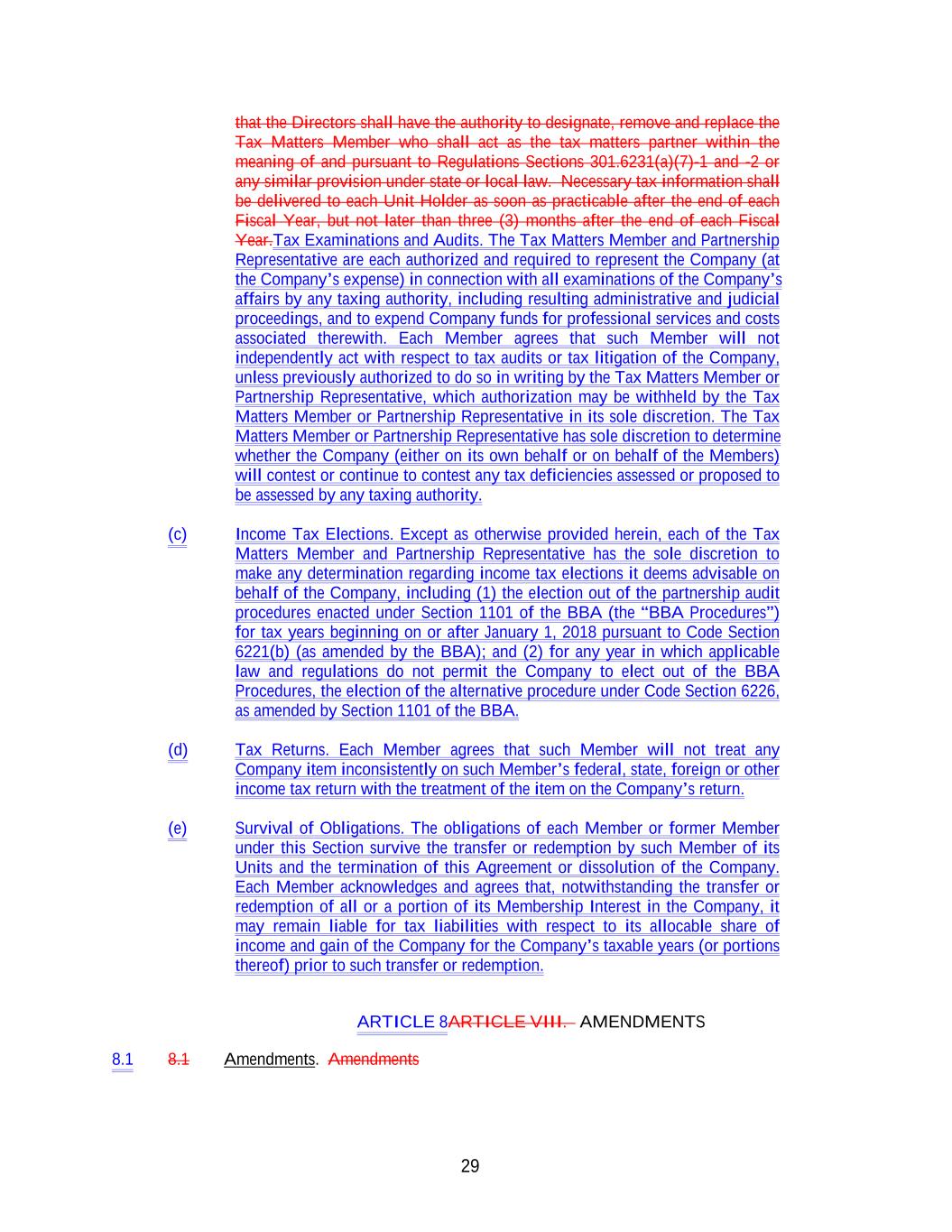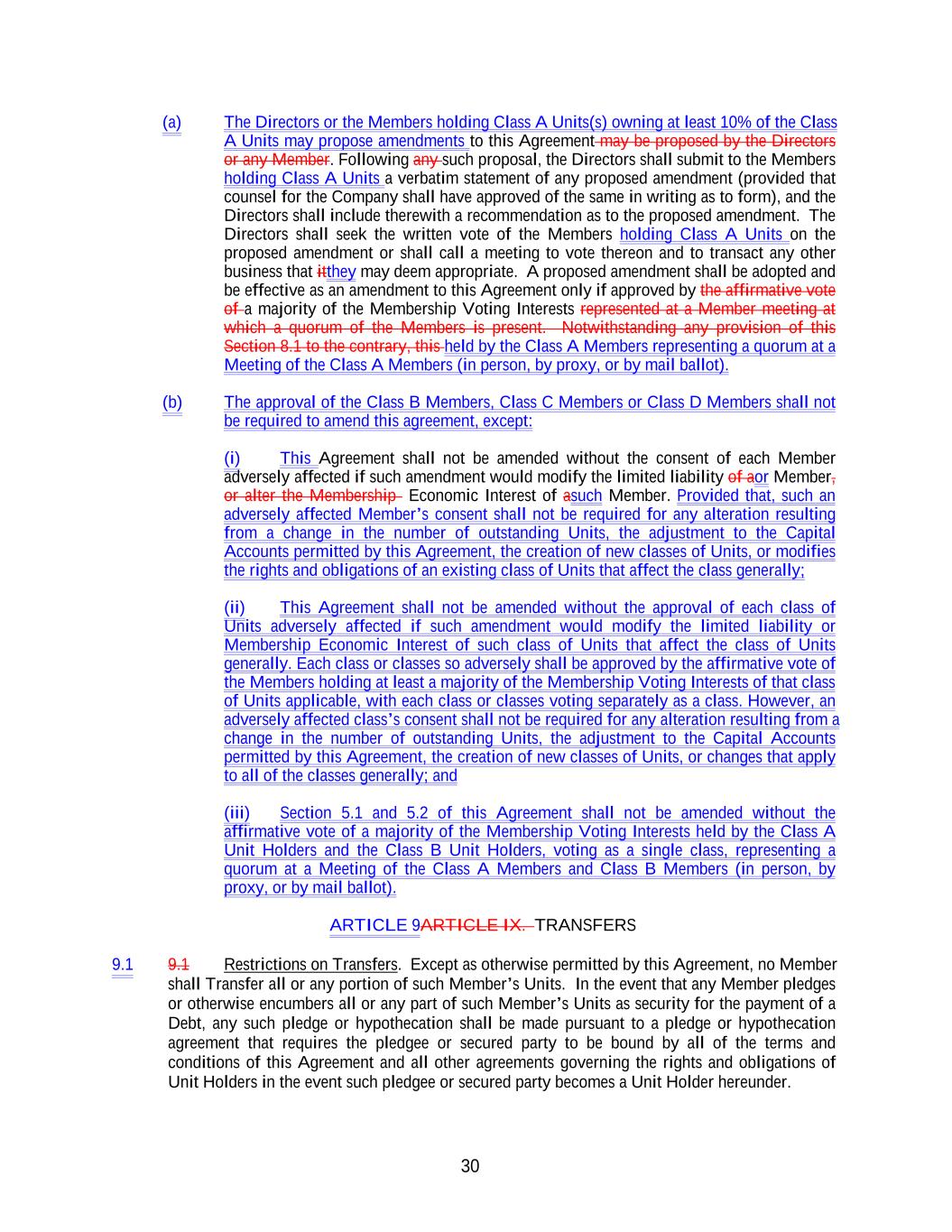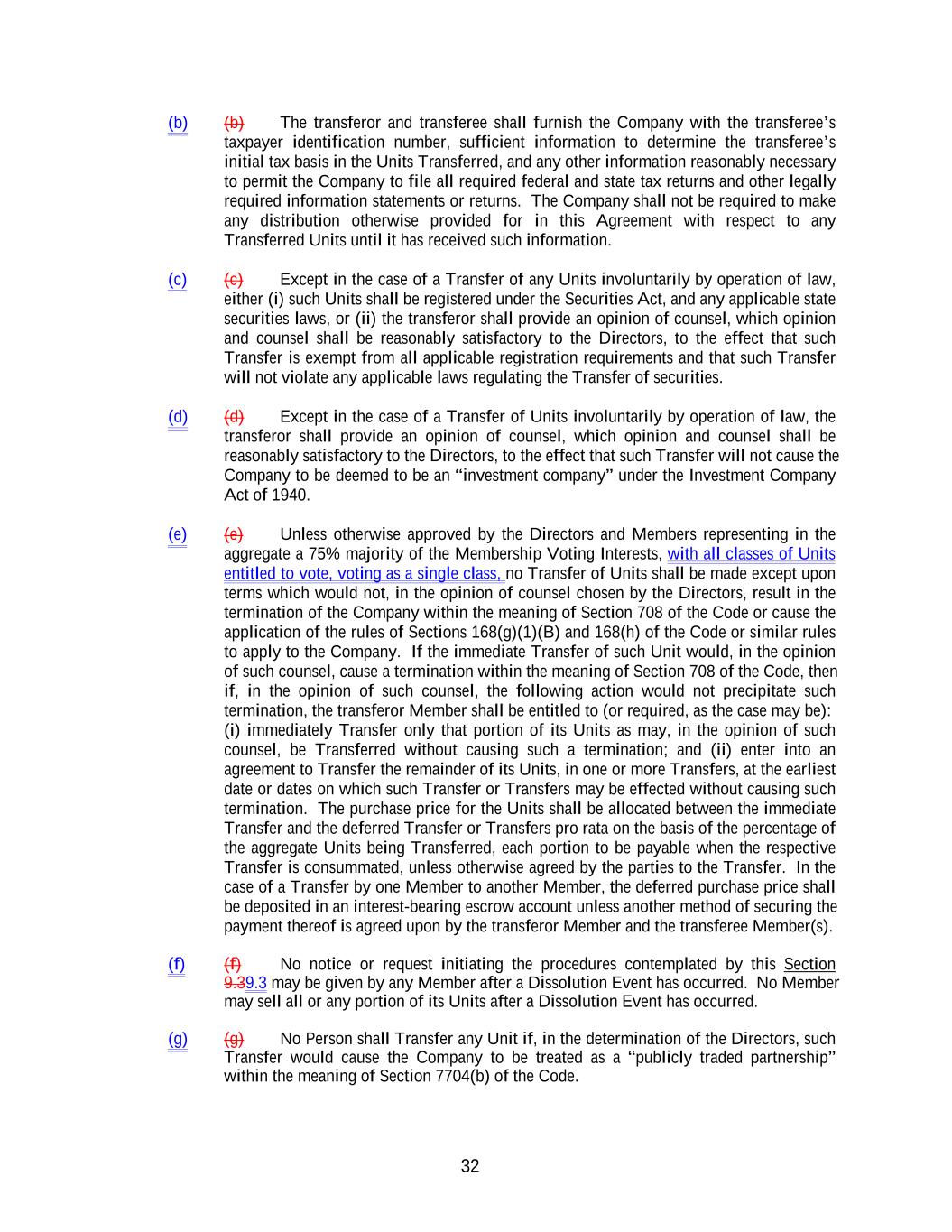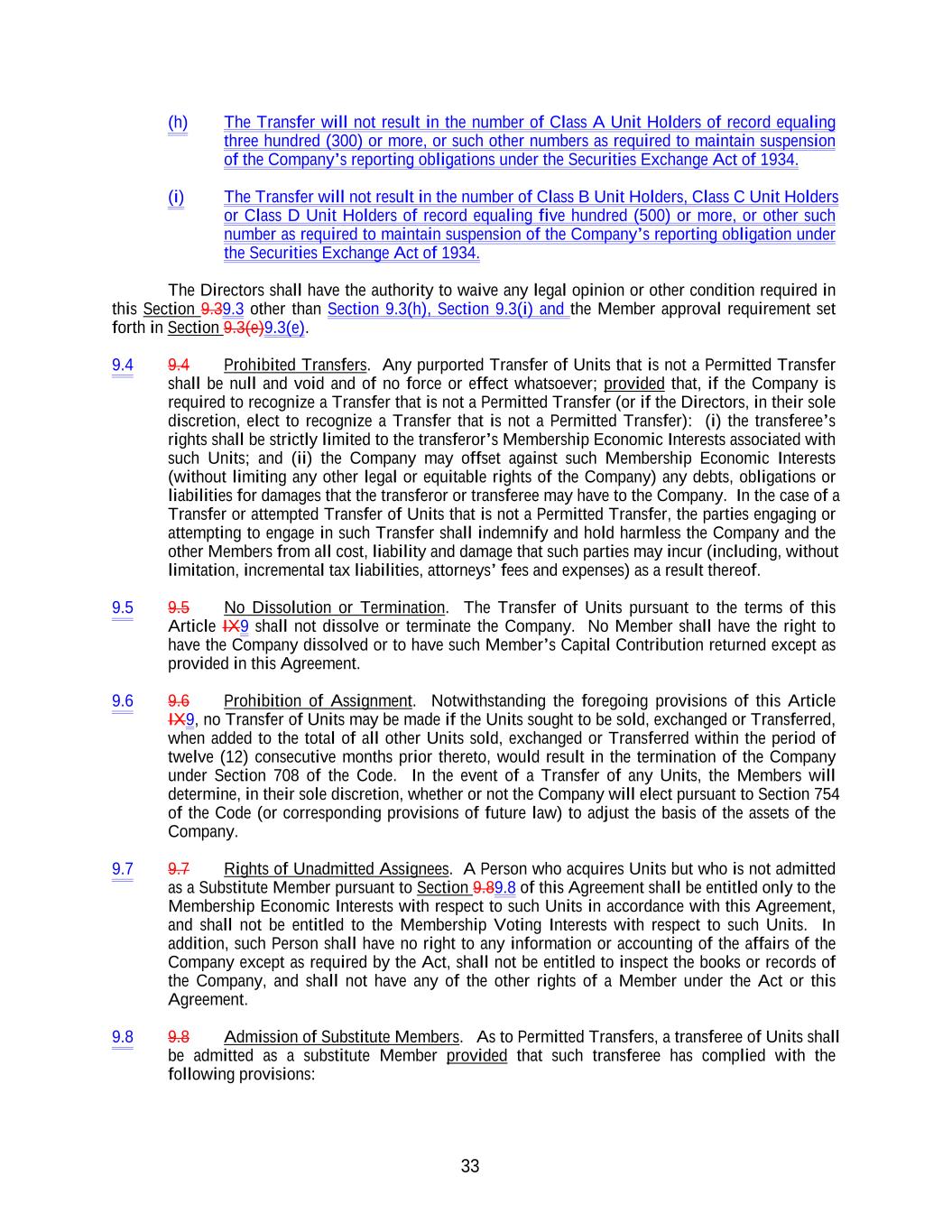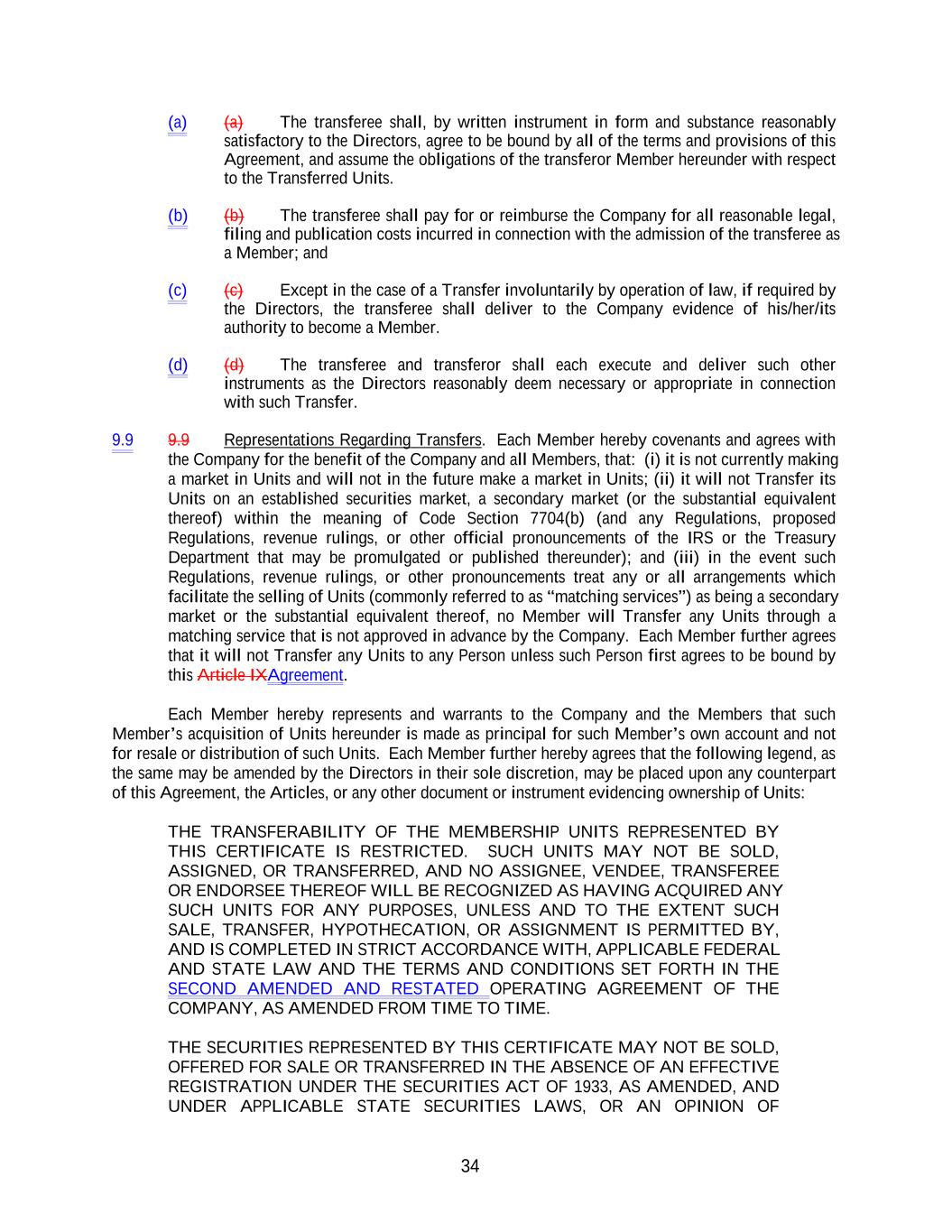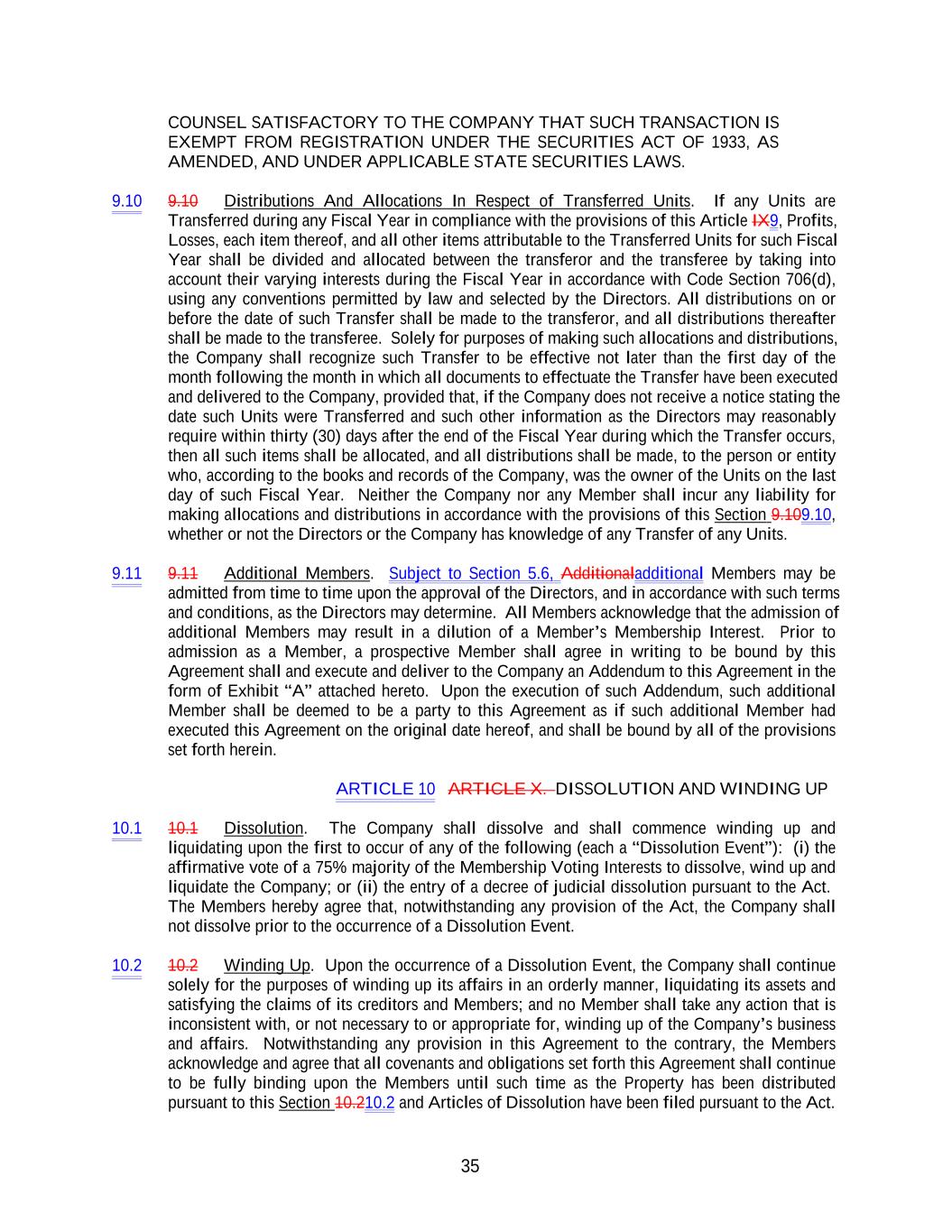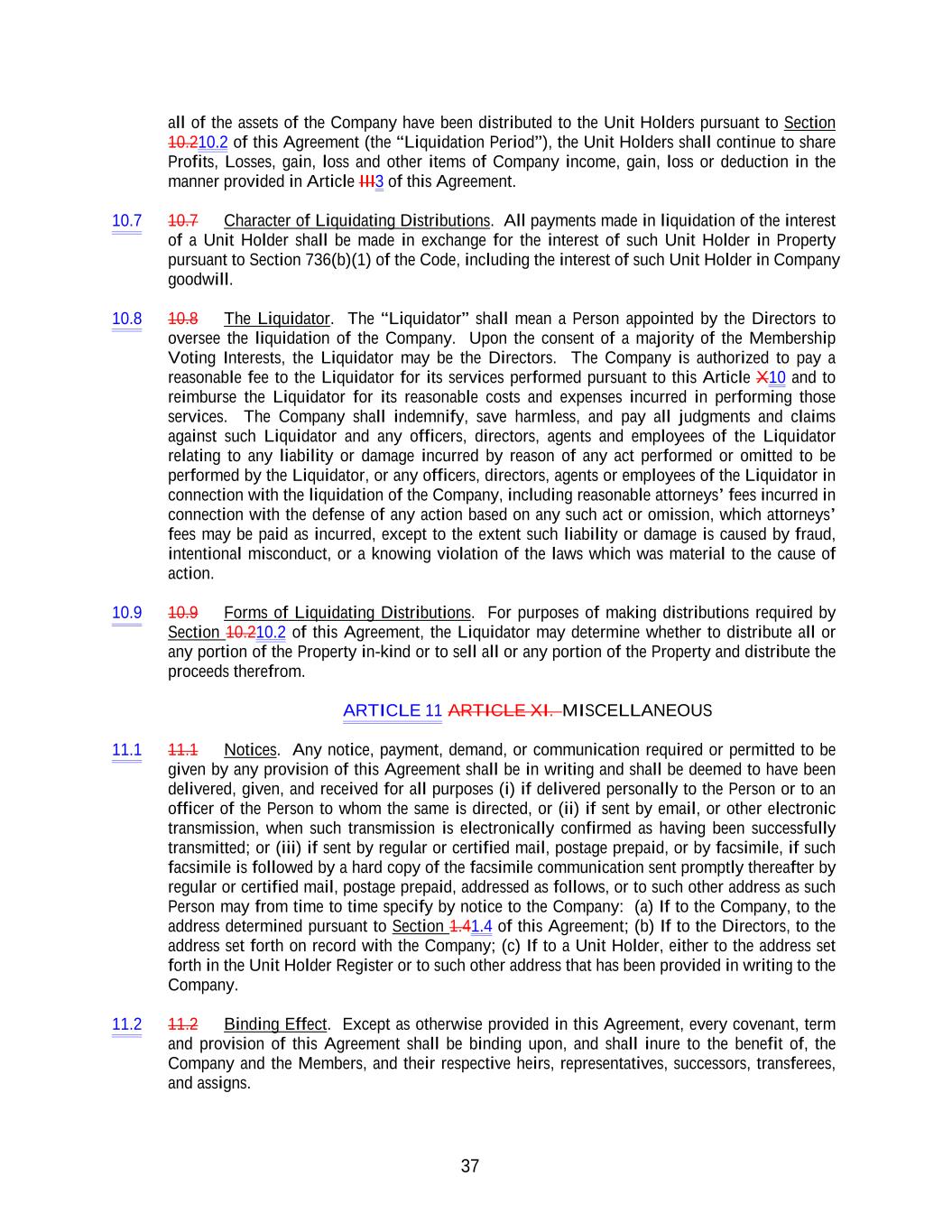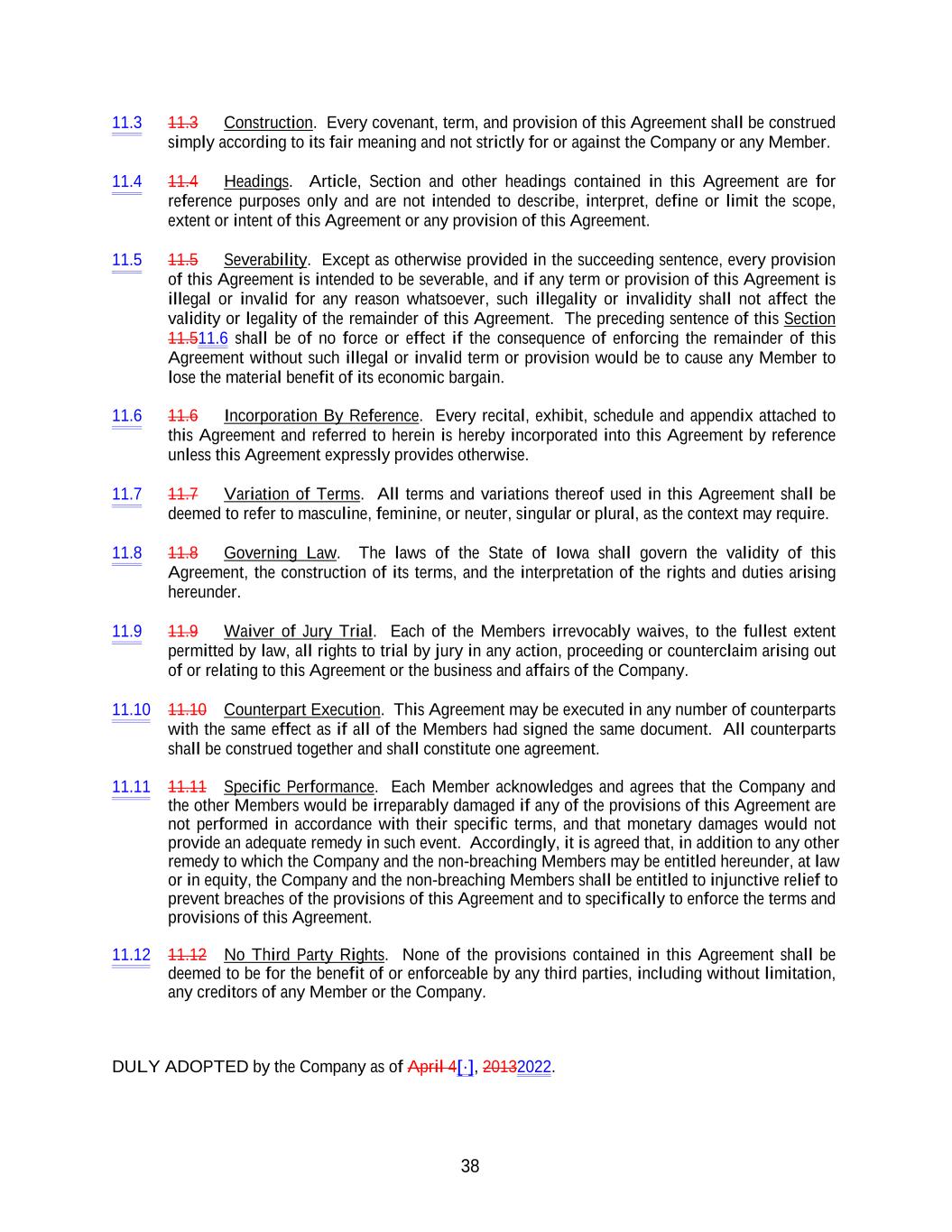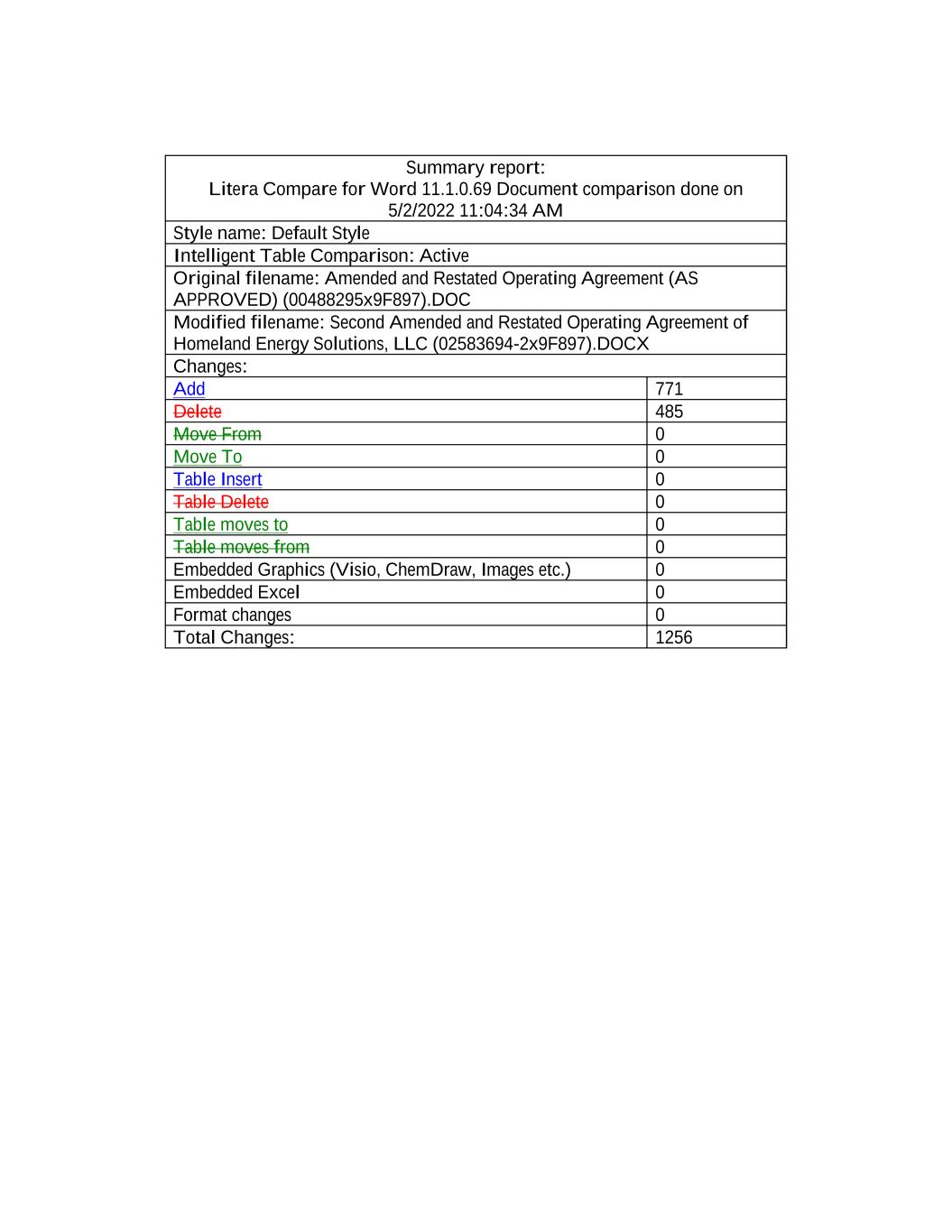| UNITED STATES | ||||||||
| SECURITIES AND EXCHANGE COMMISSION | ||||||||
| Washington, D.C. 20549 | ||||||||
| SCHEDULE 14A INFORMATION | ||||||||
| Proxy Statement Pursuant to Section 14(a) of the Securities Exchange Act of 1934 | ||||||||
Filed by the Registrant x | ||||||||
Filed by a Party other than the Registrant o | ||||||||
| Check the appropriate box: | ||||||||
| o | Preliminary Proxy Statement | |||||||
| o | Confidential, for Use of the Commission Only (as permitted by Rule 14a-6(e)(2)) | |||||||
| x | Definitive Proxy Statement | |||||||
| o | Definitive Additional Materials | |||||||
| o | Soliciting Material under § 240.14a-12 | |||||||
| Homeland Energy Solutions, LLC | ||||||||
| (Name of Registrant as Specified In Its Charter) | ||||||||
| (Name of Person(s) Filing Proxy Statement, if other than the Registrant) | ||||||||
| Payment of Filing Fee (Check the appropriate box): | ||||||||
| x | No fee required. | |||||||
| o | Fee paid previously with preliminary materials. | |||||||
| o | Fee computed on table in exhibit required by Item 25(b) per Exchange Act Rules 14a-6(i)(1) and 0-11. | |||||||
1

NOTICE OF ANNUAL MEETING OF MEMBERS
WEDNESDAY, JUNE 15, 2022
To our Members:
The 2022 annual meeting of members (the "Annual Meeting") of Homeland Energy Solutions, LLC (the “Company”) will be held on Wednesday June 15, 2022, at the Waucoma Event Center, 308 Riverview Drive, Waucoma, Iowa 52171. Registration for the meeting and lunch will begin at 12:00 p.m. The Annual Meeting will follow the lunch, and will commence at approximately 1:00 p.m. The board of directors (the "Board") encourages you to attend the meeting.
IMPORTANT NOTICE REGARDING THE AVAILABILITY OF PROXY MATERIALS FOR THE ANNUAL MEETING TO BE HELD ON WEDNESDAY, JUNE 15, 2022:
◦This communication presents only an overview of the more complete proxy materials that will be available to you on the Internet. We encourage you to access and review all of the important information contained in the proxy materials before voting;
◦The proxy statement, proxy card and annual report to members are available at www.homelandenergysolutions.com under the Investor Information tab; and
◦If you want to receive a paper or e-mail copy of these documents, you must request one. There is no charge to you for requesting a copy. Please make your request for a copy by calling our office at (563) 238-5555 or toll free at (866) 238-7879, by written request to Homeland Energy Solutions, LLC at 2779 Highway 24, Lawler, IA 52154, by e-mail at info@etoh.us, or on our website at www.homelandenergysolutions.com on or before June 6, 2022, to facilitate timely delivery.
The purposes of the meeting are to: (1) Amend and restate the Amended and Restated Operating Agreement of the Company dated April 4, 2013, as amended by the First Amendment to the Amended and Restated Operating Agreement dated December 19, 2013, the Second Amendment to the Amended and Restated Operating Agreement dated April 20, 2017, and the Third Amendment to the Amended and Restated Operating Agreement dated April 12, 2018 (our "Existing Operating Agreement") to provide for four separate and distinct classes of units: Class A, Class B, Class C and Class D Units; (2) Reclassify our units into Class A, Class B, Class C and Class D Units for the purpose of discontinuing the registration of our units under the Securities Act of 1934 ("Exchange Act"); (3) Amend and restate the Existing Operating Agreement to allow the Board to make certain outside investments in companies in which a director has an interest; (4) Adjourn or postpone the Annual Meeting, if necessary or appropriate, for the purpose of soliciting additional proxies if there are not sufficient votes at the time of the Annual Meeting to approve the matters under consideration; and (5) Elect three directors to the Board.
Only members listed on the Company's records at the close of business on May 6, 2022 (the "Record Date") are entitled to notice of the Annual Meeting and to vote at the Annual Meeting and any adjournments thereof. For your proxy card to be valid, it must be RECEIVED by the Company no later than 5:00 p.m. local time on Tuesday, June 14, 2022.
All members are cordially invited to attend the Annual Meeting in person. However, to assure the presence of a quorum, the Board requests that you promptly sign, date and return a proxy card, whether or not you plan to attend the meeting. Proxy cards are available on the Company's website at http://www.homelandenergysolutions.com and may be printed by the members. No personal information is required to print a proxy card. We will be sending you a proxy card approximately 10 days from the date of this letter. If you wish to revoke your proxy at the meeting and execute a new proxy card, you may do so by giving written notice to our CFO Beth Eiler, prior to the commencement of the meeting. You may fax your completed proxy card to the Company at (563) 238-5557 or mail it to the Company at 2779 Highway 24, Lawler, IA 52154.
By order of the Board of Directors,
/s/ Leslie Hansen
Chairman of the Board
Lawler, Iowa, May 6, 2022
2
TABLE OF CONTENTS
| Exhibit 99.1 | AMENDED AND RESTATED OPERATING AGREEMENT OF HOMELAND ENERGY SOLUTIONS, LLC AND AMENDMENTS THERETO (THE "EXISTING OPERATING AGREEMENT") | ||||
| Exhibit 99.2 | SECOND AMENDED AND RESTATED OPERATING AGREEMENT OF HOMELAND ENERGY SOLUTIONS, LLC (THE "PROPOSED OPERATING AGREEMENT") | ||||
| Exhibit 99.3 | REDLINE BETWEEN THE EXISTING OPERATING AGREEMENT AND THE PROPOSED OPERATING AGREEMENT | ||||
| FORM OF PROXY CARD | |||||
| FORM TRANSMITTAL LETTER | |||||
3

Homeland Energy Solutions, LLC
2779 Highway 24
Lawler, Iowa 52154
Proxy Statement
2022 Annual Meeting of Members
Wednesday, June 15, 2022
ABOUT THE ANNUAL MEETING
This proxy solicitation is being made by Homeland Energy Solutions, LLC (the "Company"). The proxy statement and proxy card were prepared by the board of directors (the "Board") of the Company for use at the annual meeting of members of the Company to be held on Wednesday, June 15, 2022 (the "Annual Meeting"), and at any adjournment or postponement thereof. The Annual Meeting will be held at Waucoma Event Center, 308 Riverview Drive, Waucoma, Iowa 52171. Registration for the meeting and lunch will begin at 12:00 p.m. The Annual Meeting will follow the lunch, and will commence at approximately 1:00 p.m. Distribution of the definitive proxy statement and the proxy card is scheduled to begin on or about May 6, 2022. This solicitation is being made according to the SEC's Internet availability of proxy materials rules, however the Company may also use its officers, directors, and employees (without providing them with additional compensation) to solicit proxies from members in person or by telephone, email, facsimile or letter.
In this proxy statement, “Homeland” “HES,” “we,” “our,” “ours,” “us” and the “Company” refer to Homeland Energy Solutions, LLC, an Iowa limited liability company.
“Reclassification” refers to the reclassification of certain of our registered units into three newly-created classes: Class B, Class C, and Class D; the outstanding units that are not reclassified will remain in our existing class, which is currently titled "Units", but will be renamed "Class A" in the reclassification, though there will be no substantive changes to the rights of this class. As a result, following the Reclassification (if completed), we would have four classes of units: Class A, Class B, Class C, and Class D. References to our “units” generally refers to our currently outstanding membership units; certain of these outstanding units will be renamed as Class A Units, and certain of these outstanding units will be reclassified as Class B, Class C or Class D Units if the Reclassification is consummated.
Date, Time and Place of the Annual Meeting
The Board is asking for your proxy for use at the Annual Meeting on Wednesday, June 15, 2022 at 1:00 p.m., at the Waucoma Event Center, 308 Riverview Drive, Waucoma, Iowa 52171, and at any adjournments or postponements of that meeting. Registration for the meeting begins at 12:00 p.m.
Proposals to be Considered at the Annual Meeting
The Board has authorized, and unanimously recommends for your approval at the Annual Meeting, the following matters:
| Item | Description | Board Voting Recommendation | ||||||
| No. 1 | Approval of the Second Amended and Restated Operating Agreement (the “Proposed Operating Agreement”) | FOR | ||||||
| No. 2 | Reclassification of the Company's Units | FOR | ||||||
| No. 3 | Amend and Restate the Amended and Restated Operating Agreement to allow for certain outside investments. | FOR | ||||||
4
| No. 4 | Adjournment or Postponement of the Annual Meeting | FOR | ||||||
| No. 5 | Election of three (3) directors | FOR each incumbent director nominee | ||||||
Our members will vote on these matters separately. If Proposals one (1) and two (2) are not both approved, but Proposal one (1) or Proposal two (2) is approved, individually, the Board will not implement either:
•the amendment to our Second Amended and Restated Operating Agreement;
•the Reclassification; or
•or the terms and conditions of the Proposed Operating Agreement related to Proposal two (2).
However, if Proposal three (3) is approved, the Board may independently implement this change to the Existing Operating Agreement.
Our Board will have the discretion to determine if and when to effect the Proposed Operating Agreement, including the Reclassification, and reserves the right to abandon the Proposed Operating Agreement and the Reclassification, even if approved by the members. For example, if the number of record holders of Units changes such that the Reclassification would no longer accomplish our intended goal of discontinuing our reporting obligations owed to the Securities and Exchange Commission (the "SEC"), our Board may determine not to effect the Reclassification.
Our Directors are asking separately for the vote to amend and restate our Second Amended and Restated Operating Agreement (Proposal 1) and the approval of the Reclassification of Units (Proposal 2), even though the Reclassification could be effected solely through the approval of Proposal 1. The Directors believe that the Reclassification is an important unit holder matter and deserves separate and distinct attention, given the impacts on our unit holders. The Directors, in the interest of fairness, want to make it explicitly clear the impacts that the Proposed Operating Agreement will have on the Company. The Proposed Operating Agreement and the Reclassification are conditioned on one another, unless the unit holders vote in favor of both proposals, both will fail. For more information on the effect of the Reclassification of your units, please see the Section entitled "Effects of the Reclassification on Unit Holders of HES."
We expect that if our members approve the Reclassification and Proposed Operating Agreement and our Board elects to effect the Proposed Operating Agreement, the Reclassification will become effective on July 1, 2022.
No member proposals will be able to be made or acted upon at the Annual Meeting, and no member action will otherwise be able to be taken at the Annual Meeting, other than voting on the above proposals.
Availability of Proxy Materials
The Company's annual report to the SEC on Form 10-K, including the financial statements and the notes thereto, for the fiscal year ended December 31, 2021, accompanies this proxy statement.
These proxy materials are being delivered pursuant to the Internet Availability of Proxy Materials rules promulgated by the SEC. The Company will provide each member solicited a printed or e-mail copy of the Proxy Statement, Proxy Card and Annual Report on Form 10-K without charge within three business days of receiving a written request. Members should direct any requests for a printed or e-mail copy of the proxy materials as follows: (i) by calling our office at (563) 238-5555 or toll free at (866) 238-7879; (ii) by written request to Homeland Energy Solutions, LLC at 2779 Highway 24, Lawler, Iowa 52154; (iii) by e-mail at info@etoh.us; or (iv) on our website at www.homelandenergysolutions.com on or before June 6, 2022, to facilitate timely delivery.
The Securities and Exchange Commission has approved a rule governing the delivery of annual disclosure documents. The rule allows the Company to send a single Notice of Internet Availability of Proxy Materials to any household at which two or more members reside unless the Company has received contrary instructions from one or more member(s). This practice, known as "householding," is designed to eliminate duplicate mailings, conserve natural resources and reduce printing and mailing costs. Each member will continue to receive a separate proxy card. If you wish to receive a separate Notice of Internet Availability of Proxy Materials than that sent to your household, either this year or in the future, you may contact the Company by telephone at (563) 238-5555; by e-mail at info@etoh.us; or by written request at Homeland Energy Solutions, LLC at 2779 Highway 24, Lawler, Iowa 52154 and the Company will promptly send you a separate Notice of Internet Availability of Proxy Materials. If members of your household receive multiple copies of our Notice of Internet Availability of Proxy Materials, you may request householding by contacting the Company by telephone at (563) 238-5555 or by written request to Homeland Energy Solutions, LLC at 2779 Highway 24, Lawler, Iowa 52154.
Record Date
5
Only members of record on the Record Date are entitled to notice of, and to vote at, the Annual Meeting. You may vote at the Annual Meeting if you were the record owner of Units of the Company at the close of business on May 6, 2022, which is the Record Date. At the close of business on the Record Date, 64,560 Units were issued and outstanding and held by approximately 1,269 unit holders of record. If you are a holder of Units of the Company, you are entitled to one vote on each proposal considered and voted upon at the Annual Meeting for each Unit you held of record at the close of business on the Record Date.
Quorum; Vote Required for Approval
Pursuant to Section 6.6 of our Existing Operating Agreement, members holding at least 30% of the outstanding units will constitute a quorum of the members for the Annual Meeting. Since we had 64,560 Units outstanding and entitled to vote as of the Record Date, an aggregate of at least 19,368 Units need to be represented at the Annual Meeting in order for there to be a quorum.
Approval of the Proposed Existing Operating Agreement, including the provisions to effect the Reclassification, requires the affirmative vote of a majority of the outstanding Units, represented at the Annual Meeting where quorum is present and entitled to vote.
Our Directors are asking separately for the vote to amend and restate our Second Amended and Restated Operating Agreement (Proposal 1) and the approval of the Reclassification of Units (Proposal 2), even though the Reclassification could be effected solely through the approval of Proposal 1. The Directors believe that the Reclassification is an important unit holder matter and deserves separate and distinct attention, given the impacts on our unit holders. The Directors, in the interest of fairness, want to make it explicitly clear the impacts that the Proposed Operating Agreement will have on the Company. The Proposed Operating Agreement and the Reclassification are conditioned on one another, unless the unit holders vote in favor of both proposals, both will fail. For more information on the effect of the Reclassification of your units, please see the Section entitled "Effects of the Reclassification on Unit Holders of HES." However, if Proposal three (3) is approved, the Board may independently implement this change to the Existing Operating Agreement.
Abstentions or proxies or ballots marked to “withhold authority” will be counted for purposes of determining the presence or absence of a quorum for the transaction of business but will not be counted as votes cast for or against the proposals to be voted upon at the Annual Meeting.
If a quorum is not present at the time and place scheduled for the Annual Meeting, the members present at that time may adjourn and/or postpone the Annual Meeting to a later date in order to give the Board additional time to solicit proxies for use at the Annual Meeting. The proposal to adjourn or postpone the Annual Meeting must be approved by the holders of at least a majority of the Units represented at the Annual Meeting (even if a quorum is not present) in order for the meeting to be validly postponed or adjourned to solicit additional proxies or for other purposes.
Voting and Revocation of Proxies
You may vote your Units in person by attending the Annual Meeting, or by mailing us your completed proxy. You must return your proxy card to the Company, which must be received no later than 5:00 p.m. on June 14, 2022 for your vote to be valid. If a proxy card is submitted by mail without instructions as to the five proposals, the proxies will be voted “FOR” Proposal one (1) to approve the Second Amended and Restated Operating Agreement; “FOR” Proposal two (2) of the Reclassification of the Company's Units; “FOR” Proposal three (3) to amend and restate the Amended and Restated Operating Agreement to allow for Certain Outside Investments; “FOR” Proposal four (4) Adjournment or Postponement; and “FOR” the election of the three (3) incumbent Directors, Nick Bowdish, Patrick Boyle and Chad Kuhlers.
A member who returns a proxy card to the Company before the Annual Meeting but wants to change the member's vote, can do so at any time by (i) delivering a written revocation and/or completing and delivering a new proxy card to the Company's CFO, Beth Eiler, at the Company's principal office at 2779 Highway 24, Lawler, Iowa 52154 which is RECEIVED prior to the start of the Annual Meeting, or (ii) attending the Annual Meeting and delivering a written revocation to the Company's CFO, Beth Eiler, at the commencement of the Annual Meeting.
If your Units are held in the name of your brokerage firm, bank, fiduciary, trustee, custodian or other nominee, you are considered the beneficial owner of Units held in your name. If you are the beneficial owner of your Units and not the holder of record, you will need to contact your brokerage firm, bank, fiduciary, trustee, custodian or other nominee to revoke any prior voting instructions or bring with you a legal proxy from your brokerage firm, bank, fiduciary, trustee, custodian or other nominee authorizing you to vote the Units.
6
Solicitation of Proxies; Expenses of Solicitation
The proxy materials are being provided to you by the Company and proxies will be solicited on behalf of the Company by our directors, officers and employees. The original solicitation of proxies will be made primarily by mail, and may be supplemented by solicitations by our directors, officers and employees by telephone, electronic or other means to request members return their proxy cards or attend the Annual Meeting. No additional compensation for these services will be paid to our directors, officers and employees, but will be reimbursed for any transaction expenses they incurred.
The Company will bear the expenses in connection with this solicitation of proxies. Copies of the proxy materials and any other solicitation materials will be provided to brokerage firms, banks, fiduciaries, trustees, custodians or other nominees holding Units in their names that are beneficially owned by others so that they may forward the solicitation materials to such beneficial owners. We will reimburse brokerage firms, banks, fiduciaries, trustees, custodians or other nominees, for the reasonable out-of-pocket expenses incurred by them in connection with forwarding the proxy materials or any other solicitation materials. The Company has not employed any third party to solicit proxies for the Annual Meeting.
We are mailing the Notice of Internet Availability of Proxy Materials and making the proxy materials available to our members on or about May 6, 2022.
Authority to Adjourn the Annual Meeting to Solicit Additional Proxies
We are also asking our members to grant full authority for the Annual Meeting to be adjourned, if necessary or desirable, for the purpose, of soliciting additional proxies to approve the proposals presented in this proxy statement.
The approval of the Adjournment or Postponement Proposal (Proposal 4) requires the affirmative vote of a majority of the outstanding Units, represented at the Annual Meeting, even where a quorum is not present.
QUESTIONS AND ANSWERS ABOUT THE RECLASSIFICATION
This summary provides an overview of material information about the proposed Reclassification and the proposed amendments to the Amended and Restated Operating Agreement, as amended, by adopting the proposed Second Amended and Restated Operating Agreement. However, it is a summary only. To better understand the Reclassification and for a more complete description of its terms, we encourage you to carefully read this entire document and the documents to which it refers before voting.
Q: What is the Reclassification?
A: We are proposing that our members amend our Amended and Restated Operating Agreement dated April 4, 2013, as amended by the First Amendment to the Amended and Restated Operating Agreement dated December 19, 2013, the Second Amendment to the Amended and Restated Operating Agreement dated April 20, 2017, and the Third Amendment to the Amended and Restated Operating Agreement dated April 12, 2018 (our “Existing Operating Agreement”) by adopting the proposed Second Amended and Restated Operating Agreement (the “Proposed Operating Agreement”). If the Proposed Operating Agreement is adopted, it will, among other things, provide for four separate classes of units: Class A, Class B, Class C, and Class D Units. Certain of our outstanding Units will be renamed as Class A Units and certain of our outstanding Units will be reclassified on the basis of one Class B, Class C, or Class D Unit for each Unit currently held, as follows:
◦Holders of 60 or more of our Units will have their Units renamed Class A Units;
◦Holders of between 26 and 59 of our Units will have their Units reclassified into Class B Units;
◦Holders of exactly 25 of our Units will have their Units reclassified into Class C Units; and
◦Holders of less than 25 of our Units will have their Units reclassified into Class D Units.
The adoption of the Proposed Operating Agreement and the Reclassification must both be approved to effect the Reclassification. For more information about the terms of the Reclassification and the Proposed Operating Agreement, please refer to “SPECIAL FACTORS RELATED TO THE RECLASSIFICATION” and “THE SECOND AMENDED AND RESTATED OPERATING AGREEMENT.”
Neither the SEC nor any state securities commission has approved or disapproved the Proposed Operating Agreement or the Reclassification, passed upon the merits or fairness of the Reclassification or upon the adequacy or accuracy of the disclosure in this document. Any representation to the contrary is a criminal offense.
Q: What is the purpose and structure of the Reclassification?
A: The purpose of the Reclassification is to allow us to suspend our SEC reporting obligations (known as a “going private transaction” or "going private"). The primary effect of the Reclassification will be to reduce the total number of unit holders of record of our current class of registered Units to below 300 unit holders by reclassifying our current Units as Class A, Class B, Class C or Class D Units. This will allow us to suspend our registration under the Exchange Act and relieve us of the
7
costs of preparing and filing public reports and other documents. It will also allow our management and employees to shift time spent on complying with SEC reporting obligations to our operational and business goals.
The Reclassification is being effected at the unit holder level. This means that we use the number of Units registered in the name of each holder to determine how that holder’s Units will be reclassified. On May 6, 2022, the Company sent a letter to its members notifying them that they had until June 10, 2022 to make transfers of Units before the Reclassification. The purpose of this letter was to allow our members the opportunity to make transfers (subject to our Existing Operating Agreement and applicable laws) before the Reclassification so that they could own the requisite number of Units to be in their desired class. We have restricted transfers after June 10, 2022 to allow the Company to determine the number of Class A, Class B, Class C, and Class D members that would result from the Reclassification before providing our members with proxy materials.
Q: What will be the effects of the Reclassification?
A: The Reclassification is a “going private transaction,” meaning that it will allow us to deregister with the SEC, and we will no longer be subject to reporting obligations under federal securities laws. As a result of the Reclassification:
•The Units currently registered under the Exchange Act (some of which will be renamed as Class A Units and some of which will be reclassified as Class B, Class C, and Class D Units) will be reduced from 64,560 Units to 37,514 Class A Units, and the number of unit holders of the currently-registered Units will decrease from 1,269 Unit holders to approximately 195 Class A Unit holders;
•The newly-created Class B Units will correspondingly increase to approximately 12,135 Class B Units, held by approximately 299 Class B unit holders;
•The newly-created Class C Units will correspondingly increase to approximately 11,750 units held by approximately 470 Class C unit holders;
•The newly-created Class D Units will correspondingly increase to approximately 3,161 units held by approximately 305 Class D unit holders;
•The percentage of beneficial ownership of and voting power held by directors and executive officers of HES as a group was 4.06% of the Units before to approximately 6.72% of the Class A Units, 0.41% of the Class B Units and 0.43% of the Class C Units after the Reclassification, which will not materially change their collective ability to control the Company in their capacity as members;
•Though certain unit holders' Units will be renamed as Class A Units and certain unit holders will receive one Class B, Class C or Class D Unit (as applicable) for each Unit they held immediately before the Reclassification, they will continue to have an equity interest in HES, share in our profits and losses and may be entitled to realize any future value received in the event of any sale of the Company;
•Unit holders will be required to surrender their original Units in exchange for Class A, Class B, Class C or Class D Units, for which they will receive no consideration (other than the Units received in the Reclassification);
•Because the number of record unit holders of our Units currently registered under the Exchange Act will be reduced to less than 300 Units (renamed as Class A Units), and our new Class B, Class C and Class D Units will be less than 500 for each class, we will be allowed to suspend our status as an SEC reporting company;
•The Class A unit holders will have the same rights as the existing Unit holders.
•The Class B unit holders will have limited voting rights which include the right to elect Elected Directors (voting with Class A, and Class C unit holders) and to vote on dissolution of the Company and certain limited fundamental transactions or matters out of the ordinary course, and as may be required by Iowa law, and on amendments to the Proposed Operating Agreement that would modify the limited liability of Class B unit holders, alter the economic interests of the Class B unit holders, and any amendments to Sections 5.1 and 5.2 of the Proposed Operating Agreement. The loss of other voting rights may cause potential purchasers of Class B Units to value these Units at a value less than Class A Units;
•The Class C unit holders will have limited voting rights which include the right to elect Elected Directors (voting with Class A, and Class B unit holders) and to vote on dissolution of the Company, certain limited matters out of the ordinary course, as may be required by Iowa law, and on amendments to the Proposed Operating Agreement that would modify the limited liability of Class C unit holders or alter the economic interests of the Class C unit holders. The loss of other voting rights may cause potential purchasers of Class C Units to value these Units at a value less than Class A and Class B Units; and
8
•The Class D unit holders will have limited voting rights which include the right to vote on dissolution of the Company, certain limited matters out of the ordinary course, as may be required by Iowa law, and on amendments to the Proposed Operating Agreement that would modify the limited liability of Class D unit holders or alter the economic interests of the Class D unit holders. The Class D Units will not be able to vote for our Directors. The loss of other voting rights may cause potential purchasers of Class D Units to value these Units at a value less than Class A, Class B and Class C Units.
For more information, please refer to the subheadings "Effects of the Reclassification on HES" and "Effects of the Reclassification on Unit Holders of HES" under "SPECIAL FACTORS RELATED TO THE RECLASSIFICATION."
Q: What does it mean for HES and our members that HES will no longer be subject to federal securities laws reporting obligations?
A: We will no longer be required to file annual, quarterly and current reports with the SEC. These reports contain important information about HES’ business and financial condition, which will no longer be publicly available. However, under the Proposed Operating Agreement, our members will be allowed to inspect and copy, upon reasonable request, HES' books and records. Additionally, HES intends to make available to the members an annual report containing HES' audited financial statements and quarterly reports containing HES' unaudited financial statements. These financial statements and annual and quarterly reports; however, may not be the same as those required for reporting companies, and we will no longer be subject to the regulations for reporting companies. The liquidity of the Units you hold in HES may be reduced since there will be no public information available about HES and all of our Units will only be tradable in privately-negotiated transactions, or through the availability of a qualified-matching service. We will also no longer be directly subject to the provisions of SOX applicable to public-reporting companies, which, among other things, requires our CEO and CFO to certify as to the accuracy of our financial statements and internal controls over financial reporting.
Q: Why are you proposing the Reclassification?
A: Our reasons for the Reclassification are based on:
•The administrative burden and expense of making our periodic filings with the SEC;
•As a reporting company, we must disclose information to the public, including information that may be helpful to actual or potential competitors in challenging our business operations and taking market share, employees and customers away from us. Terminating our reporting obligations will help to protect sensitive information from disclosure;
•Operating as a private company will reduce the burden on our management and employees from increasingly stringent SEC-reporting requirements, thus allowing management to focus more of its attention directly on our business operations;
•Management will have increased flexibility to consider and initiate actions that may produce long-term benefits and growth, such as a merger or sale of the Company, without being required to file proxy materials with the SEC and otherwise comply with proxy rules under the Exchange Act;
•Our members receive limited benefit from HES being an SEC-reporting company because of our small size and the limited trading of our Units, especially when compared to the costs of disclosure pursuant to SEC requirements and SOX compliance;
•We have been able to structure our going private transaction to allow all of our members to retain an equity interest in HES and none of our members would be forced out; and
•We anticipate the expense of a going private transaction will be less than the cumulative future expenses of complying with continued SEC reporting obligations and SOX compliance.
We considered that some of our members may prefer that we continue as an SEC reporting company, which is a factor weighing against the Reclassification. However, we believe that the disadvantages and costs of continuing our SEC reporting obligations outweigh the advantages. The Board considered several positive and negative factors affecting members who will hold our Class A Units, as well as those members whose Units will be reclassified into Class B, Class C or Class D Units in making its determination, as discussed throughout this proxy statement.
Based on a careful review of the facts related to the Reclassification, the Board has unanimously concluded that the terms of the Reclassification are substantively and procedurally fair to our members. The Board unanimously approved the Reclassification. Please see the subheadings "Reasons for the Reclassification," "Fairness of the Reclassification" and "Board Recommendation” under “SPECIAL FACTORS RELATED TO THE RECLASSIFICATION."
9
Q: What changes to our Existing Operating Agreement are being proposed by the Board?
A: The Board has proposed amending and restating our Existing Operating Agreement by adopting the Proposed Operating Agreement, primarily to reclassify our Units and revise the voting, transfer, and economic rights of each class. Further, the Board has proposed amending and restating our Existing Operating Agreement to allow for the Directors to enter into transactions in which they have an interest.
For more information, please refer to the information under “THE SECOND AMENDED AND RESTATED OPERATING AGREEMENT.” To review all of the proposed changes to our Existing Operating Agreement, please see Exhibit 99.2 “Second Amended and Restated Operating Agreement of Homeland Energy Solutions, LLC.”
Q: What is the Board’s recommendation regarding the Reclassification?
A: The Board has determined that the Reclassification is in the best interests of our members. The Board unanimously approved the Reclassification and recommends that our members vote “FOR” the Reclassification (Proposal 2) and “FOR” the adoption of the Proposed Operating Agreement (Proposal 1).
Q: What will I receive in the Reclassification?
A: If you are the record holder of 60 or more of our existing Units, on the date of the Reclassification, your Units will be renamed Class A Units. If you are the record holder of between 26 and 59 of our existing Units on the date of the Reclassification, your Units will automatically be converted into an equal number of Class B Units. If you are the record holder of exactly 25 Units on the date of the Reclassification, your Units will automatically be converted into an equal number of Class C Units. If you are the record holder of less than 25 of our Units on the date of the Reclassification, your Units will automatically be converted into an equal number of Class D Units.
If the Reclassification is adopted and you receive Class A, Class B, Class C or Class D Units:
•You will receive no other consideration for your Units when they are reclassified;
•Class B, Class C and Class D unit holders will have limited voting rights and thus may hold Units with less value;
•You will receive Units with very limited transferability rights, which may be even less liquid than the Units you currently hold; and
•You will lose the benefits of holding securities registered under Section 12 of the Exchange Act.
Q: What are the differences between the Class A, Class B, Class C and Class D Units?
A: Generally, if members approve the Proposed Operating Agreement, the voting rights of the Class A Units will remain the same as the current outstanding Units.
The Class B unit holders will have limited voting rights which include; (i) the right to elect Elected Directors (voting with the Class A and Class C unit holders), (ii) to vote on the dissolution of the Company, (iii) the right to vote on certain limited fundamental transactions and matters out of the ordinary course, as may be required by Iowa law, (iv) to vote on amendments to the Proposed Operating Agreement that would alter the economic interests of the Class B unit holders and (v) to vote on any amendments to Sections 5.1 and 5.2 of the Proposed Operating Agreement.
The Class C unit holders will have limited voting rights which include; (i) the right to elect Elected Directors (voting with the Class A and Class B unit holders), (ii) the right to vote on the dissolution of the Company, (iii) the right to vote on certain limited matters out of the ordinary course, as may be required by Iowa law and (iv) the right to vote on on amendments to the Proposed Operating Agreement that would modify the limited liability of Class C unit holders or alter the economic interests of the Class C unit holders.
The Class D unit holders will have limited voting rights which include; (i) the right to vote on the dissolution of the Company, (ii) the right to vote on certain limited matters out of the ordinary course, as may be required by Iowa law and (iii) the right to vote on amendments to the Proposed Operating Agreement that would modify the limited liability of Class D unit holders or alter the economic interests of the Class D unit holders. The Class D unit holders will not be eligible to vote on our Elected Directors.
All Class A, Class B, Class C, and Class D Units will continue to be restricted to certain "permitted transfers," in accordance with Sections 9.2 and 9.3 of the Proposed Operating Agreement. All transfers will be prohibited to the extent any transfer which would impose SEC registration and/or reporting requirements. Under the Proposed Operating Agreement, the new Class B, Class C and Class D unit holders will receive the same share of our regular/non-liquidating distributions as our current unit holders.
10
Under the Proposed Operating Agreement, Class A, Class B. Class C, and Class D unit holders will have equal liquidation preference. Please refer to the comparison table under “THE SECOND AMENDED AND RESTATED OPERATING AGREEMENT” below for more detailed information.
Q: Why are 60 or more Units, between 26 and 59 Units, exactly 25 Units, and less than 25 Units the thresholds for determining who will receive Class A, Class B, Class C or Class D Units?
A: The purpose of the Reclassification is to reduce the number of record holders of our currently registered Units (which will be renamed as Class A Units) to less than 300 and to have less than 500 holders of each of our Class B, Class C, and Class D Units, which will allow us to deregister as an SEC reporting company. The Board selected the respective threshold numbers to enhance the probability that we will achieve the applicable unit holder numbers for each class after the Reclassification, if approved.
Q: When is the Reclassification expected to be completed?
A: If the Reclassification is approved, we expect to complete it as soon as practicable following the Annual Meeting.
Q: What if the Reclassification is not approved or is not later implemented?
A: The Reclassification will not be completed if less than a majority of the Units represented at the Annual Meeting are voted for the Reclassification. Additionally, the Board will have the discretion to determine if and when to effect the Proposed Operating Agreement and the Reclassification if approved, and may abandon them, even if approved by the members. For example, if the number of record holders of Units changes such that the Reclassification would no longer accomplish our intended goal of discontinuing our SEC reporting obligations, the Board may determine not to effect the Reclassification.
If the Reclassification is not completed, we will continue our current operations under our Existing Operating Agreement, and we will continue to be subject to SEC reporting requirements.
Q: What will happen if HES gains additional unit holders in the future?
A: We are currently subject to the reporting obligations under the Exchange Act because we have more than 300 unit holders of record of our Units. If the unit holders approve the Reclassification, our currently-registered Units will be renamed as Class A Units and will be held by less than 300 unit holders of record. We may then suspend the registration of those Units and the obligation to file periodic reports. Therefore, if we ever have 300 or more holders of our Class A units, or 500 or more holders of our Class B, Class C, or Class D units, then we will again be responsible for filing reports with the SEC.
Q: If the Reclassification is approved, will HES continue to have its annual financial statements audited and will I continue to receive information about HES?
A: Even if we terminate our registration with the SEC, we will continue to make available to our members an annual report containing audited financial statements in accordance with our Existing Operating Agreement and the Proposed Operating Agreement. In addition, we will continue to make available to our members quarterly reports containing unaudited financial statements. Members, however, will not receive the same level of disclosure as before the Reclassification, because the financial information will not be subject to the disclosure requirements and obligations that the federal securities laws require of public companies.
Q: Will I have appraisal rights in connection with the Reclassification?
A: Under Iowa law and our Existing Operating Agreement, you do not have appraisal or dissenter’s rights in connection with the Reclassification. However, other rights or actions besides appraisal and dissenter’s rights may exist under Iowa law or federal securities laws for members who can demonstrate that they have been damaged by the Reclassification.
Q: What are the tax consequences of the Reclassification?
A: We believe the Reclassification, if approved and completed, will have the following federal income tax consequences:
•The Reclassification should result in no material federal income tax consequences to HES;
•Those members continuing to hold our Units (which will be renamed Class A Units) will not recognize any gain or loss in connection with the Reclassification;
•Those members receiving Class B, Class C or Class D Units will not recognize any gain or loss in connection with the Reclassification. Their adjusted tax basis in their Class B, Class C or Class D Units held immediately after the Reclassification will equal their adjusted tax basis in their Units held immediately before the Reclassification, and the holding period for their Class B, Class C and Class D Units will include the holding period during which their original Units were held; and
11
•The Reclassification will have no effect on your ability to use otherwise suspended passive activity losses or net operating loss carry forwards.
Please refer to "Material Federal Income Tax Consequences of the Reclassification" under the heading "SPECIAL FACTORS RELATED TO THE RECLASSIFICATION." The tax consequences of the Reclassification are complicated and may depend on your particular circumstances. Please consult your tax advisor to determine how the Reclassification will affect you.
Q: Should I send in my unit certificates now?
A: No. If the Reclassification is approved, we will send you written instructions for exchanging your unit certificates for Class A, Class B, Class C or Class D Units, as applicable, after the Reclassification is completed.
Q: Do HES' directors and officers have different interests in the Reclassification?
A: Directors and executive officers have interests in the Reclassification that may present actual or potential, or the appearance of actual or potential, conflicts of interest in connection with the Reclassification. Please refer to "Interests of Certain persons in the Reclassification" under the heading "SPECIAL FACTORS RELATED TO THE RECLASSIFICATION."
We expect that our directors who own Units will own Class A Units, Class B Units or Class C Units at the effective time of the Reclassification. Because there will be fewer of our existing Units which will be renamed as Class A Units following the Reclassification, and because the Class B, Class C and Class D Units will have limited voting rights, the directors who will be Class A Unit holders will own a larger percentage of the voting interest in the Company than they currently have.
As of the record date, our directors and executive officers collectively own and have voting power over 2,622 Units, or 4.06% of all of our Units. After the Reclassification, we estimate the directors and executive officers will beneficially hold and have voting power over 6.72% of our Class A Units, 0.41% of our Class B Units and 0.43% of our Class C Units. This is a potential conflict of interest because our directors approved the Reclassification and the Proposed Operating Agreement and recommend that you approve such proposals. Despite the potential conflict of interest, the Board believes the Reclassification is fair to unaffiliated members who will receive Class B Units, unaffiliated members who will receive Class C Units, and unaffiliated members who will receive Class D Units.
None of our executive officers or directors who beneficially own an aggregate of 50 or more units has indicated to us that he or she intends to sell units between the public announcement of the Reclassification and the effective date. In addition, none of these individuals has indicated his or her intention to divide units among different record holders so that fewer than 50 units are held in each account to receive Class C or Class D Units.
Q: How is HES financing the Reclassification?
A: We estimate that the Reclassification will cost approximately $50,000, consisting of professional fees and other expenses related to the Reclassification. See "Fees and Expenses" for a breakdown of the expenses of the Reclassification. We intend to pay these expenses using working capital. The Board has attempted to balance the interests of reducing our expenses in transitioning to a non-SEC reporting company, while at the same time, affording all unit holders the opportunity to retain an equity ownership interest in the Company.
Q: Where can I find more information about HES?
A: Information about us is available at our website at https://www.homelandenergysolutions.com, under “Investor Relations - Investor Information,” which includes links to reports we have filed with the SEC. The contents of our website are not incorporated by reference in this Proxy Statement.
Q: Who can help answer my questions?
A: If you have questions about the Reclassification or need assistance in voting your Units, you should contact the Company's Chief Financial Officer, Beth Eiler at (563) 238-5555 or email her at info@etoh.us. The company’s address is: 2779 Highway 24, Lawler, Iowa 52154.
Q: What is the voting requirement for approval of the Reclassification?
A: The voting requirement for approval of the Reclassification is a majority of the Units present at a meeting where a quorum is present. A quorum is 30% of the total Membership Voting Interests. Currently 19,368 Units for the Existing Operating Agreement and Reclassification Proposals and 17,868 Units for the Board election must be present, in person or by proxy, to constitute a quorum at the Annual Meeting. You may vote your Units in person by attending the Annual Meeting, or by
12
mailing us your completed proxy card. You must return your proxy card to the Company, which must be received no later than 5:00 p.m. on June 14, 2022 for your vote to be valid if you do not plan to attend the meeting in person.
Our Directors are asking separately for the vote to amend and restate our Second Amended and Restated Operating Agreement (Proposal 1) and the approval of the Reclassification of Units (Proposal 2), even though the Reclassification could be effected solely through the approval of Proposal 1. The Directors believe that the Reclassification is an important unit holder matter and deserves separate and distinct attention, given the impacts on our unit holders. The Directors, in the interest of fairness, want to make it explicitly clear the impacts that the Proposed Operating Agreement will have on the Company. The Proposed Operating Agreement and the Reclassification are conditioned on one another, unless the unit holders vote in favor of both proposals, both will fail. For more information on the effect of the Reclassification of your units, please see the Section entitled "Effects of the Reclassification on Unit Holders of HES." However, if Proposal three (3) is approved, the Board may independently implement this change to the Existing Operating Agreement.
We are also asking our members to grant full authority for the Annual Meeting to be adjourned or postponed, if necessary or desirable, for the purpose of soliciting additional proxies to approve the proposals presented in this proxy statement. The proposal to adjourn or postpone the Annual Meeting must be approved by the holders of at least a majority of the outstanding Units represented at the Annual Meeting (even if a quorum is not present) in order for the meeting to be validly postponed or adjourned to solicit additional proxies or for other purposes.
Q: Who will count the votes?
A: Votes will be tabulated by Beth Eiler, the Company's Chief Financial Officer, who will separately tabulate affirmative and negative votes and abstentions.
FINANCIAL INFORMATION
Pro Forma Information
Due to the fact that the Reclassification will save the Company $147,000, an amount which the Company believes is not material, no pro forma financial information showing the effect of the Reclassification on the Company's financial statements has been prepared. The Company determined that the $147,000 in anticipated cost savings represented approximately 0.168% of the Company's annual net income for Fiscal Year 2021 (the Company's most recent fiscal year results) and approximately 267% of the Company's net income for its first fiscal quarter of Fiscal Year 2022 (the Company's most recent interim period).
SUMMARY FINANCIAL INFORMATION
The following tables set forth certain selected financial data derived from our financial statements for the periods and as of the dates presented. Members are encouraged to read the Company’s audited balance sheets as of December 31, 2021 and 2020, and the related statements of operations, changes in Members’ equity, and cash flows for each of the years in the two-year period ended December 31, 2021, all of which are incorporated herein by reference to such financial statements included in the Company’s Annual Report on Form 10-K for the fiscal year ended December 31, 2021, beginning on page 29 of the Form 10-K filed with the SEC on March 10, 2022. Members should also read the unaudited balance sheets as of September 30, 2021 and 2020, and the related statement of operations and statement of cash flows for the three months and nine months ended September 30, 2021 and 2020, which are incorporated herein by reference to such unaudited financial statements included in the Company’s Quarterly Report on Form 10-Q for the period ended September 30, 2021, filed with the SEC on November 12, 2021.
Income Statement Data:
13
| 2021 | 2020 | ||||||||||
| Audited | Audited | ||||||||||
| Revenue | $ | 531,073,383 | $ | 281,386,439 | |||||||
| Costs of goods sold | 437,659,584 | 273,607,219 | |||||||||
| Gross profit | 93,413,799 | 7,779,220 | |||||||||
| Selling, general and administrative expenses | 5,587,885 | 3,719,110 | |||||||||
| Operating income | 87,825,914 | 4,060,110 | |||||||||
| Other income (expense) | |||||||||||
| Interest expense | (272,364) | (591,614) | |||||||||
| Interest income | 40,035 | 64,724 | |||||||||
| Other income | 79,844 | 1,634,105 | |||||||||
| Gain on debt extinguishment | — | 907,675 | |||||||||
| Total other income (expense) | (152,485) | 2,014,890 | |||||||||
| Net Income | $ | 87,673,429 | $ | 6,075,000 | |||||||
| Basic & diluted net income per capital unit | $ | 1,358 | $ | 94 | |||||||
| Distribution per capital unit | $ | 1,150 | $ | 150 | |||||||
| Weighted average number of units outstanding for the calculation of basic & diluted net income per capital unit | 64,560 | 64,560 | |||||||||
14
| Three Months Ended | Three Months Ended | Nine Months Ended | Nine Months Ended | ||||||||||||||||||||
| September 30, 2021 | September 30, 2020 | September 30, 2021 | September 30, 2020 | ||||||||||||||||||||
| Revenue | $ | 126,320,907 | $ | 73,396,939 | $ | 353,389,235 | $ | 202,296,382 | |||||||||||||||
| Costs of goods sold | 111,175,341 | 65,268,684 | 316,973,694 | 193,517,735 | |||||||||||||||||||
| Gross profit | 15,145,566 | 8,128,255 | 36,415,541 | 8,778,647 | |||||||||||||||||||
| Selling, general and administrative expenses | 1,359,161 | 977,740 | 3,722,845 | 2,814,009 | |||||||||||||||||||
| Operating income | 13,786,405 | 7,150,515 | 32,692,696 | 5,964,638 | |||||||||||||||||||
| Other income (expense) | |||||||||||||||||||||||
| Interest (expense) | (30,838) | (134,460) | (264,437) | (578,584) | |||||||||||||||||||
| Interest income | 7,000 | 16,548 | 19,759 | 59,562 | |||||||||||||||||||
| Other income (expense) | (16,974) | 223,411 | 72,221 | 523,655 | |||||||||||||||||||
| Total other income (expense) | (40,812) | 105,499 | (172,457) | 4,633 | |||||||||||||||||||
| Net income | $ | 13,745,593 | $ | 7,256,014 | $ | 32,520,239 | $ | 5,969,271 | |||||||||||||||
| Basic & diluted net income per capital unit | $ | 212.91 | $ | 112.39 | $ | 503.72 | $ | 92.46 | |||||||||||||||
| Weighted average number of units outstanding for the calculation of basic & diluted net income per capital unit | 64,560 | 64,560 | 64,560 | 64,560 | |||||||||||||||||||
| Distribution per Unit | $ | — | $ | — | $ | — | $ | — | |||||||||||||||
Balance Sheet Data:
| December 31, 2021 | December 31, 2020 | September 30, 2021 | |||||||||||||||
| Audited | Audited | Unaudited | |||||||||||||||
| Cash | $ | 18,332,190 | $ | 5,072,227 | $ | 32,830,133 | |||||||||||
| Total assets | $ | 195,963,473 | $ | 175,539,220 | $ | 198,160,073 | |||||||||||
| Total liabilities | $ | 32,167,489 | $ | 25,172,665 | $ | 15,273,279 | |||||||||||
| Total Member's equity | $ | 163,795,984 | $ | 150,366,555 | $ | 182,886,794 | |||||||||||
| Book Value per unit | $ | 2,537.11 | $ | 2,329.10 | $ | 2,832.82 | |||||||||||
15
SPECIAL FACTORS RELATED TO THE RECLASSIFICATION
Overview
This proxy statement is furnished in connection with the solicitation of proxies by the Board at the Annual Meeting at which our members will be asked to consider and vote upon amending our Amended and Restated Operating Agreement dated April 4, 2013, as amended by the First Amendment to the Amended and Restated Operating Agreement dated December 19, 2013 and the Third Amendment to the Amended and Restated Operating Agreement dated April 12, 2018 (our "Existing Operating Agreement") as set forth in the Proposed Operating Agreement. If approved, the Proposed Operating Agreement will, among other things, result in a reclassification of our Units into a total of four separate and distinct classes. We intend, immediately following the Reclassification, to terminate the registration of our Units with the SEC and suspend further reporting under the Exchange Act.
As of May 6, 2022, we had 64,560 total units issued and outstanding held by approximately 1,269 total holders of record. Of those approximately 1,269 unit holders, approximately 195 or 15.37% hold 60 or more units, approximately 299, or 23.56%, hold between 26 - 59 units each, approximately 470 or 37.04%, hold 25 units each, and approximately 305 or 24.03% hold less than 25 units each. If our members approve the Reclassification at the Annual Meeting and the Board implements it, the Reclassification will generally affect our members as follows:
| POSITION BEFORE THE RECLASSIFICATION | EFFECT OF THE RECLASSIFICATION | ||||
| Record holders of 60 or more Units | Unit holders will continue to hold the same number of Units held before the Reclassification but Units will be renamed Class A Units. | ||||
| Record holders of 26 - 59 Units | Unit holders will hold the same number of Units held before the Reclassification but such units will be reclassified as Class B Units. | ||||
| Record holders of 25 Units | Unit holders will hold the same number of Units held before the Reclassification but such units will be reclassified as Class C Units. | ||||
| Record holders of less than 25 Units | Unit holders will hold the same number of Units held before the Reclassification but such units will be reclassified as Class D Units. | ||||
| Unit holders holding units in "street name" through a nominee (such as a bank or broker) | The Reclassification will be effected at the unit holder level. If your Units are held through a nominee, please refer to “Units Held in a Brokerage or Custodial Account” below. | ||||
Background
As an SEC reporting company, we must prepare and file with the SEC, among other items: annual reports on Form 10-K; quarterly reports on Form 10-Q; Current Reports on Form 8-K; and proxy statements on Form 14A. Our management and several of our employees spend considerable time and resources preparing and filing these reports, and we believe that we could beneficially use such time and resources for directly operating our business. Also, as a reporting company, we must disclose information to the public that may be helpful to our actual or potential competitors in challenging our business operations and taking market share, employees and customers away from us. In addition, the costs of reporting obligations comprise a significant overhead expense. These costs include securities counsel fees, auditor fees, special board meeting fees, costs of printing and mailing documents, and word processing and filing costs. Our registration and reporting-related costs have increased and continue to increase due to the requirements of the Sarbanes-Oxley Act of 2002 ("SOX") and more stringent regulations. For example, Section 404 of SOX requires us to include our management’s report on, and assessment of, the effectiveness of our internal controls over financial reporting in our annual reports on Form 10-K.
We estimate that our costs and expenses in connection with SEC reporting for 2021 were approximately $147,000. Becoming a non-SEC reporting company will allow us to avoid these costs and expenses going forward. In addition, once our SEC reporting obligations are suspended, we will not be directly subject to the provisions of SOX that apply to reporting companies or the liability provisions of the Exchange Act. Further, our officers will not be required to certify the accuracy of our financial statements under SEC rules.
There can be many advantages to being a public company, possibly including a higher value for our Units, a more active trading market and the enhanced ability to raise capital or make acquisitions. However, to avoid being taxed as a corporation under the publicly-traded partnership rules, our Units cannot be traded on an established securities market or be readily tradable in a secondary market, which means there is a limited market for our Units, regardless of whether we are a public company. Based on the limited number of Units available and the trading restrictions we must observe, we believe it is highly unlikely that our Units would ever achieve an active and liquid market comprised of many buyers and sellers. In addition, because of our limited trading market and our status as a limited liability company, we are unlikely to be positioned to use our public company status to raise capital through sales of additional securities in a public offering or to acquire other business entities using our Units as consideration. Therefore, we have not been able to effectively take advantage of the benefits of being a public company.
16
The Board considered and approved the various aspects of the reclassification and deregistration process over the course of several board meetings. The Board considered the reclassification and deregistration process and decided that the benefits of being an SEC-reporting company are substantially outweighed by the burden on management, the expense related to the SEC reporting obligations and the burden on the Company’s ability to explore long-term strategies while being a public reporting company. The Board concluded that becoming a non-SEC reporting company would allow us to avoid these costs and expenses.
At these meetings, the Board also considered the requirements and alternatives for a going private transaction, including a reverse unit split, self-tender offer whereby members owning less than a certain number of Units would be “cashed out,” and a reclassification of our Units to reduce our number of record holders to below 300. Because our cash resources are limited, and we believe many of our members feel strongly about retaining their equity interest in the Company, the Board found the prospect of effecting a going private transaction by reclassifying some of our Units an attractive option.
The Board discussed that each class would have different voting rights. Additionally, the Board discussed the business considerations for engaging in a going private transaction, highlighting the advantages and disadvantages and issues raised in a going private transaction, as discussed below.
The Board also discussed the process and mechanism for going private at the meeting. The Board discussed the possibility of forming an independent special committee to evaluate the Reclassification. However, because our directors would be treated the same as the other member and no consideration was given to the Unit ownership of the board members in determining the Unit cutoff number, the Board concluded that a special committee for the Reclassification was not needed. The Board also discussed requiring approval of the transaction by a majority of unaffiliated members and considered the fact that the interests of the members receiving Class B, Class C or Class D Units are different from the interests of the members continuing to own existing Units (which will be renamed Class A Units) and may create actual or potential conflicts of interest in connection with the Reclassification. However, because affiliated and unaffiliated members would be treated identically in terms of the approval process of the Reclassification, the Board believed a special vote was not necessary.
In particular, the Board took the following actions:
•At the August 2021 board meeting, all directors were present. At the meeting, the board discussed the pros and cons of proceeding with suspending HES' SEC reporting obligations.
•At the September 2021 board meeting, all directors were present. The Board discussed the structure of the Reclassification.
•At the January 2022 board meeting, all directors were present. The Board discussed the structure of the Reclassification.
•At the February 2022 board meeting, all directors were present. The Board considered the thresholds for the Reclassification and rights assigned to each class.
•Prior to the March 2022 board meeting, the Board considered the draft preliminary proxy statement for the Annual Meeting.
Reasons for the Reclassification
We are undertaking the Reclassification to end our SEC reporting obligations, which will save us and our unit holders the substantial costs of being a reporting company. The specific factors the Board considered in electing to undertake the Reclassification and suspend our reporting obligations are as follows. In view of the wide variety of factors considered in evaluating the Reclassification, the Board did not find it practicable to, and did not, quantify or otherwise attempt to assign relative weights to the specific factors considered in reaching its determination.
•As a small company whose units are not listed on any exchange or traded on any quotation system, we have struggled to sustain the costs of being a public company, while not enjoying many benefits. We estimate that by suspending our reporting obligations, we will be able to reallocate resources and eliminate anticipated costs of approximately $147,000 annually starting in our fiscal year ending December 31, 2022. These estimated annual expenses include reduced accounting and audit expenses ($32,000), reduced legal expenses ($40,000), XBRL Edgarization reporting compliance ($15,000), staff and executive time not included in other categories ($25,000); internal control testing and SOX compliance ($10,000) and other miscellaneous expenses ($25,000). These amounts represent estimated savings after considering the legal, accounting and auditing expenses expected to continue after the going private transaction. For example, we will continue to incur some accounting and auditing expenses to maintain our books and records in accordance with GAAP and make available annual and quarterly reports to our members.
•We expect to continue to make available to our members HES' financial information annually and quarterly, but these reports will not be required to comply with many of the information requirements applicable to SEC periodic reports and will not generally include that information. Therefore, we anticipate that the costs of these reports will be substantially less than the costs we currently incur and would otherwise incur in the future in connection with our periodic filings with the SEC.
17
•Our members receive limited benefit from being an SEC reporting company because of our small size and limited trading of our Units. In the Board’s judgment, little or no justification exists for the continuing direct and indirect costs of SEC reporting, especially since: our compliance costs have increased due to heightened government oversight and there is a low trading volume in our Units;
•We expect that any need to raise capital or enter into other financing or business consolidation arrangements will likely not involve raising capital in the public market. If we need to raise additional capital, we believe that there are comparable sources of additional capital available through borrowing, private sales of equity or debt securities, or alternative business consolidation transactions. Additionally, our ability to explore, secure and structure such transactions may be more successful without the requirement of public reporting such negotiations and transactions. However, we recognize that we may not be able to raise additional capital or finalize a transaction with a third party when required, or that the cost of additional capital or the results of any such transactions will be attractive.
•To avoid being taxed as a corporation under the publicly-traded partnership rules under the Internal Revenue Code, our Units are not listed on an exchange. Although trading of our Units is facilitated through a qualified matching service, we do not enjoy sufficient market liquidity to enable our members to trade their Units easily. In addition, our Units are subject to transferability restrictions, requiring the consent of the Board in most instances. We also do not have sufficient liquidity in our Units to use it as potential currency in an acquisition. As a result, we do not believe that registration of our Units under the Exchange Act has benefited our members in proportion to the costs we have incurred and expect to incur.
•As a reporting company, we must disclose information to the public which may be helpful to our direct and indirect competitors in challenging our business operations. Some of this information includes disclosure of material agreements affecting our business, the development of new technology, product research and development, known market trends and contingencies that may impact our operating results. Competitors can use that information to take market share, employees, and customers away from us. Suspending our reporting obligation will help to protect sensitive information from disclosure.
•We expect that suspending our reporting obligations will reduce the burden on our management and employees from the increasingly stringent SEC reporting requirements and allow them to focus more of their attention on our business objectives.
•We expect that suspending our reporting obligations will increase management’s flexibility to consider and initiate actions such as a merger or sale of the Company without being required to file a preliminary proxy statement with the SEC and otherwise comply with Regulation 14A of the Exchange Act.
•The Reclassification proposal allows our members to retain an equity interest in HES and to continue to share in our profits and losses and distributions.
•We expect that suspending our reporting obligations may reduce the expectation to produce short-term per Unit earnings and may increase management’s flexibility to consider and balance actions between short-term and long-term growth objectives.
We considered that some of our members may prefer to continue as members of an SEC reporting company, which is a factor weighing against the Reclassification. The Board also considered the following potential negative consequences of the Reclassification to our members, and in particular to our members who will receive Class B, Class C and Class D Units:
•Our members will lose the benefits of registered securities, such as access to information about the Company required to be disclosed in periodic reports to the SEC.
•Our members will lose certain statutory safeguards since we will no longer be subject to SOX requirements that require our CEO and CFO to certify as to the Company’s (i) financial statements, (ii) internal controls over financial reporting and (iii) as to the accuracy of our reports filed with the SEC.
•The value and liquidity of our Units may be reduced as a result of the Company no longer being a public company and because of the differing terms among the reclassified Units.
•We have incurred and will incur costs, in terms of time and dollars, in connection with going private.
•Going private may reduce the attractiveness of unit-based incentive plans, which are often used to attract and retain executives and other key employees.
•Our officers and directors may have potential liability due to the “interested” nature of the transaction.
•Due to the restrictions involved in the private sale of securities, we may have increased difficulty in raising equity capital in the future, potentially limiting our ability to expand.
18
However, we believe that the disadvantages of remaining a public company subject to the registration and reporting requirements of the SEC outweigh the advantages, as described above.
We also considered various alternatives to accomplish the proposed transaction, including a tender offer, a unit repurchase on the open market or a reverse unit split whereby unit holders owning less than a certain number of units would be “cashed out.” Ultimately, we elected to proceed with the Reclassification because these alternatives could be more costly, might not have effectively reduced the number of members below 300, and would not allow all members to retain an equity interest in HES. We have not received any proposal from third parties for any business combination transactions, such as a merger, consolidation or sale of all or substantially all of our assets. The Board did not seek any such proposal in connection with the Reclassification because these types of transactions are inconsistent with the narrower purpose of the proposed transaction, which is to discontinue our SEC reporting obligations.
Other than the cost savings and other benefits associated with becoming a non-SEC reporting company, we do not have any other purpose for engaging in the Reclassification at this particular time.
Fairness of the Reclassification
Based on a careful review of the facts and circumstances relating to the Reclassification, the Board has unanimously concluded that the Proposed Operating Agreement and the going private transaction, including the terms of the Reclassification, are substantively and procedurally fair to all of our members, including unaffiliated members which will be affected by the Reclassification and those that will not be affected by the Reclassification. The Board unanimously approved the Reclassification and recommends that our members vote “FOR” the Reclassification (Proposal 2) and “FOR” the adoption of the Proposed Operating Agreement (Proposal 1).
In its consideration of both the procedural and substantive fairness of the transaction, the Board considered the potential effect of the transaction as it relates to all unaffiliated members generally, including the impacts to liquidity of all classes of the units, to members receiving Class B, Class C or Class D Units and to members continuing to own existing Units (which will be renamed Class A Units).
Substantive Fairness
The factors that the Board considered positive for our unaffiliated members include the following:
•Our unaffiliated members will continue to have an equity interest in HES and participate equally in future profit and loss allocations and distributions on a per Unit basis.
•Our affiliated members will be treated in the same manner in the Reclassification as our unaffiliated members and will be reclassified according to the same standards.
•Our unaffiliated members are not being “cashed out” in connection with the Reclassification, and all of our Units will continue to have the same material economic rights and preferences.
•Our unaffiliated members who prefer to become Class A or Class B Unit holders had notice that they had until June 10, 2022 to acquire sufficient Units to hold 26 or more Units in their own names before the Reclassification. The limited market for our Units may have made acquiring Units difficult, and there may have been acquisition costs beyond the purchase price of such Units. However, we believe that acquiring additional Units was an option available to our unaffiliated members, and our unaffiliated members were able to weigh the costs and benefits of acquiring additional Units. We have restricted transfers after June 10, 2022 to allow the Company to determine definitively the number of Class A, Class B, Class C and Class D members that would result from the Reclassification.
•Beneficial owners who hold their Units in “street name,” who would receive Class A, Class B, Class C or Class D Units if they were record owners instead of beneficial owners, and who wish to receive Class A, Class B, Class C or Class D Units as if they were record owners instead of beneficial owners, had notice that they had until June 10, 2022 to transfer their Units so that they could receive Class A, Class B, Class C or Class D Units.
•Our unaffiliated members receive little benefit from HES being an SEC reporting company because of our small size, the lack of analyst coverage and the limited trading of our Units, especially when compared to the associated costs of reporting.
•Our unaffiliated members will realize the potential benefits of termination of registration of our Units, including reduced expenses as a result of no longer being required to comply with the SEC reporting requirements which may increase the value of their units.
•We do not expect that the Reclassification will result in a taxable event for any of our unaffiliated members.
•No brokerage or transaction costs are expected to be incurred by our members in connection with the Reclassification.
19
The Board is aware of, and has considered, the impact of certain potentially countervailing factors on the substantive fairness of the Reclassification to our unaffiliated members receiving Class B, Class C or Class D Units. In particular, the factors that the Board considered as potentially negative for those members receiving Class B, Class C or Class D Units included:
•The voting rights of Class B unaffiliated members will be limited to; (i) the right to elect Elected Directors (voting with Class A and Class C unit holders), (ii) to vote on dissolution of the Company, (iii) to vote on certain limited fundamental transactions and matters out of the ordinary course, as may be required by Iowa law, (iv) to vote on any amendments to the Proposed Operating Agreement that would modify the limited liability of Class B members or alter the economic interests of the Class B members and (v) to vote on and any amendments to Sections 5.1 and 5.2 of the Proposed Operating Agreement. Such limitations may result in decreased value of the Class B Units.
•The voting rights of Class C unaffiliated members will be limited to; (i) the right to elect Elected Directors (voting with Class A and Class B unit holders), (ii) to vote on the dissolution of the Company (iii) to vote on certain limited matters out of the ordinary course, as may be required by Iowa law and on any amendments to the Proposed Operating Agreement that would modify the limited liability of Class C members or alter the economic interests of the Class C members. Such limitations may result in decreased value of the Class C Units.
•The voting rights of Class D unaffiliated members will be limited to the right to vote on; (i) the dissolution of the Company, (ii) on certain limited matters out of the ordinary course, as may be required by Iowa law and (iii) on any amendments to the Proposed Operating Agreement that would modify the limited liability of Class D members or alter the economic interests of the Class D members. Such limitations may result in decreased value of the Class D Units.
•The value of Class B, Class C and Class D units may be less due to the restrictive voting rights of those classes. As a result, our affiliated members, who will hold Class A Units may receive more valuable Units than those unaffiliated holders who receive Class B, Class C and Class D Units.
The factors that the Board considered as potentially negative for the unaffiliated members who are continuing to hold our Units (which will be renamed Class A Units) included:
•The liquidity of unaffiliated Class A Units will likely be reduced following the Reclassification because of the reduction in the number of Units of that class.
The factors that the Board considered as potentially negative for all of our unaffiliated members, regardless of class, included:
•They may be required to surrender their Units in exchange for Class B, Class C or Class D Units.
•Following the Reclassification, they will have restrictions on their ability to transfer their Units because our Units will be tradable only in private transactions and there will be no public market for our Units.
•They will have reduced access to our financial information once we are no longer an SEC reporting company, although we do intend to continue to make available to all unit holders an annual report containing audited financial statements and quarterly reports containing unaudited financial statements.
•Once our SEC reporting obligations are suspended, we will not be directly subject to the provisions of SOX applicable to reporting companies or the liability provisions of Exchange Act. Further, our officers will not be required to certify the accuracy of our financial statements under the SEC rules.
•Unaffiliated members who do not believe that the Reclassification is fair to them do not have the right to dissent from the Reclassification. Unaffiliated unit holders also do not have appraisal rights due to the Reclassification under Iowa Law.
•Until the Reclassification is completed (or rejected by the members), transfers of our Units will be prohibited. If the Reclassification is not approved by our members, transfers made in accordance with our Existing Operating Agreement will be allowed to resume as soon as reasonably practicable after the Annual Meeting, likely within one week of the meeting.
The Board believes that these potentially countervailing factors did not, individually or in the aggregate, outweigh the overall substantive fairness of the Reclassification to our unaffiliated members and that the foregoing factors are outweighed by the positive factors previously described.
Procedural Fairness
We believe the Reclassification is procedurally fair to our unaffiliated members, including those that will continue to hold our Units (renamed as Class A Units), and those that will be reclassified as Class B, Class C or Class D members. In concluding that the Reclassification is procedurally fair to our unaffiliated members, the Board considered several factors. The factors that the Board considered positive for our unaffiliated members included the following:
20
•The Reclassification is being effected in accordance with the applicable requirements of Iowa law.
•The Board discussed the possibility of forming an independent special committee to evaluate the Reclassification. However, because our directors would be treated the same as the other members and no consideration was given to the unit ownership of the board members in determining the Unit cutoff number, the Board concluded that a special committee for the Reclassification was not needed, as the Board was able to adequately balance the competing interests of the unaffiliated members in accordance with their fiduciary duties.
•The Board retained and received advice from legal counsel in evaluating the terms of the Reclassification as provided in the Proposed Operating Agreement including the balancing of the rights of unaffiliated and affiliated Class A members, Class B members, Class C members and Class D members.
•The Board considered alternative methods of effecting a transaction that would result in our becoming a non-SEC reporting company, including (i) a reverse unit split and repurchase by HES of any fractional units and (ii) a self-tender offer in which HES would conduct an offer to repurchase units from its members. Each of these alternatives was determined to be impractical, more expensive than the Reclassification, involving a cash-out of members, or potentially ineffective in achieving the goals of allowing members to retain an equity ownership in the Company while at the same time eliminating the costs and burdens of being a public reporting company.
•Unaffiliated members were given notice that they had until June 10, 2022 to acquire or sell sufficient Units to determine whether such members will own Class A, Class B, Class C or Class D Units after the Reclassification.
•To implement the Reclassification, it must be approved by the affirmative vote of a majority of the Membership Voting Interests representing a quorum at the Annual Meeting.
The Board considered each of the foregoing factors to weigh in favor of the procedural fairness of the Reclassification to all of our unaffiliated members.
The Board is aware of, and has considered, the impact of certain potentially countervailing factors on the procedural fairness of the Reclassification to all of our unaffiliated members:
•Although the interests of holders receiving Class B, Class C or Class D Units are different from the interests of holders owning Class A Units and may create conflicts of interest, neither the Board nor any of the directors retained an independent, unaffiliated representative to act solely on behalf of the unaffiliated members receiving Class B, Class C or Class D Units to negotiate the terms of the Reclassification or prepare a report concerning the fairness of the Reclassification. However, our board members will be treated the same as the unaffiliated members in the proposed transaction.
•The transaction is not structured to require approval of at least a majority of unaffiliated members, although when the Reclassification was approved by the Board on March 23, 2022, members of the Board and our executive officers then collectively held only 4.06% of our outstanding Units.
•We did not solicit any outside expressions of interest in acquiring the Company.
•We did not receive a report, opinion, or appraisal from an outside party as to the value of our Units, the fairness of the transaction to those members receiving Class B, Class C or Class D Units or the fairness of the transaction to HES.
The Board believes that these potentially countervailing factors did not, individually or in the aggregate, outweigh the overall procedural fairness of the Reclassification to our unaffiliated members and that the foregoing factors are outweighed by the procedural safeguards previously described. In particular, the Board felt that the consideration and approval of the transaction by the full board, whose conflict of interest is a relatively insignificant increase in aggregate voting Unit ownership following the Reclassification, was a sufficient procedural safeguard that made it unnecessary to form a special committee or retain an independent fairness advisor.
We have not made any provision in connection with the Reclassification to grant our unaffiliated members access to HES' files beyond that granted generally under our Existing Operating Agreement and Iowa law, or to obtain counsel or appraisal services at our expense. With respect to our unaffiliated members’ access to our files, the Board determined that this proxy statement, together with our other SEC filings and information they may obtain under our Existing Operating Agreement, provide adequate information for our unaffiliated members. Under our Existing Operating Agreement, subject to compliance with our safety, security and confidentiality procedures and guidelines, our members generally have rights to review lists of our members and directors, copies of our Articles of Organization, Operating Agreements, tax returns for the six most recent taxable years, and financial statements for the six most recent fiscal years. Any Member or its designated representative shall have reasonable access during normal business hours to such information and documents. With respect to obtaining counsel or appraisal services at our expense, the Board did not consider these actions necessary or customary. In deciding not to adopt these additional procedures, the Board also took into account factors such as HES' size and the cost of such procedures.
21
Factors Not Considered Material
In reaching its conclusion that the Reclassification is fair to our unaffiliated members, whether they will be continuing to hold our existing Units as Class A Units or will be receiving Class B, Class C or Class D Units, the Board did not consider the following factors to be material:
•The current or historical market price of our Units because our Units are not traded on a public market, and instead are traded in privately negotiated transactions in which the market price may or may not be determinate. Except as described above with respect to the possible lower value of Class B, Class C and Class D Units due to relatively restricted voting rights, any effect that the Reclassification has on the market price will be the same for our unaffiliated members and affiliated members.
•Our going concern value because the going concern value will be determined by the market at the time of a sale, merger or other business combination. We expect that the Reclassification will have an insignificant effect on the Company’s value on a going forward basis (a $147,000 per year savings) and will not be determinate of the going concern value.
•Our net book value because the Reclassification and subsequent deregistration will have an insignificant effect on the net book value of our Units.
•The liquidation value of our assets because HES believes the Reclassification will not have a material effect on the liquidation value of our assets or Units. Under the Proposed Operating Agreement, the rights of our members who continue to hold existing Units (renamed as Class A Units) will not change, and all of our members will be afforded the right to continue to share equally in the liquidation of the Company’s assets and in any residual funds allocated to our members.
Additionally, the Board believes that several of the above factors are immaterial because our members are not being “cashed out” in connection with the Reclassification, and our Units will have the same material economic rights and preferences. As a result, our smaller members will continue to hold an equity interest in HES as Class B, Class C or Class D members and will therefore participate equally, and on the same basis that they would participate in our profits, losses and the receipt of distributions. Moreover, unaffiliated holders will be treated the same as affiliated holders. Accordingly, we did not request or receive any reports, opinions or appraisals from any outside party relating to the Reclassification or the monetary value of the Class A, Class B, Class C or Class D Units.
Instead of the foregoing factors, and as described in detail above, the Board subjectively considered the collective advantages of the Class, A, Class B, Class C or Class D Units, including the right of our Class A, Class B, and Class C units to collectively elect directors, and the ability of our Class B, Class C and D members to transfer units in the same manner as Class A members. The Board also subjectively considered the relative disadvantages of the three newly-created classes, including limits on voting and decision-making in the case of the Class B, Class C, and D Units. In addition, the Board evaluated the benefits shared by all classes of Units, such as the ability to benefit from the cost savings associated with the Reclassification and the opportunity to share in our future growth and earnings.
Board Recommendation
As a result of the analysis described above, the Board has unanimously concluded that the Reclassification is substantively and procedurally fair to all members, including our unaffiliated members continuing to hold our Units (renamed as Class A Units), or receiving Class B, Class C or Class D Units. In reaching this determination, we have not assigned specific weight to particular factors, and we considered all factors as a whole. None of the factors considered led us to believe that the Reclassification is unfair to any of our members.
The board unanimously approved the Reclassification and recommends that our members vote “FOR” the Reclassification (Proposal 2) and “FOR” the adoption of the Proposed Operating Agreement (Proposal 1). .
Purpose and Structure of the Reclassification
The primary purposes of the Reclassification are to:
•Consolidate ownership of our registered Units to less than 300 members of record, which will suspend our SEC reporting requirements and thereby achieve significant cost savings. We estimate that we will be able to reallocate resources, eliminate costs and avoid anticipated future costs of approximately $147,000 annually by eliminating the requirement to prepare and file periodic reports and reducing the expenses of members communications. We will also realize cost savings by avoiding the need to add additional staff and from reduced staff and management time spent on reporting and securities law compliance matters.
•Help protect sensitive business information from disclosure that might benefit our competitors.
22
•Allow our management and employees to refocus time spent on SEC reporting obligations and members administrative duties to our core business.
•Reduce the expectation to produce short-term per Unit earnings, thereby increasing management’s flexibility to consider and balance actions between short-term and long-term growth objectives.
The structure of the Reclassification will give all of our members the opportunity to retain an equity interest in HES and therefore to participate in any future growth and earnings of the Company. Because we are not cashing out any of our members, this structure minimizes the costs of becoming a non-SEC reporting company while achieving the goals outlined in this proxy statement.
The Board elected to structure the transaction to take effect at the members level, meaning that we use the number of Units registered in the name of each holder to determine how that holder’s Units will be reclassified. The Board chose this structure in part because it determined that this method would provide us with the best understanding at the effective time of the Reclassification of how many members would receive each class of Units. In addition, on May 6, 2022, the Company notified members that they had until June 10, 2022 to make transfers of Units before the Reclassification. The purpose of this letter was to allow members the opportunity to make transfers before the Reclassification so that they could own the requisite number of Units to be in their desired class, which the Board felt would enhance the substantive fairness of the transaction to all members. Overall, the Board determined that the structure would be the most efficient and cost-effective way to achieve its goals of deregistration, notwithstanding any uncertainty that may have been created by giving members the flexibility to transfer their holdings through June 10, 2022. We have restricted transfers after June 10, 2022 to allow the Company to determine definitively the number of Class A, Class B, Class C and Class D members that would result from the Reclassification.
Effects of the Reclassification on HES
The Board expects the Reclassification will have various positive and negative effects on HES as described below.
Effect of the Proposed Transaction on Our Outstanding Units
As of the record date, the number of total outstanding Units was 64,560. The Proposed Operating Agreement will authorize the issuance of four separate and distinct classes of units, Class A, Class B, Class C, and Class D Units. Based upon our best estimates, if the Reclassification had been consummated as of the Record Date, approximately 37,514 units would remain the existing Units, renamed as Class A Units, with the total number of unit holders in this class reduced from approximately 1,269 to approximately 195. Additionally, 12,135 outstanding units would be reclassified as Class B Units, 11,750 Units would be reclassified as Class C Units, and approximately 3,161 outstanding Units would be reclassified as Class D units. We have no other current plans, arrangements or understandings to issue any Units as of the date of this proxy statement.
Suspension of Exchange Act Registration and Reporting Requirements
Upon the completion of the Reclassification, we expect that our current outstanding Units (which will be renamed as Class A Units) will be held by fewer than 300 record members, and our newly-created Class B, Class C and Class D Units will each be held by fewer than 500 members. Accordingly, our obligation to continue to file periodic reports with the SEC will be suspended under Rule 12h-3 of the Exchange Act.
The suspension of the filing requirements will substantially reduce the information that we are required to furnish to our members and the SEC. Therefore, we anticipate that we will eliminate costs of these filing requirements of approximately $147,000 annually, as follows:
| Reduction in Accounting and Auditing Expenses | $ | 32,000 | |||
| SEC Counsel | 40,000 | ||||
| Staff and Executive Time (to the extent not otherwise reflected in other categories) | 25,000 | ||||
| XBRL Edgarization Reporting Compliance | 15,000 | ||||
| SOX compliance / internal control testing | 10,000 | ||||
| Miscellaneous, including Printing and Mailing | 25,000 | ||||
| Total | $ | 147,000 | |||
We will apply for suspension of the registration of our Units and suspension of our SEC reporting obligations as soon as practicable following completion of the Reclassification.
23
Potential Registration of the Units
After the Reclassification, we anticipate that there will be approximately 195 Class A, 299 Class B, 470 Class C, and 305 Class D members of record. If the number of record holders of in any of these classes is 500 or more on the last day of any fiscal year, HES will be required to register such class under Section 12(g) of the Exchange Act. As a result, we would again be subject to all of the reporting and disclosure obligations under the Exchange Act. For this reason, the Proposed Operating Agreement includes a provision that gives the Board the authority to disallow a transfers of Class A, Class B, Class C, and Class D Units if it believes that a transfer will result in the applicable class being held by 300 or more respective holders for Class A Units, and otherwise, 500 or more respective holders or another number that otherwise obligates the Company to register its Units under the Exchange Act. We do not expect any significant change in the number of record holders of four classes in the near term that will obligate us to register any class of Units.
Effect on Trading of Units
Our Units are not traded on an exchange and are not otherwise actively traded, although we currently have a qualified matching service ("QMS").
Because we will no longer be required to maintain current public information by filing reports with the SEC, and because of the reduction of the number of our record members and the fact that our Units will only be tradable in privately-negotiated transactions, the liquidity of our Units may be reduced following the Reclassification.
Financial Effects of the Reclassification
We expect that the professional fees and other expenses related to the Reclassification of approximately $50,000 will not have any material adverse effect on our liquidity, results of operations or cash flow.
Effect on Conduct of Business after the Transaction
We expect our business and operations to continue as they are currently being conducted and, except as otherwise discussed in the proxy statement with regard to diverting resources that would otherwise be used for SEC reporting obligations, the transaction is not anticipated to affect the conduct of our business.
Effect on Our Directors and Executive Officers
It is not anticipated that the Reclassification will affect our directors and executive officers, other than with respect to their relative Unit ownership and voting power and as described below with respect to affiliated members. The annual compensation paid by us to our officers and directors will not increase as a result of the Reclassification, nor will the Reclassification result in any material alterations to existing employment agreements with our officers.
Plans or Proposals
Other than as described with respect to the Reclassification, neither we nor our management have any current plans or proposals to effect any extraordinary corporate transaction, such as a merger, reorganization or liquidation, to sell or transfer any material amount of our assets, to change the Board or management, to change materially our indebtedness or capitalization or otherwise to effect any material change in our corporate structure or business. As stated throughout this proxy statement, we believe there are significant advantages in effecting the Reclassification and becoming a non-reporting company. Although our management does not presently have any intention to enter into any transaction described above, management continues to consider all opportunities to increase liquidity, including through additional debt or equity financing and joint ventures or other arrangements with strategic business partners.
Effects of the Reclassification on Unit Holders of HES
The general effects of the Reclassification on the members of HES are described below.
Effects of the Reclassification on Class A Members
The Reclassification will have both beneficial and detrimental effects on the Class A members. All of these changes will affect affiliated and unaffiliated members in the same way. The Board considered each of the following effects in determining to approve the Reclassification.
Our Directors are asking separately for the vote to amend and restate our Second Amended and Restated Operating Agreement (Proposal 1) and the approval of the Reclassification of Units (Proposal 2), even though the Reclassification could be effected solely through the approval of Proposal 1. The Directors believe that the Reclassification is an important unit holder matter and deserves
24
separate and distinct attention, given the impacts on our unit holders. The Directors, in the interest of fairness, want to make it explicitly clear the impacts that the Proposed Operating Agreement will have on the Company. The Proposed Operating Agreement and the Reclassification are conditioned on one another, unless the unit holders vote in favor of both proposals, both will fail. For more information on the effect of the Reclassification of your units, please see the Section entitled "Effects of the Reclassification on Unit Holders of HES." However, if Proposal three (3) is approved, the Board may independently implement this change to the Existing Operating Agreement.
| Benefits | Detriments | ||||
Due to the Reclassification, Class A members will: •Realize the potential benefits of termination of registration of our Units, including reduced expenses from no longer being required to comply with reporting requirements under the Exchange Act; •Continue to be entitled to vote on all matters brought before the members of HES, except as otherwise provided by the Proposed Operating Agreement or Iowa law; and •Have enhanced voting control over HES in comparison to other classes of units. | Due to the Reclassification, Class A members will: •Hold unregistered securities and therefore lose the benefits of holding registered securities, such as access to information concerning HES required to be contained in the Company’s periodic reports; and the requirement that our officers certify the accuracy of our financial statements; •Hold restricted securities which will require an appropriate exemption from registration to be eligible for transfer; and •Bear the risk of a decrease in the market value and liquidity of the Units due to the reduction in public information concerning the Company. | ||||
Effects of the Reclassification on Class B Members
The Reclassification will have both beneficial and detrimental effects on the Class B members. All of these changes will affect affiliated and unaffiliated members in the same way. The Board considered each of the following effects in determining to approve the Reclassification. The Directors understand the Reclassification will restrict the voting rights of the Class B, Class C and Class D Units without providing those unit holders with any additional compensation. However, the Directors believe that the Class B, Class C and Class D Units may be indirectly compensated through the potential increase to the value of their units due to (i) the decreased expenses of the Company from deregistering with the SEC; (ii) the potential for our employees to focus on long-term, rather than short-term, goals which may expand our business; and (iii) our ability to use the information that we previously disclosed to our competitive advantage, rather than our competitors having access to this information.
| Benefits | Detriments | ||||
Due to the Reclassification, Class B members will: •Realize the potential benefits of termination of registration of our Units, including reduced expenses from no longer being required to comply with reporting requirements under the Exchange Act; and •Continue to hold an equity interest in HES, share in our distributions on the same basis as our Class A, Class C, and Class D members, and share in liquidation equal with Class A, Class C, and Class D members. | Due to the Reclassification, Class B members will: •Be required to have their Units reclassified into Class B units, for which they will receive no additional consideration; •Be entitled to vote only on the election of our directors, voluntary dissolution, certain fundamental transactions or matters out of the ordinary course; and •Hold restricted securities which will require an appropriate exemption from registration to be eligible for transfer. | ||||
Effects of the Reclassification on Class C Members
The Reclassification will have both beneficial and detrimental effects on the Class C members. All of these changes will affect affiliated and unaffiliated Class C members in the same way. The Board considered each of the following effects in determining to approve the Reclassification. The Directors understand the Reclassification will restrict the voting rights of the Class B, Class C and Class D Units without providing those unit holders with any additional compensation. However, the Directors believe that the Class B, Class C and Class D Units may be indirectly compensated through the potential increase to the value of their units due to (i) the decreased expenses of the Company from deregistering with the SEC; (ii) the potential for our employees to focus on long-term, rather than short-term, goals which may expand our business; and (iii) our ability to use the information that we previously disclosed to our competitive advantage, rather than our competitors having access to this information.
25
| Benefits | Detriments | ||||
Due to the Reclassification, Class C members will: •Realize the potential benefits of termination of registration of our Units, including reduced expenses from no longer being required to comply with reporting requirements under the Exchange Act; and •Continue to hold an equity interest in HES, share in our distributions on the same basis as our Class A, Class B, and Class D members, and share in liquidation equal with Class A, Class B, and Class D members. | Due to the Reclassification, Class C members will: •Be required to have their Units reclassified into Class C units, for which they will receive no additional consideration; •Be entitled to vote only to elect certain directors (collectively with Class A and Class B members), upon a proposed dissolution, on certain limited matters out of the ordinary course, as may be required by Iowa law, and upon amendments to the Proposed Operating Agreement that would modify the limited liability of the Class C members or alter the economic interests of the Class C members; and •Hold restricted securities that will require an appropriate exemption from registration to be eligible for transfer. | ||||
Effects of the Reclassification on Class D Members
The Reclassification will have both beneficial and detrimental effects on the Class D members. All of these changes will affect affiliated and unaffiliated Class D members in the same way. The Board considered each of the following effects in determining to approve the Reclassification. The Directors understand the Reclassification will restrict the voting rights of the Class B, Class C and Class D Units without providing those unit holders with any additional compensation. However, the Directors believe that the Class B, Class C and Class D Units may be indirectly compensated through the potential increase to the value of their units due to (i) the decreased expenses of the Company from deregistering with the SEC; (ii) the potential for our employees to focus on long-term, rather than short-term, goals which may expand our business; and (iii) our ability to use the information that we previously disclosed to our competitive advantage, rather than our competitors having access to this information.
| Benefits | Detriments | ||||
Due to the Reclassification, Class D members will: •Realize the potential benefits of termination of registration of our Units, including reduced expenses from no longer being required to comply with reporting requirements under the Exchange Act; and •Continue to hold an equity interest in HES, share in our distributions on the same basis as our Class A, Class B, and Class C members, and share in liquidation equal with Class A, Class B, and Class C members. | Due to the Reclassification, Class D members will: •Be required to have their Units reclassified into Class D Units, for which they will receive no additional consideration; •Be entitled to vote upon a proposed dissolution, on certain limited matters out of the ordinary course, as may be required by Iowa law, and upon amendments to the Proposed Operating Agreement that would modify the limited liability of the Class D members or alter the economic interests of the Class D members; and •Hold restricted securities that will require an appropriate exemption from registration to be eligible for transfer. | ||||
Effects of the Reclassification on Affiliated Members
The Reclassification will have some additional effects on our executive officers and directors. As used in this proxy statement, the term “affiliated members” means any member who is a director or executive officer of HES and the term “unaffiliated member” means any member other than an affiliated member. As a result of the Reclassification:
•Our affiliated members will no longer be subject to Exchange Act reporting requirements and restrictions, and information about their compensation and unit ownership will not be publicly available; and
•Our affiliated members will lose the availability of the Rule 144 safe harbor for transfers. Because our units will not be registered under the Exchange Act after the Reclassification and we will no longer be required to furnish publicly available periodic reports, our executive officers and directors will lose the ability to dispose of their units under Rule 144 of the Securities Act of 1933, which provides a safe harbor for resales of securities by affiliates of an issuer.
Units Held in a Brokerage or Custodial Account
Members must understand how Units that they hold in “street name” will be treated for purposes of the Reclassification. Members who have transferred their Units into a brokerage or custodial account are no longer shown on our membership register as the record holder of these Units. Instead, the brokerage firms or custodians typically hold all Units that its clients have deposited with it through a single nominee; this is what is meant by “street name.” If that single nominee is the holder of record of 60 or more Units, then all Units registered in that nominee’s name will be remain in the same class of Units (though the class will be renamed Class A). If that single nominee is the holder of 26 to 59 Units, then all Units registered in that nominee's name will be reclassified into Class B Units.
26
If that single nominee is the holder of 25 Units, then all Units registered in that nominee's name will be reclassified into Class C Units. If that single nominee is the holder of less than 25 Units, then all Units registered in that nominee's name will be reclassified into Class D Units. At the end of the Reclassification, the beneficial owners will continue to beneficially own the same number of Units as before the transaction. If you hold your Units in “street name,” you should talk to your broker, nominee or agent to determine how they expect the Reclassification to affect you. Because other “street name” holders who hold through your broker, agent or nominee may have adjusted their holdings before the Reclassification, you may have no way of knowing how your Units will be reclassified.
Interests of Certain Persons in the Reclassification
Our executive officers and directors who are also members will participate in the Reclassification in the same manner as our other members. We anticipate that a majority of our directors who own Units will own 60 or more Units, and therefore will be Class A members if the Reclassification is approved. Because of the voting restrictions placed on Class B, Class C and Class D Units, these directors may experience a larger relative percentage of voting power than they previously held. This represents a potential conflict of interest because our directors unanimously approved the Reclassification and are recommending that you approve it. Despite this potential conflict of interest, the Board believes the Reclassification is fair to all of our members for the reasons discussed in this proxy statement.
The directors’ relative voting rights were not a consideration in the Board’s decision to approve the Reclassification or in deciding its terms, including setting the 60 unit threshold. In addition, the Board determined that any potential conflict of interest created by the directors’ ownership of our Class A Units is relatively insignificant. The Board did not set the 60 Unit threshold to avoid exchanging the Class A Units of any directors. In addition, the percentage of beneficial ownership of and voting power held by directors and executive officers of HES as a group will increase from approximately 4.06% of the current Units to approximately 6.72% of the Class A Units after the Reclassification, which is unlikely to materially change their collective ability to control the Company in their capacity as members.
The Board was aware of the actual or potential conflicts of interest discussed above and considered them along with the other matters that have been described in this proxy statement.
None of our executive officers or directors who beneficially own an aggregate of 60 Units has indicated to us that he or she intends to sell Units between the public announcement of the transaction and the effective date. In addition, none of these individuals has indicated his or her intention to divide Units among different record holders so that fewer than 60 Units are held in each account to receive Class B, Class C or D Units.
Material Federal Income Tax Consequences of the Reclassification
The following is a summary of the anticipated material United States federal income tax consequences of the Reclassification. This discussion does not consider the particular facts or circumstances of any members. This discussion assumes that you hold, and will continue to hold, your Units as a capital asset within the meaning of Section 1221 of the Internal Revenue Code of 1986, as amended, which we refer to as the “Code.” The federal income tax laws are complex and the tax consequences of the Reclassification may vary depending upon your individual circumstances or tax status. Accordingly, this description is not a complete description of all of the potential tax consequences of the Reclassification and, in particular, may not address United States federal income tax considerations that may affect the treatment of holders of Units subject to special treatment under United States federal income tax law (including, for example, foreign persons, financial institutions, dealers in securities, traders in securities who elect to apply a mark-to-market method of accounting, insurance companies, tax-exempt entities, holders who acquired their Units pursuant to the exercise of an employee unit option or right or otherwise as compensation and holders who hold units as part of a “hedge,” “straddle” or “conversion transaction”).
This discussion is based upon the Code, regulations promulgated by the United States Treasury Department, court cases and administrative rulings, all as in effect as of the date hereof, and all of which are subject to change at any time, possibly with retroactive effect. No assurance can be given that, after any such change, this discussion would not be different. Furthermore, we have not and will not seek or obtain an opinion of counsel or ruling from the Internal Revenue Service (IRS) with respect to the tax consequences of the Reclassification, and the conclusions contained in this summary are not binding on the IRS. Accordingly, the IRS or ultimately the courts could disagree with the following discussion.
Federal Income Tax Consequences to HES
The Reclassification will likely be treated as a tax-free “recapitalization” for federal income tax purposes. As a result, we believe that the Reclassification will not have any material federal income tax consequences to HES.
Federal Income Tax Consequences to Members
We expect that members receiving Class B, Class C or D Units in exchange for their existing Units will not recognize any gain or loss in the Reclassification. We anticipate that you will have the same adjusted tax basis and holding period in your Class A, Class B, Class
27
C or Class D Units as you had in your Units immediately before the Reclassification. Further, we anticipate that the Reclassification will have no effect on your ability to use otherwise suspended passive activity losses or net operating loss carry forwards.
The above discussion of anticipated material United States federal income tax consequences of the Reclassification is based upon present law, which is subject to change possibly with retroactive effect. You should consult your tax advisor as to the particular federal, state, local, foreign and other tax consequences of the Reclassification, in light of your specific circumstances.
Appraisal and Dissenters’ Rights
Under Iowa law, you do not have appraisal rights in connection with the Reclassification. Moreover, under our Existing Operating Agreement, you have waived any dissenter's rights that may have otherwise been available. Other rights or actions under Iowa law or federal or state securities laws may exist for members who can demonstrate that they have been damaged by the Reclassification. Although the nature and extent of these rights or actions are uncertain and may vary depending upon facts or circumstances, members challenges to actions of the Company in general are related to the fiduciary responsibilities of limited liability company officers and directors and to the fairness of limited liability company transactions.
Regulatory Requirements
In connection with the Reclassification, we will be required to make several filings with, and obtain several approvals from, various federal and state governmental agencies, including complying with federal and state securities laws, which includes filing this proxy statement on Schedule 14A and a transaction statement on Schedule 13E-3 with the SEC.
Fees and Expenses; Financing of the Reclassification
We will be responsible for paying the Reclassification-related fees and expenses, consisting primarily of fees and expenses of our attorneys, and other related charges. We intend to pay the expenses of the Reclassification with working capital. We estimate that our expenses will total approximately $50,000.00, assuming the Reclassification is completed. This amount consists of the following estimated fees:
| Description | Amount | ||||
| Legal fees and expenses | $ | 45,000 | |||
| Printing, mailing costs and miscellaneous expenses | $ | 5,000 | |||
| Total | $ | 50,000 | |||
MARKET PRICE OF UNITS AND DISTRIBUTION INFORMATION
Market Information
There is no public trading market for our units. To facilitate trading, we have created an online service designed to comply with federal tax laws and IRS regulations for establishing a “qualified matching service” (QMS) as well as state and federal securities laws. There are detailed timelines and procedures that must be followed under the QMS rules with respect to offers and sales of units. All transactions must comply with the QMS rules and our Existing Operating Agreement and are subject to approval by the Board. Our QMS consists of an electronic bulletin board that provides information to prospective sellers and buyers of our units. We do not receive any compensation for creating or maintaining the QMS. We do not become involved in purchase or sale negotiations arising from the QMS. We do not characterize ourselves as being a broker or dealer in an exchange or give advice regarding the merits or shortcomings of any particular transaction. We do not receive, transfer or hold funds or securities as an incident of operating the QMS. We do not use the bulletin board to offer to buy or sell securities other than in compliance with the securities laws, including any applicable registration requirements. We have no role in effecting the transactions beyond approval required under our Existing Operating Agreement and issuing new certificates.
If the Reclassification is approved at the Annual Meeting, we may not continue to utilize a QMS for the trading of our units since we will no longer be a Registered Company under the Exchange Act. The Board is currently analyzing options for the future trading of our units as a private company.
Unit Holders
As of May 6, 2022 (the record date), 64,560 Units were issued and outstanding held by approximately 1,269 unit holders of record.
Distributions
28
We paid distributions totaling $1,150.00 per Unit during our 2021 fiscal year. We paid a distribution of $150.00 per Unit during our 2020 fiscal year, and we paid distributions totaling $350.00 per Unit during our 2019 fiscal year.
We do not anticipate that the Reclassification will affect our ability to declare and pay distributions to our unit holders, nor will the terms of the Class A, B, C and D Units differ with respect to the rights of members to receive distributions from the Company.
Equity Compensation Plans
We do not have any equity compensation plans under which our units are authorized for issuance.
Sale of Unregistered Securities
We did not sell any units during our 2021 or 2020 fiscal years.
Repurchases of Equity Securities
Neither we, nor anyone acting on our behalf has repurchased any of our outstanding Units during the past two years.
THE SECOND AMENDED AND RESTATED OPERATING AGREEMENT
We are governed by our Existing Operating Agreement, which is attached to this proxy statement as Exhibit 99.1. In connection with the Reclassification, we are proposing amending our Existing Operating Agreement as set forth in the Proposed Operating Agreement, which is attached as Exhibit 99.2. A redline between the Existing Operating Agreement and the Proposed Operating Agreement is also attached to this proxy statement as Exhibit 99.3 which shows the changes to each section. The Proposed Operating Agreement includes several changes, including provisions to rename our existing class of Units, reclassify certain of our Units and revise the voting and transfer rights attributed to certain classes of Units.
The Reclassification
The Proposed Operating Agreement provides for four separate classes of units: Class A, Class B, Class C and Class D Units. Units will be reclassified on the basis of one Class A, Class B, Class C or Class D Unit for each Unit currently held by such members. Unless otherwise elected by the Board as described in this proxy statement, we anticipate that the Reclassification will be effective upon the approval of the Proposed Operating Agreement by our members.
Our Directors are asking separately for the vote to amend and restate our Second Amended and Restated Operating Agreement (Proposal 1) and the approval of the Reclassification of Units (Proposal 2) even though the Reclassification could be effected solely through the approval of Proposal 1. The Directors believe that the Reclassification is an important unit holder matter and deserves separate and distinct attention, given the impacts on our unit holders. The Directors, in the interest of fairness, want to make it explicitly clear the impacts that the Proposed Operating Agreement will have on the Company. The Proposed Operating Agreement and the Reclassification are conditioned on one another, unless the unit holders vote in favor of both proposals, both will fail. For more information on the effect of the Reclassification of your units, please see the Section entitled "Effects of the Reclassification on Unit Holders of HES." However, if Proposal three (3) is approved, the Board may independently implement this change to the Existing Operating Agreement.
Description of Units
General
As of May 6, 2022, we had 64,560 total Units issued and outstanding held by approximately 1,269 total holders of record. Of those approximately 1,269 unit holders, approximately 195 or 15.37% hold 60 or more Units, approximately 299, or 23.56%, hold between 26-59 Units each, approximately 470 or 37.04%, hold 25 Units each, and approximately 305 or 24.03% hold less than 25 Units each. The exact number of Class A, Class B, Class C and Class D Units following the Reclassification will depend on the number of Units held by each member on the effective date of the Reclassification. All Units when fully paid are nonassignable and are not subject to redemption or conversion. Generally, the rights and obligations of our members are governed by the Iowa Revised Uniform Limited Liability Company Act and our Existing Operating Agreement.
Our Units represent an ownership interest in the Company. Upon purchasing Units, our members enter into our Existing Operating Agreement and become members of the Company. Each member has the right to: a share of our profits and losses; receive distributions of our assets when declared by the Board; participate in the distribution of our assets if we dissolve; and access and copy certain information concerning our business, each as set forth in the Existing Operating Agreement.
29
Comparison of Features of Class A, B, C and D Units
The following table sets forth a comparison of the proposed features provided in the Proposed Operating Agreement. Section references are to sections in the Proposed Operating Agreement.
| Class A | Class B | Class C | Class D | |||||||||||
| Voting Rights | Holders of Class A Units are entitled to vote on all matters brought before the members of HES, except as otherwise provided in the Proposed Operating Agreement or Iowa Law. (Section 6.2) Holders of Class A Units have special approval rights under Section 5.6(b) of the Proposed Operating Agreement. Holders of Class A Units are entitled to vote with Classes B and C for Elected Directors (excepting those entitled to appoint Class A directors). (Section 5.2) | Holders of Class B Units are entitled to vote on the election of our directors, voluntary dissolution, certain fundamental transactions or matters out of the ordinary course, and as may be required by Iowa law. (Section 5.2, 5.6 10.1) Holders of Class B Units are also entitled to vote on amendments to the Proposed Operating Agreement that would (i) modify the limited liability of Class B members, (ii) alter the economic interests of the Class B members, and (iii) modify Sections 5.1 and 5.2. Holders of Class B Units are entitled to vote with Classes A and C for Elected Directors. (Section 5.2) | Holders of Class C Units are entitled to vote on the election of our directors, voluntary dissolution, certain limited matters out of the ordinary course, and as may be required by Iowa law. (Section 5.2, 5.6, 10.1) Holders of Class C Units are also entitled to vote on amendments to the Proposed Operating Agreement that would (i) modify the limited liability of Class C members, and (ii) alter the economic interests of the Class C members. Holders of Class C Units are entitled to vote with Classes A and B for Elected Directors. (Section 5.2) | Holders of Class D Units are entitled to vote on voluntary dissolution, certain limited matters out of the ordinary course, and as may be required by Iowa law. (Section 5.6, 10.1) Holders of Class D Units are also entitled to vote on amendments to the Proposed Operating Agreement that would (i) modify the limited liability of Class D members, and (ii) alter the economic interests of the Class D members. | ||||||||||
| Distribution Preference – Regular Distributions | All classes equal for regular/non-liquidating distributions. (Section 4.1) | All classes equal for regular/non-liquidating distributions. (Section 4.1) | All classes equal for regular/non-liquidating distributions. (Section 4.1) | All classes equal for regular/non-liquidating distributions. (Section 4.1) | ||||||||||
| Liquidating Distribution Preference | All classes equal for liquidating distributions (Section 10.2) | All classes equal for liquidating distributions (Section 10.2) | All classes equal for liquidating distributions (Section 10.2) | All classes equal for liquidating distributions (Section 10.2) | ||||||||||
| Transfer Restrictions | Transfers permitted as provided in Section 9.2. No transfers to be approved that would impose SEC reporting requirements or corporate tax status. (Section 9.3) | Transfers permitted as provided in Section 9.2. No transfers to be approved that which would impose SEC reporting requirements or corporate tax status. (Section 9.3) | Transfers permitted as provided in Section 9.2. No transfers to be approved that would impose SEC reporting requirements or corporate tax status. (Section 9.3) | Transfers permitted as provided in Section 9.2. No transfers to be approved that would impose SEC reporting requirements or corporate tax status. (Section 9.3) | ||||||||||
IDENTITY AND BACKGROUND OF FILING PERSONS
Homeland Energy Solutions, LLC is an Iowa limited liability company which owns and operates an ethanol production facility in Lawler, Iowa.
During the last five years, neither the Company nor its directors or offices has been convicted in a criminal proceeding and has not been a party to any judicial or administrative proceeding that resulted in a judgment, decree or final order enjoining it from future violations of, or prohibiting activities subject to, federal or state securities laws or a finding of any violation of federal or state securities laws.
Set forth in the section of this proxy statement titled "Proposal Five (5) - Election of Three (3) Directors" are the (i) name, (ii) age, (iii) current principal occupation or employment, and (iv) material occupations, positions, offices or employment during the past five years, of each of our directors and executive officers. Each person identified in such section is a United States citizen. Unless
30
otherwise noted, (a) all directors are U.S. citizens; (b) all directors have been employed in the principal occupations noted below for the past five years or more, and (c) the principal business address of each person identified is 2779 Highway 24, Lawler, Iowa 52154.
31
SECURITY OWNERSHIP OF MANAGEMENT AND CERTAIN BENEFICIAL OWNERS
Beneficial ownership is determined in accordance with the rules of the Securities and Exchange Commission ("SEC"). Except as indicated by footnote, a person in the table below has sole voting and sole investment power for all units beneficially owned by that person. In addition, unless otherwise indicated, all persons named below can be reached at the following address: 2779 Highway 24, Lawler, Iowa 52154.
Recent Transactions
There has been no change in the ownership of the Company's units by any of the Company's directors or officers within the last 60 days.
As of May 6, 2022, the following individuals beneficially owned 5% or more of our outstanding units:
| Title of Class | Name and Address of Beneficial Owner | Amount of Beneficial Ownership of Units | Percent of Class | |||||||||||||||||
| Units | Golden Grain Energy, LLC(1) 1822 43rd Street SW Mason City, Iowa 50401 | 5,000 | 7.74% | |||||||||||||||||
(1) Golden Grain Energy, LLC has sole voting power and sole dispositive power with respect to all 5,000 Units held.
Security Ownership of Management
The following table provides certain information as of May 6, 2022 with respect to the unit ownership of: (i) each director and director nominee of the Company, (ii) each named executive officer of the Company, (iii) all current officers and directors of the Company as a group, and (iv) each person or group (as that term is defined in Section 13(d)(3) of the Exchange Act) who was known by the Company to be the beneficial owner of more than 5% of our outstanding units. The percentages in the table below are based on 64,560 Units outstanding on May 6, 2022. No family relationships exist among our directors and executive officers.
| Title of Class | Name of Beneficial Owners | Amount of Beneficial Ownership of Units | Percent of Class | |||||||||||||||||
| Units | Katherine Balk, VP Human Resources | — | — | |||||||||||||||||
| Units | Nick Bowdish, Director and Nominee | 25 | * | |||||||||||||||||
| Units | Patrick Boyle, Director, Nominee and Vice-Chairman | 150 | * | |||||||||||||||||
| Units | Randy Bruess, Director(1) | 140 | * | |||||||||||||||||
| Units | Steven Core, Director (2) | 100 | * | |||||||||||||||||
| Units | Mathew Driscoll, Director and Secretary(3) | 25 | * | |||||||||||||||||
| Units | Beth Eiler, Chief Financial Officer | — | — | |||||||||||||||||
| Units | James Erickson, Director | — | — | |||||||||||||||||
| Units | Leslie Hansen, Appointed Director and Chairperson(4) | 2,032 | 2.25 | % | ||||||||||||||||
| Units | Chad Kuhlers, Director and Nominee(5) | 100 | * | |||||||||||||||||
| Units | Christine Marchand, Director (6) | 50 | * | |||||||||||||||||
| Units | Aristotelis Papasimakis, President and CEO | — | — | |||||||||||||||||
| Units | Zach Nosbisch, Commodity Manager | — | — | |||||||||||||||||
| Units | Michael Peterman, Plant Manager, Chief Operating Officer | — | — | |||||||||||||||||
| Units | Kevin Howes, former COO | — | — | |||||||||||||||||
| Units | James Broghammer, former CEO | — | — | |||||||||||||||||
| Directors and Executive Officers as a Group (16 Individuals) | 2,622 | 4.06 | % | |||||||||||||||||
| Units | Jared Calease, Nominee | 20 | * | |||||||||||||||||
| Units | Steve Markham, Nominee | 55 | * | |||||||||||||||||
| Total | 2,697 | 4.18 | % | |||||||||||||||||
(*) Indicates that the membership units owned represent less than 1% of the outstanding units.
(1) Mr. Bruess jointly owns 135 units with his spouse. Mr. Bruess shares investment and voting power with respect to these 135 units with his spouse. Mr. Bruess also owns 5 units individually.
32
(2) Mr. Core jointly owns these 100 units with his spouse. Mr. Core shares investment and voting power with respect to these 100 units with his spouse.
(3) Mr. Driscoll jointly owns these 25 units with his spouse and mother. Mr. Driscoll shares investment and voting power with respect to these 25 units with his spouse and his mother.
(4) Ms. Hansen beneficially owns 980 units through Sizzle X, Inc. with her spouse, 1,002 units through Precision Employee Investment Fund, and 50 units jointly with her spouse.
(5) Mr. Kuhlers beneficially owns 100 units through his ownership of CEK Investments, Inc. Mr. Kuhlers shares voting and investment power with respect to these 100 units with his spouse.
(6) Ms. Marchand owns 50 units through Marchand Investments, Inc. with her spouse. Ms. Marchand shares voting and investment power with respect to these 50 units with her spouse.
QUESTIONS AND ANSWERS ABOUT THE ANNUAL MEETING - REGULAR PROPOSALS
Q: Why did I receive this proxy statement?
A: The Board is soliciting your proxy to vote at the 2022 Annual Meeting because you were a member of the Company at the close of business on May 6, 2022, the record date, and are entitled to vote at the meeting.
Q: When and where is the 2022 Annual Meeting?
A: The 2022 Annual Meeting will be held on June 15, 2022 at Waucoma Event Center, 308 Riverview Drive, Waucoma, Iowa 52171. The 2022 Annual Meeting will commence at approximately 1:00 p.m. local time.
Q: What am I voting on?
A: You are voting on (1) adoption of the proposed Second Amended and Restated Operating Agreement (the "Proposed Operating Agreement"); (2) Reclassification of the Units; (3) adoption of a proposed amendment to our Amended and Restated Operating Agreement (the "Existing Operating Agreement") to allow the Board to make certain outside investments in companies in which a director has an interest; (4) Adjournment or postponement the Annual Meeting, if necessary or appropriate, for the purpose of soliciting additional proxies if there are not sufficient votes at the time of the Annual Meeting to approve the matters under consideration; and (5) the election of three directors to the Board.
Q: How many votes do I have?
A: On any matter which may properly come before the meeting, each member entitled to vote will have one vote for each membership unit owned of record by such member as of the close of business on the Record Date. For the director election, each open director seat is considered a separate matter so members will be able to vote for three nominees for each unit owned of record as of the record date. Pursuant to the requirements of the Existing Operating Agreement, any member entitled to directly appoint a director to the Board is precluded from voting in the general election of directors.
Q: What is the voting requirement for each of the proposals?
A: If a quorum is represented at the 2022 Annual Meeting, the voting requirements for the four proposals are as follows:
•Approval of "Proposal ONE (1) - Approve the Second Amended and Restated Operating Agreement (the "Proposed Operating Agreement")" requires the affirmative vote of a majority of the outstanding Units, represented at the Annual Meeting where quorum is present and entitled to vote.
•Approval of "Proposal TWO (2) - Reclassification of the Company's Units" requires the affirmative vote of a majority of the outstanding Units, represented at the Annual Meeting where quorum is present and entitled to vote.
•Approval of "Proposal THREE (3) - Amend and Restate the Amended and Restated Operating Agreement to allow for Certain Outside Investments" requires the affirmative vote of a majority of the outstanding Units, represented at the Annual Meeting where quorum is present and entitled to vote.
•Approval of "Proposal FOUR (4) - Adjournment or Postponement" requires the affirmative vote of a majority of the outstanding Units, represented at the Annual Meeting, even if a quorum is not present.
•With respect to "Proposal FIVE (5) - Election of three (3) directors" the three nominees receiving the greatest number of votes relative to the votes cast for their competitors will be elected, regardless of whether any individual
33
nominee receives votes from a majority of the quorum. Members do not have cumulative voting rights. In the director election, because directors are elected by plurality vote, withheld votes will not be counted either FOR or AGAINST any nominee. Withheld votes will be included when counting units to determine whether a sufficient number of the voting membership units are represented to establish a quorum.
Q: What are the voting recommendations of our directors on each of the five proposals?
A: Our directors recommend that our members vote as follows:
•FOR Approval of "Proposal ONE (1) - Approve the Second Amended and Restated Operating Agreement (the "Proposed Operating Agreement)"
•FOR Approval of "Proposal TWO (2) - Reclassification of the Company's Units."
•FOR Approval of "Proposal THREE (3) - Amend and Restate the Amended and Restated Operating Agreement to allow for Certain Outside Investments."
•FOR Approval of "Proposal FOUR (4) - Adjournment or Postponement."
•FOR the election of the incumbent nominees Nick Bowdish, Patrick Boyle, and Chad Kuhlers with respect to "Proposal FIVE (5) - Election of three (3) directors."
Q: Do I have dissenters' rights?
A: Pursuant to Section 6.19 of the Existing Operating Agreement, members have no dissenters' rights. Dissenters' rights are generally the right of a security holder to dissent from and obtain the fair value for their securities in certain events, such as mergers, share exchanges, and certain amendments to a company's governance agreements.
Q: How many membership units are outstanding?
A: On May 6, 2022, the record date, there were 64,560 outstanding membership units. In addition, Golden Grain Energy, LLC will not be permitted to vote in the general director election since it is an "Appointing Member" pursuant to the Existing Operating Agreement. This means that there may be 59,560 votes for the general election of directors and 64,560 votes for each other proposal at the 2022 Annual Meeting.
Q: What constitutes a quorum?
A: The presence of members holding 30% of the total outstanding membership units entitled to vote on the matters presented, or 17,868 membership units for the director election and 19,368 membership units for each other proposal, constitutes a quorum. If you submit a properly executed proxy card, then you will be counted as part of the quorum.
Q: How do I vote?
A: Membership units can be voted only if the holder of record is present at the 2022 Annual Meeting, either in person or by proxy. You may vote using either of the following methods:
•Proxy card. You may cast your votes by executing a proxy card for the 2022 Annual Meeting and submitting it to the Company prior to the 2022 Annual Meeting. Completed proxy cards must be RECEIVED by the Company by 5:00 p.m. local time on June 14, 2022 in order to be valid. The Company urges you to specify your choices by marking the appropriate boxes on your proxy card for the 2022 Annual Meeting. After you have marked your choices, please sign and date the proxy card and return it to the Company, either by mail at 2779 Highway 24, Lawler, Iowa 52154, or fax it to the Company at (563) 238-5557.
•In person at the 2022 Annual Meeting. All members of record as of May 6, 2022 entitled to vote on the matters presented may vote in person at the 2022 Annual Meeting.
Q: What can I do if I change my mind after I vote my units?
A: You may revoke your proxy by giving written notice of the revocation to Beth Eiler, the Company's CFO, at the Company's offices at 2779 Highway 24, Lawler, Iowa 52154, which is received prior to the commencement of the 2022 Annual Meeting.
34
Q: What happens if I mark too few or too many boxes on the proxy card?
A: If a proxy card is submitted by mail without instructions as to the four proposals, the proxies will be voted “FOR” Proposal one (1) to approve the Second Amended and Restated Operating Agreement; “FOR” Proposal two (2) of the Reclassification of the Company's Units; “FOR” Proposal three (3) to amend and restate the Amended and Restated Operating Agreement to allow for Certain Outside Investments; “FOR” Proposal four (4) Adjournment or Postponement. If you do not mark any choices on the proxy card with respect to Proposal five (5), the Election of three (3) Directors, then the proxies will vote your units "FOR" the incumbent directors Patrick Boyle, Nick Bowdish and Chad Kuhlers. You may wish to vote for only one or two of the director nominees. In this case, your vote will only be counted for the director nominee(s) you have selected. If you mark contradicting choices on the proxy card, such as both FOR and WITHHOLD for a nominee or proposal, your vote will not be counted with respect to the proposal or director nominee for whom you marked contradicting choices. However, each fully executed proxy card will be counted for purposes of determining whether a quorum is present at the 2022 Annual Meeting.
Q: Who may attend the 2022 Annual Meeting?
A: All members as of the close of business on the Record Date may attend the 2022 Annual Meeting.
Q: What is the Record Date for the 2022 Annual Meeting?
A: The Record Date for the 2022 Annual Meeting is May 6, 2022.
Q: Who will count the votes?
A: Votes will be tabulated by Beth Eiler, the Company's Chief Financial Officer, who will separately tabulate affirmative and negative votes and abstentions.
Q: How do I nominate a candidate for election as a director at next year's annual meeting?
A: The Company plans to hold director elections at next year's annual meeting. Nominations for director seats will be made by a nominating committee appointed by the Board. In addition, a member who is entitled to vote in the director election can nominate a candidate for director by following the procedures explained in Section 5.3(b) of the Existing Operating Agreement. Section 5.3(b) of the Existing Operating Agreement requires that written notice of a member's intent to nominate an individual for director must be given, either by personal delivery or by United States mail, postage prepaid, to the Secretary of the Company not less than 120 calendar days prior to the one year anniversary of the date when the Company's proxy statement was released in connection with the previous year's annual meeting. Director nominations submitted pursuant to the provisions of the Existing Operating Agreement must be submitted to the Company by January 6, 2023.
Q: What is a member proposal?
A: A member proposal is your recommendation or requirement that the Company and/or the Board take action, which you intend to present at a meeting of the Company's members. Your proposal should state as clearly as possible the course of action that you believe the Company should follow. If your proposal is included in the Company's proxy statement, then the Company must also provide the means for members to vote on the matter via the proxy card. The deadlines and procedures for submitting member proposals are explained in the following question and answer. The Company reserves the right to reject, rule out of order, or take appropriate action with respect to any proposal that does not comply with these and other applicable requirements.
Q: When are member proposals due for the 2023 annual meeting?
A: In order to be considered for inclusion in next year's proxy statement, member proposals must be submitted in writing to the Company by January 6, 2023. The Company suggests that proposals for the 2023 annual meeting of the members be submitted by certified mail-return receipt requested.
Members who intend to present a proposal at the 2023 annual meeting of members without including such proposal in the Company's proxy statement, must provide the Company notice of such proposal no later than March 22, 2023.
The Company reserves the right to reject, rule out of order, or take appropriate action with respect to any proposal that does not comply with these and other applicable requirements.
35
If the Company does not receive notice of a member proposal intended to be submitted to the 2023 annual meeting by March 22, 2023, the persons named on the proxy card accompanying the notice of meeting may vote on any such proposal in their discretion, provided the Company has included in its proxy statement an explanation of its intention with respect to voting on the proposal.
Q: What is the effect of a broker non-vote?
A: While we do not believe that any of our units are held in street name by brokers, broker non-votes, if any, will count for purposes of establishing a quorum at the 2022 Annual Meeting. A broker non-vote occurs when an individual owns units which are held in the name of a broker. The individual is the beneficial owner of the units, however, on the records of the Company, the broker owns the units. If the individual who beneficially owns the units does not provide the broker with voting instructions on non-routine matters, including the proposals presented at the 2022 Annual Meeting, this is considered a broker non-vote. For such non-routine matters, the broker cannot vote either way and reports the units as "non-votes." These broker non-votes function as abstentions under our governing documents.
Q: Who is paying for this proxy solicitation?
A: The entire cost of this proxy solicitation will be borne by the Company. The cost will include the cost of supplying necessary additional copies of the solicitation materials for beneficial owners of membership units held of record by brokers, dealers, banks and voting trustees and their nominees and, upon request, the reasonable expenses of such record holders for completing the mailing of such material and report to such beneficial owners.
ELECTION OF DIRECTORS
Eight elected directors and one appointed director comprise the Board. The elected directors are divided into three classes. Three directors are to be elected by the members at the 2022 Annual Meeting and the terms of the remaining elected directors expire in either 2023 or 2024. Below is a chart showing when each elected director's term expires.
| Year of Annual Meeting | Director Whose Term Expires | |||||||
| 2022 | Nick Bowdish | |||||||
| Patrick Boyle | ||||||||
| Chad Kuhlers | ||||||||
| 2023 | Randy Bruess | |||||||
| Mathew Driscoll | ||||||||
| 2024 | Steven Core | |||||||
| James Erickson | ||||||||
| Christine Marchand | ||||||||
At our 2019 annual meeting, Nick Bowdish, Patrick Boyle, and Chad Kuhlers were elected to serve three-year terms until our 2022 annual meeting. At our 2020 annual meeting, Randy Bruess and Mathew Driscoll were elected to serve three-year terms until our 2023 annual meeting. At our 2021 annual meeting, Steven Core, James Erickson and Christine Marchand were elected to serve three-year terms until our 2024 annual meeting.
Our nominating committee has nominated Nick Bowdish, Patrick Boyle, Jared Calease, Chad Kuhlers and Steve Markham as nominees for election at the 2022 Annual Meeting. The nominees were recommended by members of the Company and the nominating committee nominated each of the director nominees.
36
The following table contains certain information with respect to the nominees for election to the Board at the 2022 Annual Meeting:
| Name and Principal Occupation | Age | Year First Elected a Director | Term Expires | |||||||||||||||||
| Nick Bowdish, Ethanol Company CEO | 37 | 2016 | 2022 | |||||||||||||||||
Patrick Boyle, Retired Development Executive | 67 | 2005 | 2022 | |||||||||||||||||
| Jared Calease, Engineering & Quality Manager | 42 | — | — | |||||||||||||||||
| Chad Kuhlers, Ethanol Company CEO | 50 | 2005 | 2022 | |||||||||||||||||
| Steve Markham, Retired | 63 | — | — | |||||||||||||||||
Biographical Information for Director Nominees
Nick Bowdish, Director and Nominee - Age 37. Mr. Bowdish presently serves as a director and serves on the risk management committee. Mr. Bowdish was first elected to the Board at the Company's 2016 annual meeting. Mr. Bowdish has been the president of N. Bowdish Company, LLC since 2013 where he advises agribusiness companies on matters related to increasing profitability and project development. Through N. Bowdish Company, LLC, Mr. Bowdish serves as the President and CEO of Siouxland Ethanol in Jackson, Nebraska and as the President and CEO of Elite Octane, LLC in Atlantic, Iowa. From 2012 until 2015, Mr. Bowdish was the General Manager of Platinum Grain, LLC, a three million bushel grain elevator in Anthon, Iowa. From 2008 until 2013, Mr. Bowdish was the General Manager of Platinum Ethanol, LLC, located in Arthur, Iowa. From 2007 until 2008, Mr. Bowdish worked in project development for Fagen, Inc. Within the last five years, Mr. Bowdish served on the board of directors of Badger State Ethanol, LLC and RPMG, LLC, both private companies. Mr. Bowdish has also previously served on the board of directors of Western Wisconsin Energy, LLC, Platinum Ethanol, LLC, Heron Lake Bioenergy and Ethanol Europe Renewables Limited. Mr. Bowdish was selected as a nominee based on his prior ethanol and business experience along with his prior experience on the Board. Mr. Bowdish has agreed to serve on the Board if he is elected.
Patrick Boyle, Vice-Chairman, Director and Nominee - Age 67. Mr. Boyle has served as a director since our inception and previously served as President and CEO. Mr. Boyle also previously served as our Vice-President of Project Development until the ethanol plant was built. Mr. Boyle serves as the Company's Vice-Chairman and serves as chairman of the audit committee and as Vice-Chairman of the executive committee. In addition to his service to the Company, Mr. Boyle is recently retired as the Business Development Manager for MiEnergy, a local utility company. In the past he has been a consultant with the U.S. Foreign Aid Department in Russia organizing, structuring and forming agricultural cooperatives and free enterprise entities after the breakup of the collective farm system. Mr. Boyle serves on many local and state boards. Mr. Boyle will serve as Vice-Chairman of the Board at the pleasure of the Board or until his earlier resignation or removal. Mr. Boyle was selected as a nominee based on his prior ethanol and business experience along with his prior experience on the Board. Mr. Boyle has agreed to serve on the Board if he is elected.
Jared Calease, Nominee - Age 42. Mr. Calease is an Engineering Manager, Commercial Estimating Manager and Quality Manager for GMT Corporation in Waverly, Iowa, where he has worked since 2008. Mr. Calease manages a group of engineers that define the manufacturing process related to fixturing and tooling design. Mr. Calease was selected as a nominee based on his business and manufacturing experience. Mr. Calease has consented to serving on the Board if he is elected.
Chad Kuhlers, Director and Nominee - Age 50. Mr. Kuhlers has served as a director of the Company since our inception. Mr. Kuhlers serves on the risk management committee. In addition, Mr. Kuhlers served as our Chief Operating Officer under the Management Services Agreement with Golden Grain Energy, LLC from December 2008 until our 2011 fiscal year when the Company assumed these responsibilities. Mr. Kuhlers has also been the Chief Operating Officer for Golden Grain Energy, LLC since 2004 and the CEO of Golden Grain Energy, LLC since 2020. Prior to his employment with Golden Grain Energy, Mr. Kuhlers was the Operations Manager for the Koch Hydrocarbon's Medford, Oklahoma Fractionator from 1994 until 2004. Mr. Kuhlers has also been employed as a Project Engineer for Koch Refining Company in Corpus Christi, Texas. Mr. Kuhlers sits on the board of directors of CEK Investments, Inc., Guardian Energy, LLC, all of which are private companies. Mr. Kuhlers was selected as a nominee based on his prior ethanol and business experience along with his prior experience on the Board. Mr. Kuhlers has agreed to serve on the Board if he is elected.
Steve Markham, Nominee - Age 63. Mr. Markham recently retired from CHS, Inc. where he served as Director of Risk for 15 years. Mr. Markham was responsible for all trading and marketing of dried distillers grains (DDG), alcohol and distillers corn oil from multiples ethanol plants, including RINS swaps and other hedging and pricing tools. Mr. Markham began working with ethanol plants in marketing and trading in 1984. Mr. Markham has served on the executive board of the Renewable Fuels Association (RFA) and has been involved with Growth Energy and the US Grains Council. Mr. Markham was selected as a nominee based on his prior business and agricultural experience. Mr. Markham has consented to serving on the Board if he is elected.
Required Vote and Board Recommendation
Each member entitled to vote in the general election of directors may vote for three nominees for each unit the member owns. As indicated on the proxy card, if you do not mark any choices for directors on the proxy card, then your votes will be cast FOR Nick
37
Bowdish, Patrick Boyle, and Chad Kuhlers. Withheld votes for director elections will not be counted either for or against any nominee because directors are elected by plurality vote, meaning that the persons receiving the greatest number of votes relative to the other nominees will be elected. If you mark only one or two choices on the proxy card for the director election, the proxies will vote your units ONLY for the nominee(s) you have selected. If you mark contradicting choices on the proxy card, such as both FOR and WITHHOLD for a nominee, your votes will not be counted with respect to the director nominee(s) for whom you have marked contradicting choices. If any nominee should withdraw or otherwise become unavailable, which is not expected, such nominee's votes will be disregarded in determining which nominees received the greatest number of votes. Members who do not submit a proxy card will not be counted as either a vote for or against any nominee in the election of directors. Any member entitled to vote who submits a signed proxy card will be treated as present at the meeting for purposes of determining a quorum.
THE BOARD RECOMMENDS A VOTE FOR THE ELECTION OF PATRICK BOYLE, NICK BOWDISH AND CHAD KUHLERS.
Biographical Information for Non-nominee Directors
Randy Bruess, Director - Age 60. Mr. Bruess has served as a director since our 2014 annual meeting. Mr. Bruess serves as chair of the risk management. Since 1982, Mr. Bruess has been employed by Art's Milling Service, Inc. in Protovin, Iowa. Mr. Bruess currently holds the position of General Manager at Art's Milling Service. Mr. Bruess also serves on the board of directors of Art's Milling Service.
Steven Core, Director - Age 71. Mr. Core has served as a director since our 2015 annual meeting. Mr. Core serves on the audit, risk management, executive compensation and nominating committees. Mr. Core is retired from Fagen, Inc., which constructed the Company's ethanol plant. Mr. Core served as a Project Developer for Fagen, Inc. Currently, Mr. Core serves on the board of directors of Lincolnland Agri-Energy, LLC and Little Sioux Corn Processors, LLC.
Mathew Driscoll, Secretary and Director - Age 41. Mr. Driscoll presently serves as a director and serves on the audit committee and as chair of the executive compensation committee. Mr. Driscoll was first elected to the Board at the Company’s 2010 annual meeting. From 2001 until 2009, Mr. Driscoll was a financial adviser for Tuve Investments, Inc. of Waterloo, Iowa. In 2009, Mr. Driscoll first was employed by MidWestOne Financial Group of Cedar Falls Iowa from January 2009 until March 2009. Since June 2009, Mr. Driscoll has been employed by Christensen and Driscoll Financial Services, Inc. In each of his previous positions, Mr. Driscoll has provided financial investment advice to individuals and businesses. Mr. Driscoll also sits on the board of directors of Christensen and Driscoll Financial Services, Inc., a private company. Mr. Driscoll will serve as Secretary of the Board at the pleasure of the Board or until his earlier resignation or removal.
James Erickson, Director - Age 69. Mr. Erickson presently serves as a director and serves on the executive compensation, risk management and nominating committees. Mr. Erickson was first elected to the Board at the Company's 2021 annual meeting. Mr. Erickson was a general manager of farm cooperatives and agribusiness for 42 years. Mr. Erickson is retired from Farmers Win Coop, Fredericksburg, Iowa, after serving as the general manager from 1998 to 2017. Mr. Erickson has served as a director of Farmers Elevator Association of Minnesota, the National Grain and Feed Association, and the Iowa Institute for Cooperatives. Mr. Erickson has also served as a chairman of an Arbitration Committee for the National Grain and Feed Association.
Christine Marchand, Director - Age 44. Ms. Marchand has served as a director since our 2010 annual meeting. Ms. Marchand serves on the audit and nominating committees. On December 15, 2008, the Board appointed Ms. Marchand as Treasurer/Chief Financial Officer of the Company pursuant to the Management Services Agreement with Golden Grain Energy, LLC. Ms. Marchand served as the Company's Interim Chief Financial Officer from November 2016 to March 2017. Ms. Marchand served as the Chief Financial Officer for Golden Grain Energy, LLC from 2005 until 2020. Ms. Marchand is now an accountant and outsourced CFO with CFO Systems. Prior to her employment at Golden Grain Energy, LLC, Ms. Marchand was the controller at a manufacturing facility and was an accountant for a public accounting company. Ms. Marchand serves on the board of directors of Marchand Investments, Inc., a privately held company and as a director of the North Iowa Corridor, an Economic Development Corporation.
Biographical Information for Appointed Director
Leslie Hansen, Appointed Director, Chairman - Age 68. Ms. Hansen has served as a director of the Company since her appointment by Golden Grain Energy, LLC in September 2011, pursuant to Golden Grain's right of appointment under Section 5.3(f) of the Existing Operating Agreement. Ms. Hansen will serve indefinitely as a director on the Board at the pleasure of Golden Grain Energy, LLC for so long as it satisfies the conditions of Section 5.3(f) of the Existing Operating Agreement. Ms. Hansen serves as the Company's Chairman and also serves on the audit and executive compensation committees. In addition to her service to the Company, Ms. Hansen also sits on the board of directors of Golden Grain Energy, LLC. Ms. Hansen has served as the Vice President/CFO and on the board of directors of Precision of New Hampton, Inc. from 1986 to the present, where she performs managerial and financial duties. From 2002 to the present, Ms. Hansen has served as Vice President/CFO and on the board of directors of Hotflush, Inc., where she performs accounting and tax preparation duties. In addition, Ms. Hansen is the President and serves on the board of directors of Sizzle X, Inc., an investment firm located in New Hampton, Iowa.
38
Executive Officers and Significant Employees
Aristotelis Papasimakis, President and Chief Executive Officer - Age 45. Effective September 27, 2021, Mr. Papasimakis was appointed as the President and CEO of the Company. Prior to joining the Company, Mr. Papasimakis served as Vice President, global sales at Archer-Daniels-Midland Company (“ADM”), which is a multi-national, publicly traded, agricultural origination and processing company, from March 2021 to September 22, 2021. In this position, Mr. Papasimakis led a team of approximately 33 sales professionals worldwide. Prior to serving as Vice President of global sales, Mr. Papasimakis held other technical, supervisory, product and sales management positions during his 23-year tenure with ADM. In July of 1998, he began his professional career as a chemical engineer in the production division of ADM, holding various technical and supervisory positions, before receiving his Master of Business Administration in 2004. He then transitioned into the commercial divisions of ADM, where he held various product management and sales positions, including, Director of Starch Sales, North America from June 2015 – July 2019, and Director of Starch, Wheat Protein, and Specialty Flour Sales, North America from July 2019 – March 2021. Mr. Papasimakis serves as the Company’s President and CEO at the pleasure of the Company’s Board of Directors until his earlier resignation or removal.
Beth Eiler, Chief Financial Officer - Age 48. Prior to joining the Company, Ms. Eiler served as the Accounting Manager for the West Wilson Utility District outside of Nashville, Tennessee from 2011 until 2014 when she moved to Iowa. Ms. Eiler then served as a consultant for the West Wilson Utility District while living in Iowa. Ms. Eiler also worked for Hacker, Nelson & Co., P.C., an accounting firm in New Hampton, IA, from 2015 until 2017, where she prepared tax returns and assisted with financial audits. Ms. Eiler also previously worked as a public accountant for 14 years in Nashville, Tennessee, and is a CPA. Ms. Eiler serves as the Company’s CFO at the pleasure of the Company’s Board of Directors until her earlier resignation or removal.
Katherine Balk, VP of Human Resources - Age 39. Ms. Balk was hired as the Company’s Office Manager & Human Resource Assistant in July 2011. By 2013, Ms. Balk was fulfilling all the Human Resource responsibilities and became the Office and Human Resource Manager. In July 2015, Ms. Balk was named VP of Human Resources and became part of the executive management team. Ms. Balk is responsible for all of the Company’s human resources functions for the Company’s 61 employees. Ms. Balk also fields all member relations questions and transfers. Currently, Ms. Balk is a member of SHRM and sits on the board for Chickasaw County Farm Bureau as President. Prior to her employment with the Company, from July 2005 until July 2011, Ms. Balk worked in Operations for Security State Bank in New Hampton, Iowa. Ms. Balk has obtained Certification for SHRM-CP. She also volunteers as a 4-H leader and has a Bachelor’s degree in Finance from the University of Northern Iowa. Ms. Balk will continue as the Company’s VP of Human Resources at the pleasure of the Board or until her earlier resignation or removal.
Zach Nosbisch, Commodity Manager - Age 37. Mr. Nosbisch was hired as a Commodities Buyer for the Company in June 2018. In January, 2021, Mr. Nosbisch was named Commodity Manager and Vice-President. Mr. Nosbisch is responsible for coordinating the purchase of all of the corn the Company uses to produce ethanol, distiller's grains and corn oil. Prior to his employment with the Company, from February 2009 until June 2018, Mr. Nosbisch was employed by Innovative Ag Services in Manchester, Iowa as Grain Originator. From April 2012 until June 2018, Mr. Nosbisch also served as Eastern Grain Marketing Manager for Innovative Ag Services in Monona, Iowa. In his position with Innovative Ag Services, Mr. Nosbisch managed the merchandising and marketing of grain positions for multiple locations with annual put through of 45 millions bushels of corn and 7 million bushels of beans. Prior to his work with Innovative Ag Services, Mr. Nosbisch was a corn merchandiser with Archer Daniels Midland (ADM) from May 2007 until February 2009. Mr. Nosbisch will continue as the Company's Commodity Manager and Vice-President at the pleasure of the Board or until his earlier resignation or removal.
Michael Peterman, Plant Manager, Chief Operating Officer - Age 53. Mr. Peterman was hired as the Company's Plant Manager and Chief Operating Officer in February 2021. Mr. Peterman is responsible for all of the ethanol plant operations, including grain handling, product loadout, production, maintenance, and our laboratory. Mr. Peterman supervises 51 of the Company's 61 full time employees. Prior to his employment with the Company, from June 2019 until February 2021, Mr. Peterman was the Plant and Operations Manager for Nesika Energy LLC in Scandia, Kansas. Mr. Peterman was responsible for improving operational reliability and productivity. From August 2008 until May 2019, Mr. Peterman worked in a variety of roles with Flint Hills Resources. From August 2008 until February 2011 as Production Manager for Hawkeye Renewables Fairbank LLC in Fairbank, Iowa. Hawkeye Renewables Fairbank LLC was acquired by Flint Hills Resources Fairbank LLC in February 2011. Mr. Peterman served as Plant Manager from February 2011 until May 2014 at the Fairbank location of Flint Hills Resources. From May 2014 until August 2016, Mr. Peterman served as Integration Leader at the Ames, Iowa location of Flint Hills Resources and from August 2016 until May 2019 as Plant Manager at the Menlo location of Flint Hills Resources. Mr. Peterman was responsible for plant operations and reliability in all of these positions. Mr. Peterman will continue as the Company's Plant Manager and Chief Operating Officer at the pleasure of the Board or until his earlier resignation or removal.
39
BOARD OF DIRECTORS' MEETINGS AND COMMITTEES
The Board generally meets once per month. The Board held twelve regularly scheduled and one special meeting during the fiscal year ended December 31, 2021. Each director attended at least 75% of the meetings of the Board during the fiscal year ended December 31, 2021 during the time each served on the Board.
The Board does not have a formalized process for holders of membership units to send communications to the Board. The Board feels this is reasonable given the accessibility of our directors. Members who wish to communicate with the Board are free to do so by contacting a director. The names of our directors are listed on the Company's website at www.homelandenergysolutions.com or are available by calling the Company's office at (563) 238-5555.
The Board does not have a policy with regard to director attendance at annual meetings. Last year, all of the directors attended the Company's annual meeting. Due to this high attendance record, it is the view of the Board that such a policy is unnecessary.
Director Independence
During our 2021 fiscal year, all of our directors and director nominees were independent, as defined by NASDAQ Rule 5605(a)(2). In evaluating the independence of our directors and nominees, we considered the following factors as set forth in NASDAQ Rule 5605(a)(2): (i) the business relationships of our directors and nominees; (ii) positions our directors and nominees hold with other companies; (iii) family relationships between our directors and nominees and other individuals involved with the Company; (iv) transactions between our directors/nominees and the Company; and (v) compensation arrangements between our directors/nominees and the Company.
Policy Regarding Employee, Officer and Director Hedging
We do not have a policy prohibiting our directors, officers or employees from purchasing financial instruments that are designed to hedge or offset any decrease in the market value of the Company's membership units held by such persons. As a limited liability company, we are required to restrict the transfers of our membership units in order to preserve our partnership tax status. Our membership units may not be traded on any established securities market or readily traded on a secondary market (or the substantial equivalent thereof). Because there is no public market for our units, it is the view of the Board that such a policy is unnecessary.
Board Leadership Structure and Role In Risk Oversight
The Company is managed by a management team which oversees each area of our operations in which such manager has expertise. Our management team consists of our President/Chief Executive Officer, Chief Financial Officer, Commodities Manager, Plant Manager, and our VP of Human Resources. The Chairman of our Board is separate from our Chief Executive Officer and is responsible for coordinating the management efforts of our managers. The Board has determined that its leadership structure is effective to create checks and balances between the executive officers of the Company and the Board. The Board is actively involved in overseeing all material risks that face the Company, including risks related to changes in commodity prices. The Board administers its oversight functions by reviewing the operations of the Company, by overseeing the executive officers' management of the Company, and through its risk management committee.
Code of Ethics
The Board has adopted a Code of Ethics that sets forth standards regarding matters such as honest and ethical conduct, compliance with the law, and full, fair, accurate, and timely disclosure in reports and documents that we file with the SEC and in other public communications. The Code of Ethics applies to all of our employees, officers, and directors, including our Chief Executive Officer and Chief Financial Officer. The Code of Ethics is available free of charge on written request to Homeland Energy Solutions, LLC, 2779 Highway 24, Lawler, Iowa 52154.
Audit Committee
The Company has a separately-designated standing audit committee. The audit committee of the Board operates under a charter adopted by the Board in February 2009. A copy of the audit committee charter is available on the Company's website, www.homelandenergysolutions.com. Under the charter, the audit committee must have at least three members. Our audit committee members are Patrick Boyle (Chair), Mathew Driscoll, Leslie Hansen and Christine Marchand. The audit committee held four meetings during the Company's 2021 fiscal year. Each of the members of the audit committee attended at least 75% of the audit committee meetings with the exception of Leslie Hansen, who attended 2 meetings.
40
The audit committee is exempt from the independence listing standards because our securities are not listed on a national securities exchange or listed in an automated inter-dealer quotation system of a national securities association or to issuers of such securities. Our audit committee charter requires a majority of our audit committee to be "independent" in accordance with the definition provided for in such charter. All of our audit committee members are independent within the definition of independence provided by NASDAQ rules 5605(a)(2) and 5605(c)(2). The Board has determined that Christine Marchand qualifies as an audit committee financial expert based on her prior education and previous position as the Chief Financial Officer of a public reporting company.
Audit Committee Report
The audit committee delivered the following report to the Board on March 8, 2022. The following report of the audit committee shall not be deemed to be incorporated by reference in any previous or future documents filed by the Company with the Securities and Exchange Commission under the Securities Act of 1933 or the Securities Exchange Act of 1934, except to the extent that the Company specifically incorporates the report by reference in any such document.
The audit committee reviews the Company's financial reporting process on behalf of the Board. Management has the primary responsibility for the financial statements and the reporting process. The Company's independent registered public accounting firm is responsible for expressing an opinion on the conformity of the audited financial statements to generally accepted accounting principles. The committee reviewed and discussed with management the Company's audited financial statements as of and for the fiscal year ended December 31, 2021. The committee has discussed with RSM US LLP its independent registered public accounting firm, the matters required to be discussed by Public Company Accounting Oversight Board Auditing Standard No. 61, Communications with Audit Committees. The committee has received from the independent registered public accounting firm written disclosures regarding the auditors' independence required by Public Company Accounting Oversight Board and the Independence Rule 3526, Communications with Audit Committees Concerning Independence, and has discussed with the independent registered public accounting firm, the independent registered public accounting firm's independence. The committee has considered whether the provision of services by RSM US LLP, not related to the audit of the financial statements referred to above and to the reviews of the interim financial statements included in the Company's Forms 10-Q are compatible with maintaining RSM US LLP's independence.
Based on the reviews and discussions referred to above, the audit committee recommended to the Board that the audited financial statements referred to above be included in the Company's annual report on Form 10-K for the fiscal year ended December 31, 2021.
Audit Committee
Patrick Boyle, Chair
Mathew Driscoll
Leslie Hansen
Christine Marchand
Independent Registered Public Accounting Firm
The audit committee selected RSM US LLP as the independent registered public accounting firm for the fiscal year ended December 31, 2022. A representative of RSM US LLP is expected to be present at the 2022 Annual Meeting to respond to appropriate questions from the members and will have an opportunity to make a statement if they desire.
RSM US LLP has served as the Company's independent registered public accounting firm since 2010. In support of the reappointment of RSM US LLP as the Company's independent registered public accounting firm, the audit committee considered the following factors:
•The firm's independence, objectivity and professional skepticism.
•The firm's compliance with the SEC requirement to rotate the lead engagement partner and concurring review partner every five years.
•Quality of services provided.
•Quality of communication and interaction with the firm.
•A review of the firm's most recent Public Company Accounting Oversight Board inspection report.
•Audit and non-audit fees.
41
Audit Fees
The aggregate fees billed to the Company by the independent registered public accounting firm, RSM US LLP, during our 2021 and 2020 fiscal years are as follows:
| Category | Fiscal Year | Fees | ||||||||||||
Audit Fees(1) | 2021 | $ | 95,000 | |||||||||||
| 2020 | $ | 97,672 | ||||||||||||
Tax Fees(2) | 2021 | $ | 141,073 | |||||||||||
| 2020 | $ | 156,639 | ||||||||||||
All Other Fees(3) | 2021 | $ | 5,565 | |||||||||||
| 2020 | $ | 5,250 | ||||||||||||
(1) Audit fees consist of fees for services rendered related to the Company's fiscal year end audits and quarterly reviews.
(2) Tax fees consist of fees for annual tax preparation, research and development tax credit work, and other general tax services.
(3) All Other Fees include export tax consulting services.
Prior to engagement of the principal independent registered public accountants to perform audit services for the Company, the principal accountant was pre-approved by our audit committee pursuant to Company policy requiring such approval.
One hundred percent of audit services, audit-related services, tax-related services, and all other fees were pre-approved by our audit committee.
Nominating Committee
Our nominating committee members are Steve Core, James Erickson, Maurice Hyde, and Christine Marchand. The nominating committee held one meeting to nominate candidates for the 2022 Annual Meeting. Each member of the nominating committee attended at least 75% of the nominating committee meetings.
The nominating committee oversees the identification and evaluation of individuals qualified to become directors and nominates the director nominees for each annual meeting of the members. The major responsibilities of the nominating committee are to:
•Identify, recruit and evaluate candidates for open director positions on the Board, including incumbent directors;
•Make recommendations to the Board concerning the composition of the Board, including its size and qualifications for membership;
•Develop a nomination process for director candidates;
•Annually nominate candidates to run for election or re-election to the Board; and
•Present to the Board, as necessary, candidates to fill vacancies on the Board.
The following list represents the types of criteria the nominating committee takes into account when identifying and evaluating potential nominees:
•Agricultural, business, legal, technical/engineering, accounting and financial background and experience;
•Community or civic involvement;
•Independence from the Company (i.e. free from family, material business or professional relationships with the Company);
•Lack of potential conflicts of interest with the Company;
•A candidate's reputation for integrity, good judgment, commitment and willingness to consider matters with objectivity and impartiality; and
•Specific needs of the Board relative to any particular candidate so that the overall composition of the Board reflects a mix of talents, experience, expertise and perspectives appropriate to the Company's circumstances.
The nominating committee operates under a charter adopted by the Board in March 2013. A copy of the nominating committee charter is available on the Company's website at www.homelandenergysolutions.com. The nominating committee does not have a policy for receiving nominations for director positions from the Company's members. The Company believes this is reasonable because the Existing Operating Agreement provides a procedure for the members to nominate individuals to stand for election as directors. The nominating committee is exempt from the independence listing standards because the Company's securities are not listed on a national securities exchange or listed in an automated inter-dealer quotation system of a national securities association or to issuers of such securities. Each member of the nominating committee is independent under the NASDAQ definition of independence.
42
The nominating committee does not have a formal policy regarding consideration of diversity in identifying director nominees, however, any member may nominate a director nominee pursuant to the procedures described below.
The Board and nominating committee personally solicited nominations for individuals to stand for election at the 2022 Annual Meeting and notified the members that the nominating committee was accepting applications in the Company's newsletter. The Company, through the nominating committee, received the names of five potential nominees from the members and the nominating committee nominated five nominees to stand for election at the 2022 Annual Meeting.
MEMBER PROPOSALS FOR THE 2023 ANNUAL MEETING OF MEMBERS
We currently anticipate holding the 2023 annual meeting of members in April of 2023. The Company is not required to consider any proposal or director nomination petition that does not meet the requirements of the SEC and our Existing Operating Agreement and therefore, any member who wishes to submit a proposal or director nomination petition is encouraged to seek independent counsel about the requirements of the SEC and our Existing Operating Agreement.
All proposals and nomination petitions should be directed to the Company’s principal executive office located at 2779 Highway 24, Lawler, Iowa 52154, to the attention of the Company’s CFO, Beth Eiler. We also recommend that proposals and director nomination petitions be sent by certified mail, return receipt requested, or by another means that permits proof of the date of delivery.
Member Proposals to be Considered for Inclusion in the Company’s 2023 Proxy Statement Under SEC Rules
Under applicable SEC rules, including Rule 14a-8 of the Exchange Act, any member proposal to be considered by the Company for inclusion in the proxy materials for the 2023 Annual Meeting of Members must be received by the Secretary of the Company, at 2779 Highway 24, Lawler, Iowa 52154, no later than one-hundred and twenty (120) days prior to when we mailed the proxy materials for the preceding year’s annual meeting. Accordingly, we determined that members must submit proposals related to the 2023 Annual Meeting of Members to the Company by January 6, 2023. Proposals submitted later than January 6, 2023 will be considered untimely and will not be included in the Company’s proxy statement for the 2023 Annual Meeting of Members.
In addition, all proposals will need to comply with Rule 14a-8 of the Exchange Act, which lists the requirements for inclusion of member proposals in company-sponsored proxy materials. Our directors will review proposals submitted by members for inclusion at our next annual meeting of members and will make recommendations to our directors on an appropriate response to such proposals. As the rules of the SEC make clear, simply submitting a proposal does not guarantee that it will be included in our proxy materials.
Requirements for Member Proposals to be Brought Before the 2023 Annual Meeting of Members
Members who intend to present a proposal at the 2023 annual meeting of members without including such proposal in the Company's proxy statement, must provide the Company notice of such proposal no later than March 22, 2023. The Company reserves the right to reject, rule out of order, or take appropriate action with respect to any proposal that does not comply with these and other applicable requirements.
If the Company does not receive notice of a member proposal intended to be submitted to the 2023 annual meeting by March 22, 2023, the persons named on the proxy card accompanying the notice of meeting may vote on any such proposal in their discretion, provided the Company has included in its proxy statement an explanation of its intention with respect to voting on the proposal.
2023 Annual Meeting Director Nominations
Pursuant to Section 5.3(b) of our Existing Operating Agreement, a member may nominate an individual for election as an elected director by following the procedures explained in Section 5.3(b) of the Existing Operating Agreement. Section 5.3(b) of the Existing Operating Agreement requires that written notice of a member's intent to nominate an individual for director must be given, either by personal delivery or by United States mail, postage prepaid, to the secretary of the Company not less than 120 calendar days before the date of the Company's proxy statement released to Unit Holders in connection with the previous year's annual meeting. Director nominations submitted pursuant to the provisions of the Existing Operating Agreement for the 2023 Annual Meeting of Members must be submitted to the Company by January 6, 2023.
Any nomination petition or nominee statement which is not fully completed and properly executed, is not received within the time period provided above or is not true, accurate and complete in all respects, may be rejected by the Company and, if rejected, shall be returned by the Company to the member or members submitting the nomination petition or to the nominee submitting the nominee statement, as the case may be. Each nominee must meet all qualification requirements for elected directors as may exist at the time of the nomination and at the time of election.
43
Effect on Member Proposals and Director Nominations if Reclassification is Implemented
If the Reclassification and Proposed Operating Agreement are implemented, we do not expect to be subject to the proxy rules at the time of the 2023 Annual Meeting, and, therefore, Member proposals would be governed by our Proposed Operating Agreement rather than as set forth above. Additionally, if the Reclassification and Proposed Operating Agreement are implemented, the director nomination procedures would remain the same.
CERTAIN RELATIONSHIPS AND RELATED TRANSACTIONS
We engaged in the following transactions with related parties during our fiscal year ended December 31, 2021:
Art's Milling Service
Randy Bruess is the General Manager of Art's Milling Service, Inc. from which the Company purchases corn. The Company purchased approximately $3,955,000 worth of corn from Art's Milling Service, Inc. during our 2021 fiscal year. Mr. Bruess serves on the Board. The Company could not determine the amount of Mr. Bruess' individual interest in the transactions listed above without unreasonable expense. The Company believes that these purchases from Art's Milling Service, Inc. were on terms no less favorable than the Company could have received from independent third parties.
Related Party Transaction Review Policies and Procedures
The Board reviews and/or ratifies all transactions with related parties, as that term is defined by Item 404 of SEC Regulation S-K, or any transaction in which related persons have an indirect interest. The Existing Operating Agreement includes a written policy that requires that any such related transaction be made on terms and conditions which are no less favorable to the Company than if the transaction had been made with an independent third party. Further, the Existing Operating Agreement requires our directors to disclose any potential financial interest in any transaction being considered by the Board. The Company is not aware of any related party transactions that were approved during the Company's 2021 fiscal year which did not comply with this policy.
Family Relationships
No family relationships currently exist between any of the directors, nominees, officers, or key employees of the Company.
EXECUTIVE COMPENSATION
Compensation Discussion and Analysis
Overview
Chief Executive Officer
Effective April 5, 2021, James Broghammer resigned from his positions as President and Chief Executive Officer of the Company. Following Mr. Broghammer's resignation, Beth Eiler served as interim Chief Executive Officer until a new Chief Executive Officer was appointed. Effective September 27, 2021, Aristotelis Papasimakis was appointed as the President and Chief Executive Officer of the Company. Mr. Papasimakis' engagement is set forth in an employment agreement dated September 1, 2021.
Chief Operating Officer
Effective January 18, 2021, Kevin Howes, the Company's Chief Operating Officer ceased his employment with the Company. Michael Peterman has served as our Chief Operating Officer and Plant Manager since February 25, 2021.
Management Team
During our 2021 fiscal year, the following individuals were also a part of our management team:
•Beth Eiler served as our Chief Financial Officer
•Zach Nosbisch served as our Commodity Manager
•Katherine Balk served as our VP of Human Resources.
•In addition, Michael Peterman served as Plant Manager from February 25, 2021 until the end of the 2021 fiscal year.
Throughout this proxy statement, James Broghammer, Aristotelis Papasimakis, Beth Eiler, Kevin Howes, Zach Nosbisch, Katherine Balk and Michael Peterman are referred to as the "executive officers," unless otherwise specified. As discussed below, the Board sets the compensation paid to the executive officers.
44
Executive Compensation Committee
In April 2010, we established an executive compensation committee. Mathew Driscoll (Chair), Steven Core, James Erickson, and Leslie Hansen currently serve on our executive compensation committee. Each member of the executive compensation committee is independent under the NASDAQ definition of independence. The compensation committee operates under a charter adopted by the Board in March 2013.
A copy of the executive compensation committee charter is available on the Company's website at www.homelandenergysolutions.com. The compensation committee participates in benchmarking surveys and uses this information to establish compensation for the Company's employees, including the executive officers. During our 2021 fiscal year, the executive compensation committee held one meeting, and each member of the committee attended at least 75% of the meetings.
The executive compensation committee considers compensation paid to the Company's employees, including the Company's executive officers. The executive compensation committee has responsibility for establishing, implementing and regularly monitoring adherence to the Company's compensation philosophy and objectives and considering whether the compensation paid by the Company is competitive. The executive compensation committee is responsible for exploring compensation arrangements for our executive officers, including determining whether compensation paid to our executive officers is competitive with other companies in our industry. The executive compensation committee of the Board has responsibility for establishing, implementing and regularly monitoring adherence to the Company's compensation philosophy and objectives.
The executive compensation committee:
(1)establishes and administers a compensation policy for the executive officers;
(2)reviews and approves the compensation policy for all of our employees other than executive officers;
(3)reviews and monitors our financial performance as it affects our compensation policies or the administration of those policies;
(4)reviews and monitors our succession plans;
(5)approves awards to employees pursuant to our incentive compensation plans; and
(6)approves modifications in the employee benefit plans with respect to the benefits salaried employees receive under such plans.
All of the committee's actions are reported to the Board and, where appropriate, submitted to the Board for ratification. From time to time, the compensation committee may delegate to the Chief Executive Officer the authority to implement certain decisions of the committee, to set compensation for lower executive officers, including the Company's Chief Financial Officer, Chief Operating Officer, Commodity Manager/Vice-President and VP Human Resources, or to fulfill administrative duties.
Compensation Philosophy and Objectives
Our compensation programs are designed to achieve the following objectives:
•Attract, retain and motivate highly qualified and talented executives who will contribute to the Company's success by reason of their ability, ingenuity and industry;
•Link compensation realized to the achievement of the Company's short and long-term financial and strategic goals;
•Align management and member interests by encouraging long-term member value creation;
•Maximize the financial efficiency of the compensation program from tax, accounting, cash flow and dilution perspectives; and
•Support important corporate governance principles and comply with best practices.
To achieve these objectives, the executive compensation committee expects to implement and maintain compensation plans that tie a portion of the executives' overall compensation to the Company's financial performance.
CEO Agreement
Effective December 1, 2015, the Company entered into an agreement with Cornerstone Resources, LLC pursuant to which Cornerstone Resources, LLC agreed to provide James Broghammer to serve as the President and Chief Executive Officer for the Company. Effective September 29, 2016, this agreement was amended and restated. This agreement was again amended and restated on February 6, 2019. Pursuant to amended agreement, Mr. Broghammer's services were provided on a per day basis in exchange for a set fee per day and the Company agreed to reimburse Cornerstone Resources, LLC for certain expenses incurred by Mr. Broghammer in providing the services. In addition, Mr. Broghammer was entitled to a bonus equal to 0.3% of the Company's net income each year subject to a cap on the bonus payable of 125% of the compensation paid to Cornerstone Resources, LLC during the year for Mr.
45
Broghammer's services. The Cornerstone Resources, LLC agreement terminated on April 5, 2021 upon James Broghammer's resignation.
On September 23, 2021, the Company appointed Aristotelis Papasimakis as its President and Chief Executive Officer effective on September 27, 2021 (the “Effective Date”). The Company and Mr. Papasimakis entered into an employment agreement, dated September 1, 2021 (the “Employment Agreement”). The Employment Agreement provides that Mr. Papasimakis will serve as the President and CEO of the Company, beginning on September 27, 2021. During his services as Chief Executive Officer, Mr. Papasimakis will earn an annual base salary of $330,000. Starting with the Company’s 2022 fiscal year, Mr. Papasimakis will be entitled to an annual bonus based on the Company’s audited net income. Mr. Papasimakis received a pro-rated bonus for our 2021 fiscal year. During the term of his employment, Mr. Papasimakis will be entitled to participate in all employee benefit plans, practices, and programs maintained by the Company.
Executive Compensation
During our 2021 fiscal year, our executive compensation committee reviewed the compensation paid to the Company's management employees. We expect our executive compensation committee to perform this evaluation approximately annually. The performance of each management employee whose compensation is set by the Board was discussed by the Board. The Board received input and salary recommendations from our Chief Executive Officer regarding the management employees that report to him. In addition, the Board received input and salary recommendations from our Chief Operating Officer regarding the performance of the management employees that report to him. The executive compensation committee took into account the members' approval of the Say-on-Pay vote at its 2021 annual meeting. Following these reports and recommendations, the Board approved the salaries of the Company's management employees.
Compensation Components
Base Salary
Base salaries for the executive officers which are employed by the Company are established based on the scope of their roles, responsibilities, experience levels and performance, and taking into account competitive market compensation paid by comparable companies for similar positions. Base salaries are reviewed approximately annually, and may be adjusted from time to time to realign salaries with market levels after taking into account individual performance and experience.
Executive Compensation Plan
Certain members of the Company's management team, including the Company's Chief Financial Officer, Beth Eiler, VP of Human Resources, Katherine Balk, Commodity Manager, Zach Nosbisch, and Chief Operating Officer/Plant Manager, Michael Peterman (the "Management Team") participated in our Executive Compensation Plan. The Company adopted an executive compensation plan effective as of January 1, 2016 (the "Executive Compensation Plan"). The Executive Compensation Plan provides for an annual bonus to be paid to the Management Team based on the Company's net income and subject to certain reductions based on contingencies in the Executive Compensation Plan.
Net Income Bonus
Executive Compensation Plan
Pursuant to the Executive Compensation Plan, the Company paid to the Management Team an annual bonus equal to 1% of the Company's net income for the 2021 fiscal year. Each participant's portion of the bonus was determined by the participant's base salary compared to the base salaries of the other participants. This award is subject to a cap of 75% of the participant's base salary. The net income bonus was subject to reductions based on the Executive Compensation Plan, including as a result of violations of the Company's employee handbook, whether the non-management employees earned a bonus for the year and individual performance by the Management Team members. The net income bonus under the Executive Compensation Plan is paid shortly after the end of each fiscal year. For any employee who was employed for less than three years, a bonus award is subject to vesting. For employees subject to vesting, 50% of the award is paid shortly after the end of the year when the bonus is awarded, 25% is paid the next year and 25% is paid two years after the bonus is awarded.
Members of the Management Team may elect to defer all or any portion of the net income bonus in any year. If a member of the Management Team elects to defer payment of any portion of the net income bonus, such deferral shall be for five years. Members of the Management Team may re-defer payment of the net income bonus after the initial deferral period has expired.
46
For our 2021 fiscal year, the net income bonus was paid to our Chief Financial Officer, Beth Eiler, VP of Human Resources, Katherine Balk, Commodity Manager, Zach Nosbisch, and Chief Operating Officer/Plant Manager, Michael Peterman. The Company believes that the net income bonus is reasonable as it ties the bonus paid to these management employees and executive officers to the financial success of the Company and is easily quantified by the Company.
The Company paid an annual bonus for its 2021 fiscal year of $535,373. The Company paid an annual net income bonus for its 2020 fiscal year of $61,544. The Company paid an annual bonus for its 2019 fiscal year of $197,326.
Benefits and Perquisites
We do not provide any material executive perquisites. We have no supplemental retirement plans or pension plans and we have no intentions of implementing any such plans in our 2022 fiscal year.
No Pension Benefit Plan
We offer no pension benefit plans to our executive officers.
Change in Control Agreements
On December 3, 2018, the Company executed Change in Control Agreements with Beth Eiler and Katherine Balk. Effective January 1, 2021, the Company executed a Change in Control Agreement with Zach Nosbisch. Effective July 1, 2021, the Company executed a Change in Control Agreement with Michael Peterman. The Agreements provide for the payment of two years' salary and provision of other benefits to these members of the Company's senior management team in the event they are dismissed without cause after the Company experiences a material change in the Company's ownership or management as defined by the Agreements. The estimated potential payment under these agreements is $1,400,000 as of December 31, 2021. The purpose of the Agreements is to provide an incentive for these members of our senior management team to maintain their employment with the Company and preserve management continuity in the event the Company experiences a change in control. If the Company does not experience a change in control or if these senior managers maintain their employment with the Company after a change in control, no payments will be made pursuant to the Agreements.
Accounting and Tax Treatment of Awards
None of our executive officers, directors, or employees receives compensation in excess of $1,000,000, and therefore, the entire amount of their compensation is deductible by the Company as a business expense. Certain large executive compensation awards are not tax deductible by companies making such awards. None of our compensation arrangements are likely to reach this cap in the foreseeable future.
Compensation Committee Interlocks and Insider Participation
None of the members of the executive compensation committee is or has been an officer or employee of the Company. There are no interlocking relationships between the Company and other entities that might affect the determination of the compensation of our executive officers.
Executive Compensation Committee Report
The executive compensation committee has reviewed and discussed the Compensation Discussion and Analysis with management. Based upon this review and discussion, the executive compensation committee recommended to the Board that the Compensation Discussion and Analysis be included in this proxy statement.
Executive Compensation Committee
Mathew Driscoll, Chair
Steven Core
James Erickson
Leslie Hanen
Summary Compensation Table
The following table sets forth all compensation paid or payable by the Company during the last three fiscal years to our Chief Executive Officer, Chief Financial Officer, Chief Operating Officer, Commodity Manager, Plant Manager and VP of Human
47
Resources. As of December 31, 2021, none of our directors or executive officers had any options, warrants, or other similar rights to purchase securities of the Company.
| Annual Compensation | ||||||||||||||||||||||||||||||||
| Name and Position | Fiscal Year | Salary | Bonus | Other | Total Compensation | |||||||||||||||||||||||||||
James Broghammer, Former CEO(1) | 2021 | $ | 76,278 | $ | — | $ | — | $ | 76,278 | |||||||||||||||||||||||
| 2020 | 147,900 | 18,278 | — | 166,178 | ||||||||||||||||||||||||||||
| 2019 | 129,600 | 57,846 | — | 187,446 | ||||||||||||||||||||||||||||
Aristotelis, Papasimakis, CEO(2) | 2021 | 89,161 | 274,838 | 100,900 | 464,899 | |||||||||||||||||||||||||||
Beth Eiler, CFO(3) | 2021 | 134,400 | 195,507 | 91,186 | 421,093 | |||||||||||||||||||||||||||
| 2020 | 128,000 | 12,091 | 2,000 | 142,091 | ||||||||||||||||||||||||||||
| 2019 | 122,000 | 38,518 | — | 160,518 | ||||||||||||||||||||||||||||
Kevin Howes, Former COO(4) | 2021 | 18,040 | — | 184,922 | 202,962 | |||||||||||||||||||||||||||
| 2020 | 220,000 | 20,782 | — | 240,782 | ||||||||||||||||||||||||||||
| 2019 | 212,000 | 66,933 | — | 278,933 | ||||||||||||||||||||||||||||
Zach Nosbisch, Commodity Manager(5) | 2021 | 201,760 | 198,434 | — | 400,194 | |||||||||||||||||||||||||||
Katherine Balk, VP of Human Resources(6) | 2021 | 94,096 | 97,578 | — | 191,674 | |||||||||||||||||||||||||||
| 2020 | 91,500 | 8,644 | — | 100,144 | ||||||||||||||||||||||||||||
| 2019 | 87,000 | 27,468 | — | 114,468 | ||||||||||||||||||||||||||||
Michael Peterman, COO/Plant Manager(7) | 2021 | 154,923 | 168,583 | — | 323,506 | |||||||||||||||||||||||||||
(1) Mr. Broghammer's employment with the Company ended in April 2021.
(2) Mr. Papasimakis' employment with the Company began in September 2021. Mr. Papasimakis received $100,000 as a signing bonus and $900 in other compensation related to use of a vehicle provided by the Company. Mr. Papasimakis' 2021 bonus will be paid $137,419 at the time of the award, $34,355 in 2023, $34,355 in 2024, $34,355 in 2025 and $34,355 in 2026.
(3) Ms. Eiler also served as interim CEO from April 2021 until September 2021, for which she received $91,186 of other compensation. Ms. Eiler's bonus for 2019 was paid $19,259 at the time of the award, $9,629 in 2021 and $9,630 in 2022. Ms. Eiler became CFO in March 2017 so her new awards are no longer subject to vesting. Ms. Eiler was awarded a $25,000 Homerun bonus related to 2021 that will be paid in January 2023.
(4) Mr. Howes' employment with the Company ended in January 2021. Mr. Howes received severance pay and unused Paid Time Off (PTO) as other compensation.
(5) Mr. Nosbisch was awarded a $25,000 Homerun bonus related to 2021 that will be paid in January 2023.
(6) Ms. Balk was awarded a $25,000 Homerun bonus related to 2021 that will be paid in January 2023.
(7) Mr. Peterman's 2021 bonus will be paid $71,250 paid at the time of the award, $35,625 in 2023 and $35,625 in 2024. Mr. Peterman became COO/Plant Manager in February 2021. Mr. Peterman was awarded a $25,000 Homerun bonus related to 2021 that will be paid in January 2023.
CEO Pay Ratio
As a result of rules adopted by the SEC, we are disclosing the following information regarding the relationship of the annual total compensation of our employees and the annual total compensation of our Chief Executive Officer for the fiscal year ended December 31, 2021:
•The median of the annual total compensation of all of our employees (excluding the Chief Executive Officer) was $74,626.
•The annual total compensation of our Chief Executive Officer, as reported on our Summary Compensation Table, was $632,363. This includes salary for the three people who served as Chief Executive Officer during 2021, James Broghammer, Beth Eiler and Aristotelis Papasimakis.
•Based on this information, the ratio of our Chief Executive Officers' annual total compensation to our median employee was 8.47:1.00.
Our employee population as of December 31, 2021 (the date we selected to identify our median employee), consisted of 59 individuals, with all of these individuals located in the United States. We identified our median employee based on the annual total compensation paid during the fiscal year ended December 31, 2021, calculated consistent with the disclosure requirements of executive compensation under Item 402(c)(2)(x) of Regulation S-K.
48
In addition, for purposes of reporting the ratio of annual total compensation of the Chief Executive Officer to the median employee, both the Chief Executive Officer and median employee’s total compensation paid during the fiscal year ended December 31, 2021, were calculated consistent with the disclosure requirements of executive compensation under Item 402(c)(2)(x) of Regulation S-K. The Company has not made any of the adjustments permissible by the SEC, nor have any material assumptions or estimates been made to identify the median employee or to determine annual total compensation. Multiple people held the position of Chief Executive Officer of the Company during 2021. The amounts paid to all who held the position were included in the annual total compensation of the Chief Executive Officer for purposes of calculating the pay ratio of the Chief Executive Officer to the median employee salary.
DIRECTOR COMPENSATION
The Company provides compensation to its directors who attend monthly board meetings. Directors receive $2,500 per month with the Chairman of the Board receiving $2,750 per month and the Board Secretary receiving $2,600 per month. Directors are paid a monthly fee for meetings they attend. The table below shows the compensation paid to each of our directors for the fiscal year ended December 31, 2021.
| Annual Compensation | ||||||||||||||||||||||||||
| Name | Fiscal Year | Fees Earned or Paid in Cash | All Other Compensation(1) | Total Compensation | ||||||||||||||||||||||
| Nick Bowdish | 2021 | $ | 27,000 | $ | — | $ | 27,000 | |||||||||||||||||||
| Patrick Boyle | 2021 | 24,000 | — | 24,000 | ||||||||||||||||||||||
| Randy Bruess | 2021 | 27,000 | — | 27,000 | ||||||||||||||||||||||
| Steven Core | 2021 | 27,000 | — | 27,000 | ||||||||||||||||||||||
| Mathew Driscoll | 2021 | 24,000 | 888 | 24,888 | ||||||||||||||||||||||
James Erickson(2) | 2021 | 18,000 | — | 18,000 | ||||||||||||||||||||||
| Leslie Hansen | 2021 | 26,000 | — | 26,000 | ||||||||||||||||||||||
Maurice Hyde(3) | 2021 | 9,000 | — | 9,000 | ||||||||||||||||||||||
| Chad Kuhlers | 2021 | 27,000 | — | 27,000 | ||||||||||||||||||||||
| Christine Marchand | 2021 | 24,000 | 42 | 24,042 | ||||||||||||||||||||||
(1) All other compensation is related to reimbursed travel or meal expenses.
(2) Mr. Erickson was elected at the 2021 Annual Meeting. His term as a director began in May 2021.
(3) Mr. Hyde did not run for the Board at the 2021 Annual Meeting. His directorship ended in April 2021.
DELINQUENT SECTION 16(a) REPORTS
Section 16(a) of the Securities Exchange Act of 1934, as amended, requires the Company's officers and directors, and persons who own more than 10% of a registered class of the Company's equity securities, to file reports of ownership and changes in ownership with the Securities and Exchange Commission. Officers, directors and greater than 10% beneficial owners are required by SEC regulations to furnish the Company with copies of all Section 16(a) forms they file. To the Company's knowledge, based solely on a review of the copies of such reports furnished to the Company and written representations from our officers and directors, all Section 16(a) filings were made during the Company's 2021 fiscal year.
OTHER MATTERS
Reports, Opinions, Appraisals and Negotiations
We have not received any report, opinion or appraisal from an outside party that is materially related to the Reclassification.
Other Matters of the Annual Meeting
As of the date of this proxy statement, the only business that our management expects to be presented at the meeting is that set forth above. If any other matters are properly brought before the meeting, or any adjournments thereof, it is the intention of the persons named in the accompanying form of proxy to vote the proxy on such matters in accordance with their best judgment.
Forward Looking Statements
Statements contained herein that are not purely historical are forward-looking statements, including, but not limited to, statements regarding our expectations, hopes, beliefs, intentions or strategies regarding the future. We caution you not to place undo reliance on any forward-looking statements made by, or on behalf us in this proxy statement or in any of our filings with the SEC or otherwise.
49
Additional information with respect to factors that may cause our results to differ materially from those contemplated by forward-looking statements is included in our current and subsequent filings with the SEC. See the section entitled “Where You Can Find More Information” below.
Where You Can Find More Information
We are subject to the information requirements of the Exchange Act, and in accordance therewith we file reports, proxy statements and other information with the SEC. Such reports, proxy statements and other information can be inspected and copied at the public reference facilities of the SEC at Room 100 F Street, N.E., Washington, D.C., 20549. Copies of such materials can also be obtained at prescribed rates by writing to the Public Reference Section of the SEC at 100 F Street, N.E., Washington, D.C., 20549. You may obtain information on the operations of the SEC’s public reference room in Washington, DC by calling the SEC at 1-800-SEC-0330. In addition, such reports, proxy statements and other information is available from the Electronic Data Gathering and Retrieval System ("EDGAR") obtained through the SEC’s Internet Website (https://www.sec.gov/edgar/search).
50
PROPOSAL ONE (1) - APPROVE THE SECOND AMENDED AND RESTATED OPERATING AGREEMENT
Overview
We are asking our members to approve and adopt the Second Amended and Restated Operating Agreement (the "Proposed Operating Agreement"). Our Members should carefully read this proxy statement in its entirety for more detailed information concerning the Proposed Operating Agreement, a copy of which is exhibited to this proxy statement as Exhibit 99.2. Please also see the section above entitled "The Second Amended and Restated Operating Agreement" for additional information and a summary of certain terms of the Proposed Operating Agreement. You are urged to read carefully the Proposed Operating Agreement in its entirety before voting on this proposal.
If the Proposed Operating Agreement is approved by the Members, the Company's units will be reclassified into four classes. Holders of 60 or more of our Units, will have their Units renamed Class A Units; Holders of between 26 and 59 of our Units will be reclassified into Class B Units; Holders of exactly 25 of our Units, into Class C Units; and Holders of less than 25 of our Units, into Class D Units. This reclassification process will allow us to fall below the threshold number of unit holders required to register as a reporting Company under §12 of the Exchange Act. This deregistration process will allow the Company to continue its operations more efficiently by eliminating the expense of the reporting requirements of the Exchange Act.
| Existing Operating Agreement | Proposed Operating Agreement | |||||||||||||
| Number of Classes of Units | The Existing Operating Agreement provides that the Company's Units are of a single class, the "Units". | The Proposed Operating Agreement provides that the Company's Units are divided into four (4) classes. Class A Units, Class B Units, Class C Units and Class D Units. Holders of 60 or more of our Units, will have their Units renamed into Class A Units; Holders of between 26 and 59 of our Units will be reclassified into Class B Units; Holders of exactly 25 of our Units, into Class C Units; and Holders of less than 25 of our Units, into Class D Units. | ||||||||||||
| See Article VI of the Existing Operating Agreement | See Article 6 of the Proposed Operating Agreement | |||||||||||||
| Voting Restrictions | The Existing Operating Agreement provides that the Members may vote on any matter submitted to them, so long as that Member retains "Membership Voting Interests" as that term is defined in the Operating Agreement. | The Proposed Operating Agreement would restrict the election of directors to the Class A Units, Class B Units and Class C Units, voting as a single class. Further, only the Class A Units and the Class B Units, voting as a single class will be able to vote on any Company merger, consolidation or exchange, the confession of a judgement against the Company in an amount in excess of $500,000, the issuance of units at a purchase price that is less than thirty 30% of the purchase price offered to the investors in the Company's initial registered offering of Units or cause the Company to acquire any equity or debt securities of any Director or any of its Affiliates, or otherwise make loans to any Director or any of its Affiliates. | ||||||||||||
| See Article VI of the Existing Operating Agreement. | See Articles 5 and 6 of the Proposed Operating Agreement | |||||||||||||
| Limited Liability of Members | The Existing Operating Agreement provides that the Members have limited liability in regards to the Company, their liability is limited to their initial capital contributions. | The Proposed Operating Agreement provides that the Members have limited liability in regards to the Company, their liability is limited to their initial capital contributions. This has not changed from the existing Operating Agreement. | ||||||||||||
51
The proposal to adopt the Second Amended and Restated Operating Agreement is conditioned on the approval of Proposal 2, the Reclassification, at the Annual Meeting.
Approval of the Proposed Operating Agreement requires the affirmative vote of a majority of the outstanding Units, represented at the Annual Meeting where a quorum is present and entitled to vote. Pursuant to Section 6.6 of our Existing Operating Agreement, members holding at least 30% of the outstanding units will constitute a quorum of the members for the Annual Meeting. Since we had 64,560 Units outstanding and entitled to vote as of the Record Date, an aggregate of at least 19,368 Units need to be represented at the Annual Meeting in order for there to be a quorum.
Abstentions or proxies or ballots marked to “withhold authority” will be counted for purposes of determining the presence or absence of a quorum for the transaction of business but will not be counted as votes cast for or against the proposals to be voted upon at the Annual Meeting.
If a quorum is not present at the time and place scheduled for the Annual Meeting, the members present at that time may reschedule the Annual Meeting to a later date in order to give the Board additional time to solicit proxies for use at the Annual Meeting. The proposal to adjourn or postpone the Annual Meeting must be approved by the holders of at least a majority of the Units represented at the Annual Meeting (even if a quorum is not present) in order for the meeting to be validly postponed or adjourned to solicit additional proxies or for other purposes.
Recommendation of the Homeland Energy Solutions, LLC Board
THE HOMELAND ENERGY SOLUTIONS, LLC BOARD RECOMMENDS THAT THE HOMELAND ENERGY SOLUTIONS, LLC MEMBERS VOTE “FOR” THE APPROVAL OF THE SECOND AMENDED AND RESTATED OPERATING AGREEMENT.
PROPOSAL TWO (2) — RECLASSIFICATION OF THE COMPANY'S UNITS
Overview
In conjunction with Proposal one (1), the Board would like to ask for your vote to reclassify our units into four (4) classes. Although reclassification could take affect solely through the approval of our Second Amended and Restated Operating Agreement, the directors consider the reclassification of the units to be an important matter of Member concern and are submitting this matter to the Members as a matter of good corporate practice. The members are encouraged to read the sections titled "Questions and Answers about the Reclassification", "Reasons for the Reclassification" and "Fairness of the Reclassification" before casting their vote.
Voting Requirements
The proposal to reclassify your units into five classes is conditioned on the approval of the proposal to approve our Second Amended and Restated Operating Agreement (Proposal 1).
Our Directors are asking separately for the vote to amend and restate our Second Amended and Restated Operating Agreement (Proposal 1) and the approval of the Reclassification of Units (Proposal 2), even though the Reclassification could be effected solely through the approval of Proposal 1. The Directors believe that the Reclassification is an important unit holder matter and deserves separate and distinct attention, given the impacts on our unit holders. The Directors, in the interest of fairness, want to make it explicitly clear the impacts that the Proposed Operating Agreement will have on the Company. The Proposed Operating Agreement and the Reclassification are conditioned on one another, unless the unit holders vote in favor of both proposals, both will fail. For more information on the effect of the Reclassification of your units, please see the Section entitled "Effects of the Reclassification on Unit Holders of HES." However, if Proposal three (3) is approved, the Board may independently implement this change to the Existing Operating Agreement.
Approval of the Reclassification requires the affirmative vote of a majority of the outstanding Units, represented at the Annual Meeting where a quorum is present and entitled to vote.
THE HOMELAND ENERGY SOLUTIONS, LLC BOARD RECOMMENDS THAT THE HOMELAND ENERGY SOLUTION, LLC MEMBERS VOTE “FOR” THE APPROVAL TO RECLASSIFY THE COMPANY'S UNITS.
52
PROPOSAL THREE (3) — ADOPTION OF PROPOSED OPERATING AGREEMENT TO ALLOW CERTAIN OUTSIDE INVESTMENTS
Overview
The Board would like to ask for your vote to allow the Directors to enter into certain outside investments in which the Directors are interested. Although the ability to enter into certain outside investments could take affect solely through the approval of our Second Amended and Restated Operating Agreement, the directors consider the approval of the ability to enter into interested transactions an important matter of Member concern and are submitting this matter to the Members as a matter of good corporate practice. However, even if Proposal one (1) is not approved, if this Proposal three (3) is approved, the Directors will amend and restate our Amended and Restated Operating Agreement to allow for certain outside investments in which the Directors have an interest.
Voting Requirements
The proposal for the adoption of the Proposed Operating Agreement to allow certain outside investments in which a Director has an interest is not conditioned on any other proposal to be voted on at the Annual Meeting.
Approval of the adoption of the Proposed Operating Agreement requires the affirmative vote of a majority of the outstanding Units, represented at the Annual Meeting where a quorum is present and entitled to vote.
PROPOSAL FOUR (4) — ADJOURNMENT OR POSTPONEMENT PROPOSAL
Overview
The Adjournment Proposal, if adopted, will allow the Board to adjourn the meeting to a later date or dates, if necessary or appropriate, to permit further solicitation and vote of proxies. The Adjournment Proposal will only be presented to our Members in the event that there are insufficient votes for, or otherwise in connection with, the approval of the other Proposals. If our Members approve the Adjournment Proposal, we may adjourn the meeting and use the additional time to solicit additional proxies, including the solicitation of proxies from our Members who have voted previously.
Consequences if the Adjournment Proposal is Not Approved
If the Adjournment Proposal is not approved by the Members, the Homeland Energy Solutions, LLC Board may not be able to adjourn the meeting to a later date in the event that there are insufficient votes for, or otherwise in connection with, the approval of the other Proposals.
Vote Required for Approval
The Adjournment Proposal is not conditioned on the approval of any other Proposal at the annual meeting.
The approval of the Adjournment Proposal requires the affirmative vote of a majority of the outstanding Units, represented at the Annual Meeting, even where a quorum is not present.
Recommendation of the Board
THE HOMELAND ENERGY SOLUTIONS, LLC BOARD RECOMMENDS THAT THE MEMBERS VOTE “FOR” THE ADJOURNMENT OR POSTPONEMENT PROPOSAL.
PROPOSAL FIVE (5) — VOTE ON ELECTION OF THREE (3) DIRECTORS
The Board is currently governed by eight (8) elected directors and one (1) appointed director. The elected directors are divided into three classes. Pursuant to our Existing Operating Agreement, the members of the Board are divided into three classes, with only one class of directors being elected in each year and each class (except for those directors appointed prior to our first annual meeting) serving a three-year term. Our nominating committee has nominated Patrick Boyle, Nick Bowdish, Jared Calease, Chad Kuhlers and Steve Markham as nominees for election at the 2022 Annual Meeting. The nominees were recommended by members of the Company and the nominating committee nominated each of the director nominees.
Information regarding each nominee is set forth in the section entitled "Elected Directors" and the Members are encouraged to read this section in its entirety before casting their vote.
Vote Required for Approval
The Vote on Election of Directors Proposal is not conditioned on the approval of any other Proposal at the Annual Meeting.
53
Approval of the Director Election Proposal requires the three nominees receiving the greatest number of votes relative to the votes cast for their competitors will be elected, regardless of whether any individual nominee receives votes from a majority of the quorum. Members do not have cumulative voting rights.
Recommendation of the Board
THE HOMELAND ENERGY SOLUTIONS, LLC BOARD RECOMMENDS THAT THE MEMBERS VOTE “FOR” EACH OF THE INCUMBENT NOMINEES, MR. BOYLE, MR. BOWDISH AND MR. KUHLERS.
54
EXHIBITS INCORPORATED BY REFERENCE
The following exhibits are incorporated by reference as part of this proxy statement.
| Exhibit No. | Exhibit | |||||||
| Amended and Restated Operating Agreement (as approved) - effective April 4, 2013 | ||||||||
| Second Amended and Restated Operating Agreement (clean) | ||||||||
| Second Amended and Restated Operating Agreement (redlined) | ||||||||
| Registrant's 10-K FYE December 31, 2021, filed with the commission on March 10, 2022. | ||||||||
| Registrant's 10-Q for the fiscal quarter ended September 30, 2021, filed with the commission on November 12, 2021 | ||||||||
55
APPENDIX A
FORM OF PROXY CARD
HOMELAND ENERGY SOLUTIONS, LLC
HOMELAND ENERGY SOLUTIONS, LLC Vote by Mail or Facsimile:
2022 Annual Meeting - Wednesday, June 15, 2022, 1) Read the Proxy Statement
For Unit Holders as of May 6, 2022 2) Check the appropriate boxes on the proxy card below
Proxy Solicited on Behalf of the Board of Directors 3) Sign and date the proxy card
4) Return the proxy card by mail to 2779 Highway 24,
Lawler, Iowa 52154 or via fax to (563) 238-5557 by 5pm CST on June 14, 2022
PROPOSAL ONE (1): APPROVE THE SECOND AMENDED AND RESTATED OPERATING AGREEMENT. To amend the Amended and Restated Operating Agreement, as amended, by adopting the Second Amended and Restated Operating Agreement, which provides for four separate and distinct classes of units: Class A, Class B, Class C and Class D Units. If Proposal two (2) is not approved, the Board will not implement Proposal one (1), even if it is approved by the Members.
| FOR | AGAINST | ABSTAIN | ||||||
| o | o | o | ||||||
PROPOSAL TWO (2): RECLASSIFICATION OF THE COMPANY'S UNITS. To reclassify our Units for the purpose of discontinuing the registration of our units under the Securities Exchange Act of 1934, as follows: Units held by holders of 60 or more of our Units will remain in the existing class of Units (renamed as Class A Units); Units held by holders of at least 26 Units but less than 60 Units into Class B Units; Units held by holders of 25 Units into Class C Units; and Units held by holders of less than 25 Units into Class D Units. If Proposal one (1) is not approved, the Board will not implement Proposal two (2), even if it is approved by the Members.
| FOR | AGAINST | ABSTAIN | ||||||
| o | o | o | ||||||
PROPOSAL THREE (3): TO AMEND AND RESTATE THE AMENDED AND RESTATED OPERATING AGREEMENT TO ALLOW FOR CERTAIN OUTSIDE INVESTMENTS To amend the Amended and Restated Operating Agreement, to allow the Company to make outside investments in companies in which a member of the Board has an interest. This Proposal is not conditioned on the approval of any other proposal at the Annual Meeting and the Board of Directors can implement this even if Proposal one (1) or two (2) are not approved.
| FOR | AGAINST | ABSTAIN | ||||||
| o | o | o | ||||||
PROPOSAL FOUR (4): ADJOURNMENT OR POSTPONEMENT: To adjourn or postpone the Member Meeting, if necessary or appropriate, for the purpose of soliciting additional proxies if there are not sufficient votes at the time of the Member Meeting to approve the matters under consideration. This proposal is not conditioned on any other proposal at the Annual Meeting.
| FOR | AGAINST | ABSTAIN | ||||||
| o | o | o | ||||||
56
PROPOSAL FIVE (5): ELECTION OF THREE DIRECTORS **You may vote for three (3) nominees**
This proposal is not conditioned on the approval of any other proposal at the Annual Meeting.
THE BOARD RECOMMENDS A VOTE FOR THE INCUMBENTS NICK BOWDISH, PATRICK BOYLE, AND CHAD KUHLERS.
| For | Withhold | PLEASE INDICATE YOUR SELECTION BY | ||||||||||||
| Nick Bowdish, Incumbent | o | o | FIRMLY PLACING AN "X" IN THE | |||||||||||
| Patrick Boyle, Incumbent | o | o | APPROPRIATE BOX WITH BLUE OR | |||||||||||
| Jared Calease | o | o | BLACK INK | |||||||||||
| Chad Kuhlers, Incumbent | o | o | ||||||||||||
| Steve Markham | o | o | ||||||||||||
Please sign exactly as your name appears above. Joint owners must both sign. If signing as attorney, executor, trustee or other representative, please note title. If you intend to vote a blank proxy you must sign in bold how you intent to vote it on the proxy form.
| Signature: ______________________________ | Joint Owner Signature: ______________________________ | ||||
| Print Name: ____________________________ | Print Joint Owner Name: _____________________________ | ||||
| Date: __________________________________ | Date: _____________________________________________ | ||||
| Number of Units Held: ____________________ | |||||
57
APPENDIX B
FORM OF TRANSMITTAL LETTER

HOMELAND ENERGY SOLUTIONS, LLC
2779 Highway 24
Lawler, IA 52154
[Date]
[name]
[address]
[city, state, zip code]
Re: Homeland Energy Solutions, LLC Membership Certificates
Dear Member:
As you know, the Members of Homeland Energy Solutions, LLC (the “Company”) affirmatively voted on [_____________ ___], 2022 to reclassify the membership units of the Company into four classes: Class A, Class B, Class C and Class D. We now ask that you return your original membership certificate(s) to the Company so that we may re-issue a new certificate to you which will identify the Class of membership units you now own. If your original membership certificates are being held by a bank as security interest for debt or by a trustee or other third party, please make arrangements with such third parties to return your original membership certificates as soon as possible.
Please mail or hand-deliver your membership certificates to:
Homeland Energy Solutions, LLC
2779 Highway 24
Lawler, IA 52154
Please feel free to contact the Company's VP of Human Resources, Katherine Balk at (563) 238-5555 if you have any questions regarding the return of your membership certificates.
Very truly yours,
/s/ Leslie Hansen
Leslie Hansen
Chairman of the Board
58
